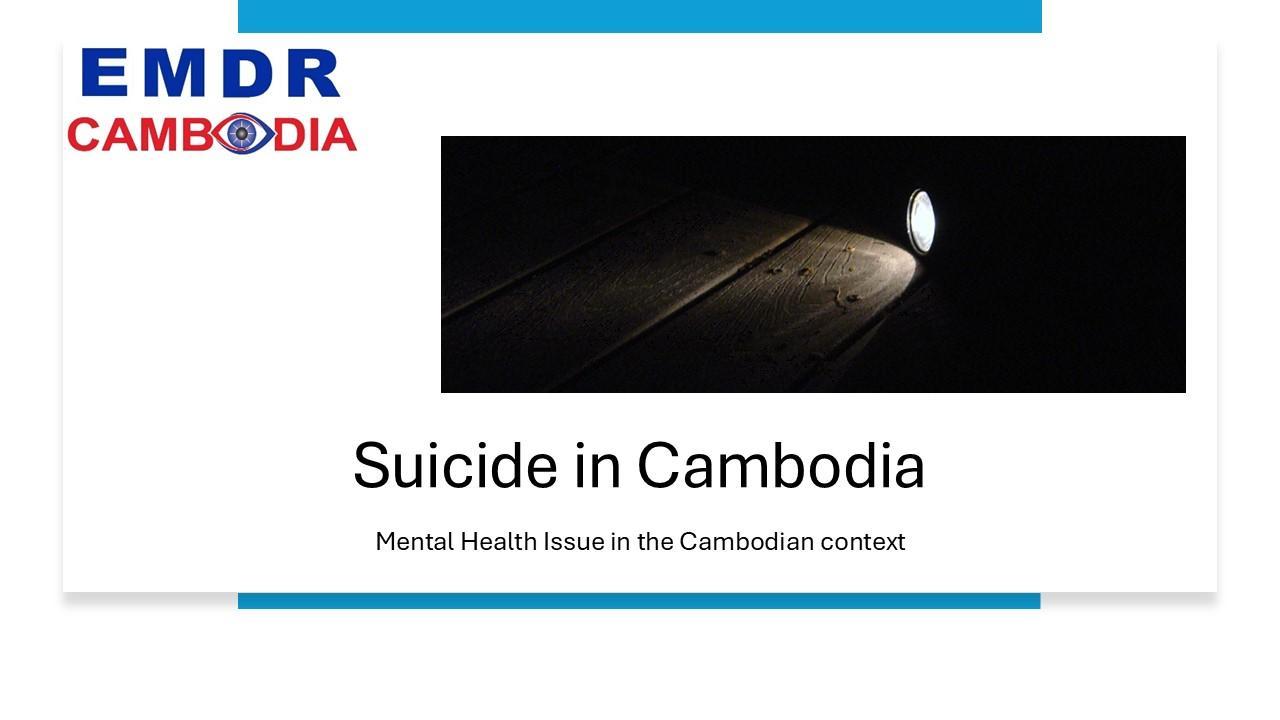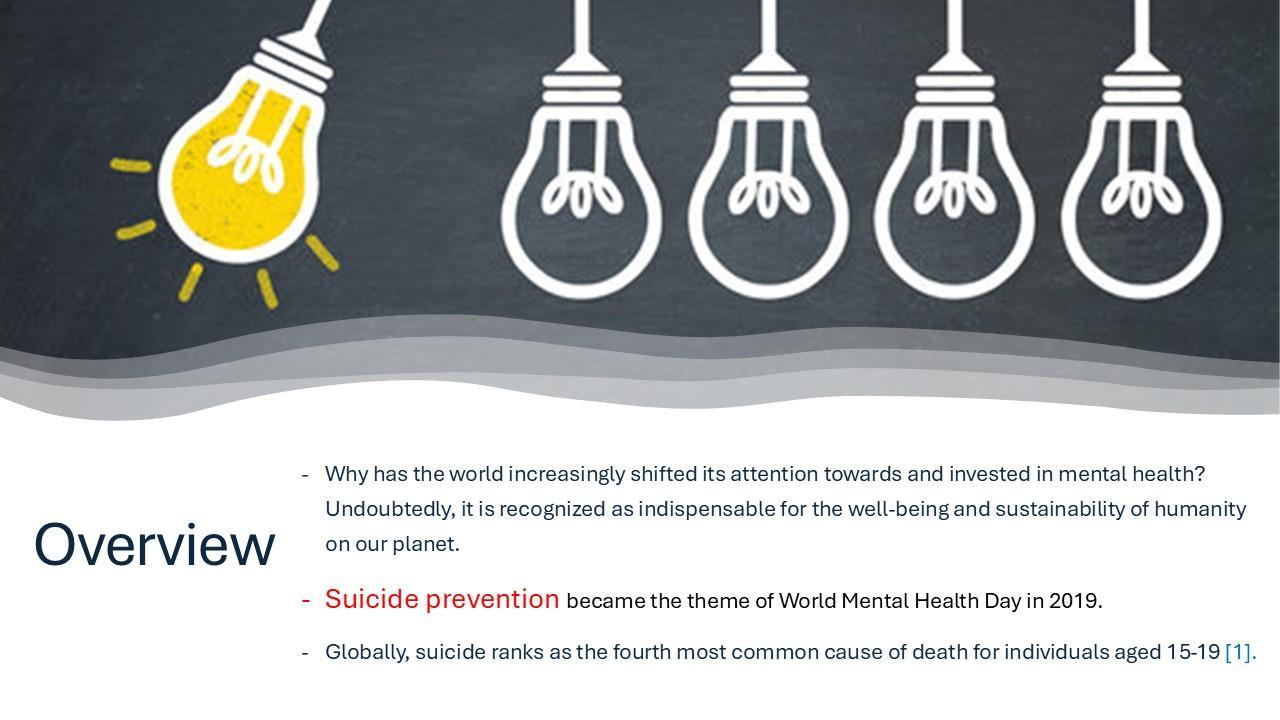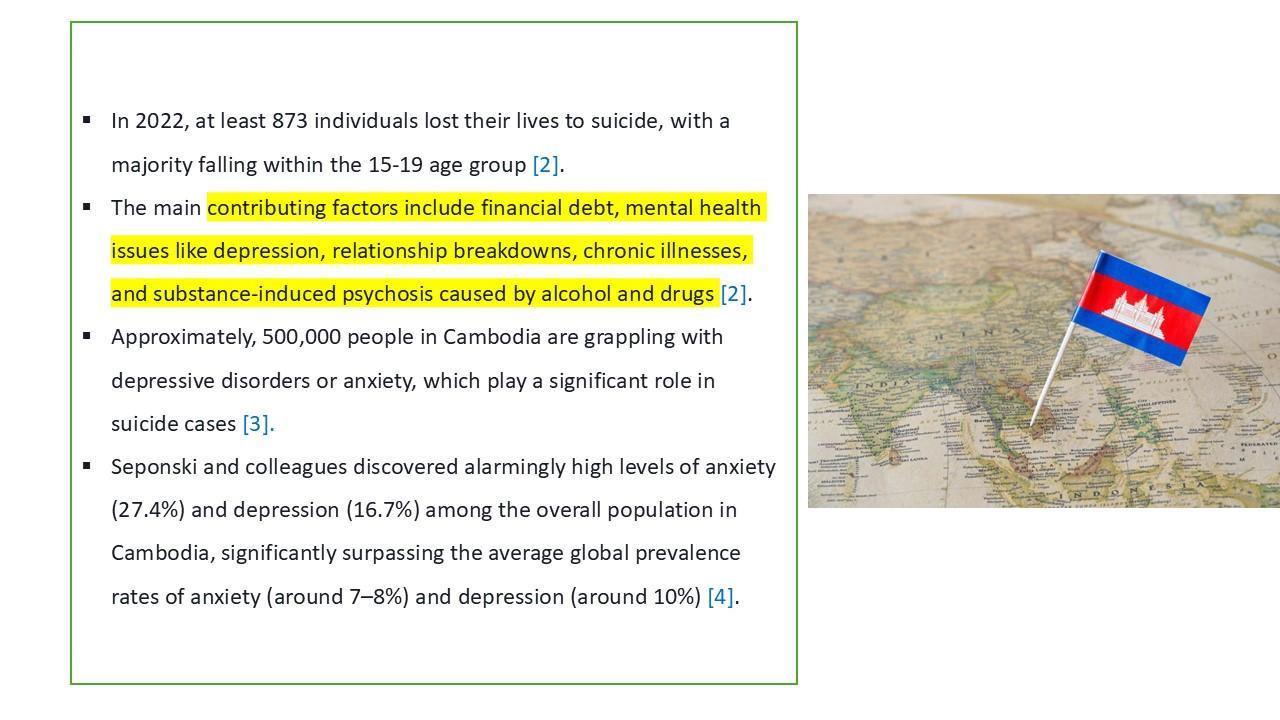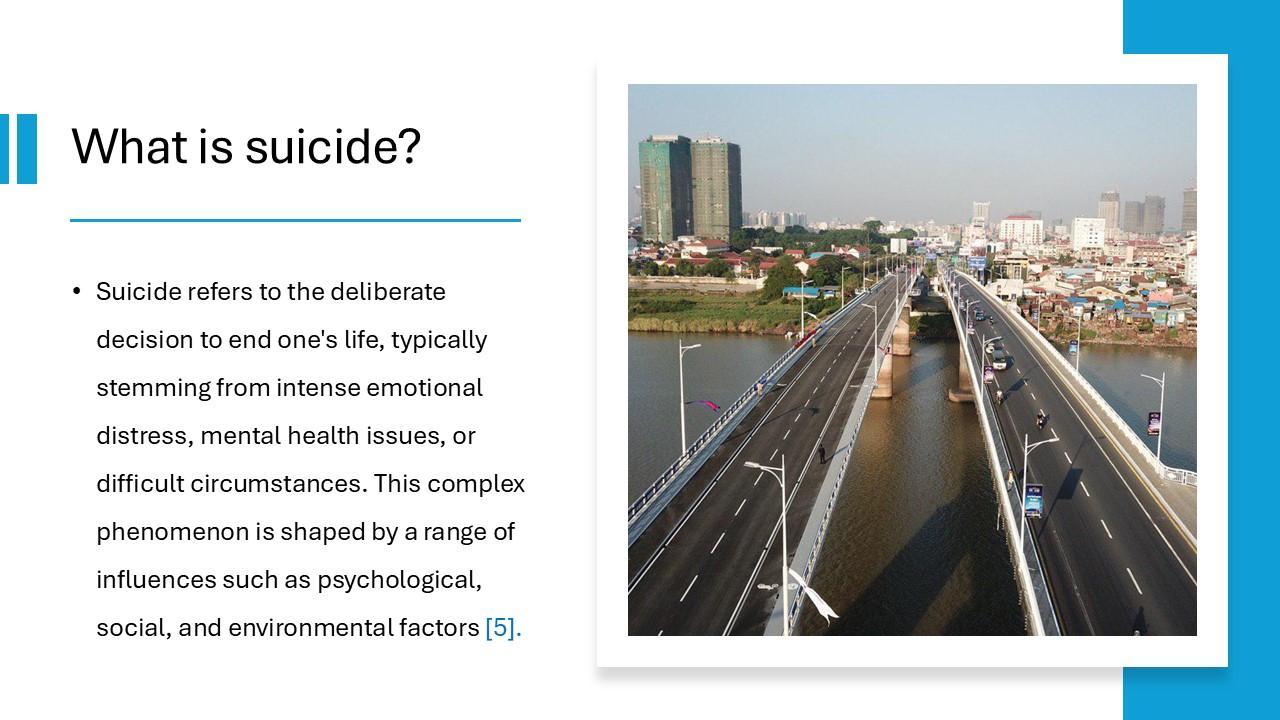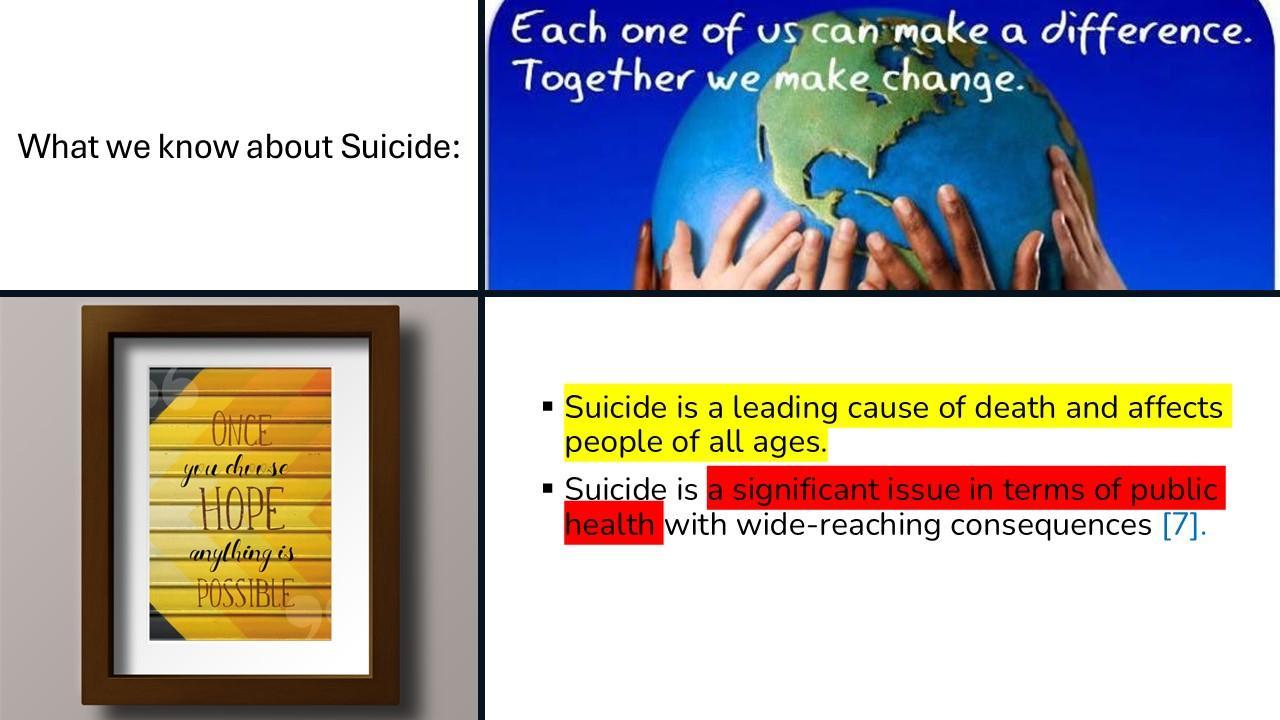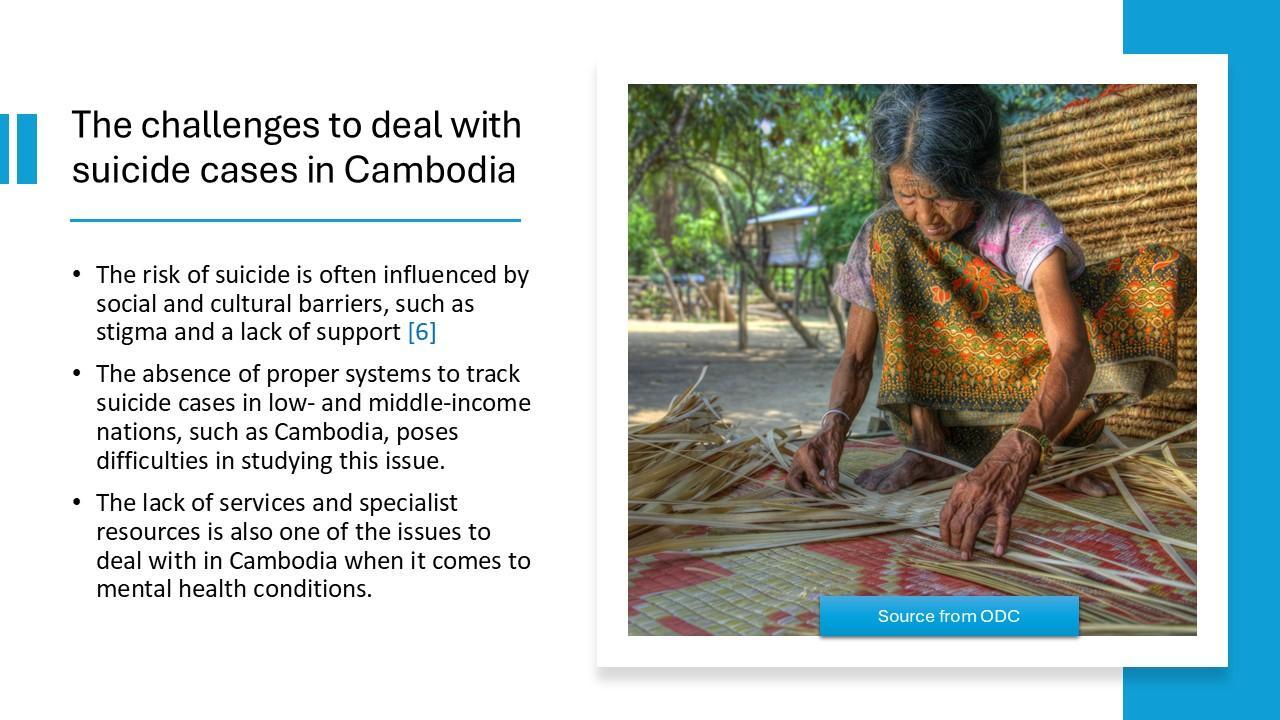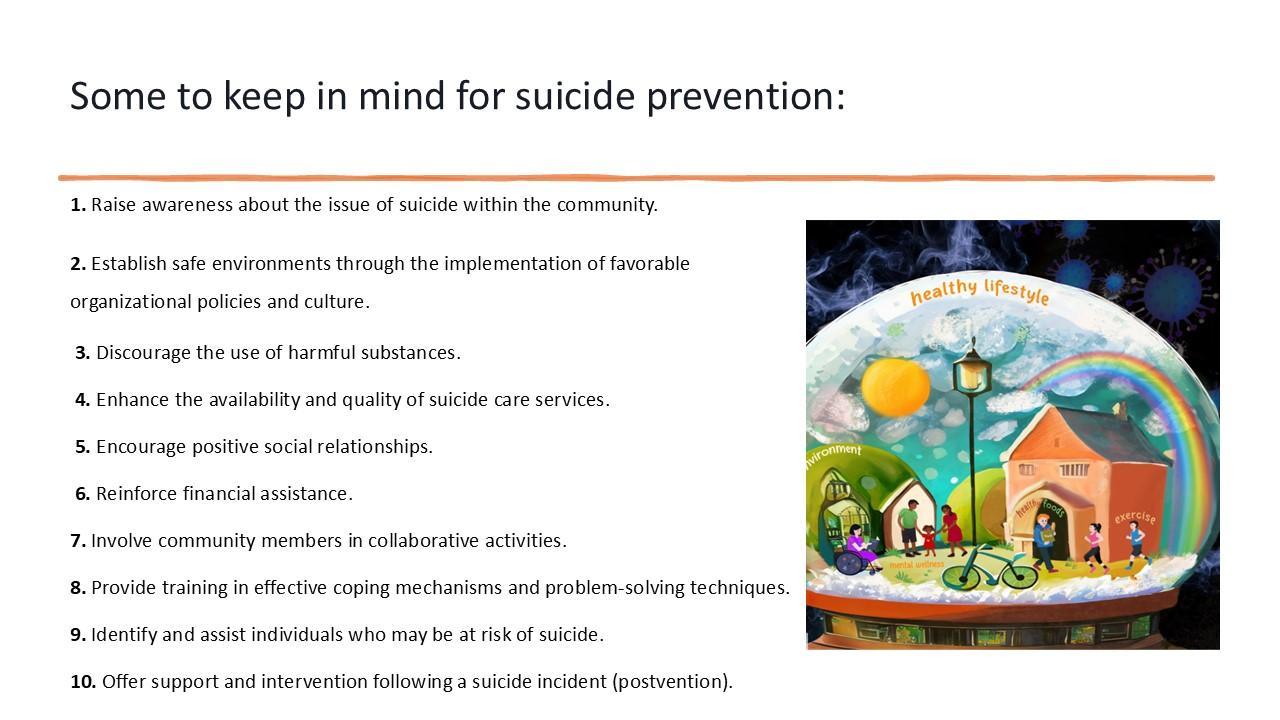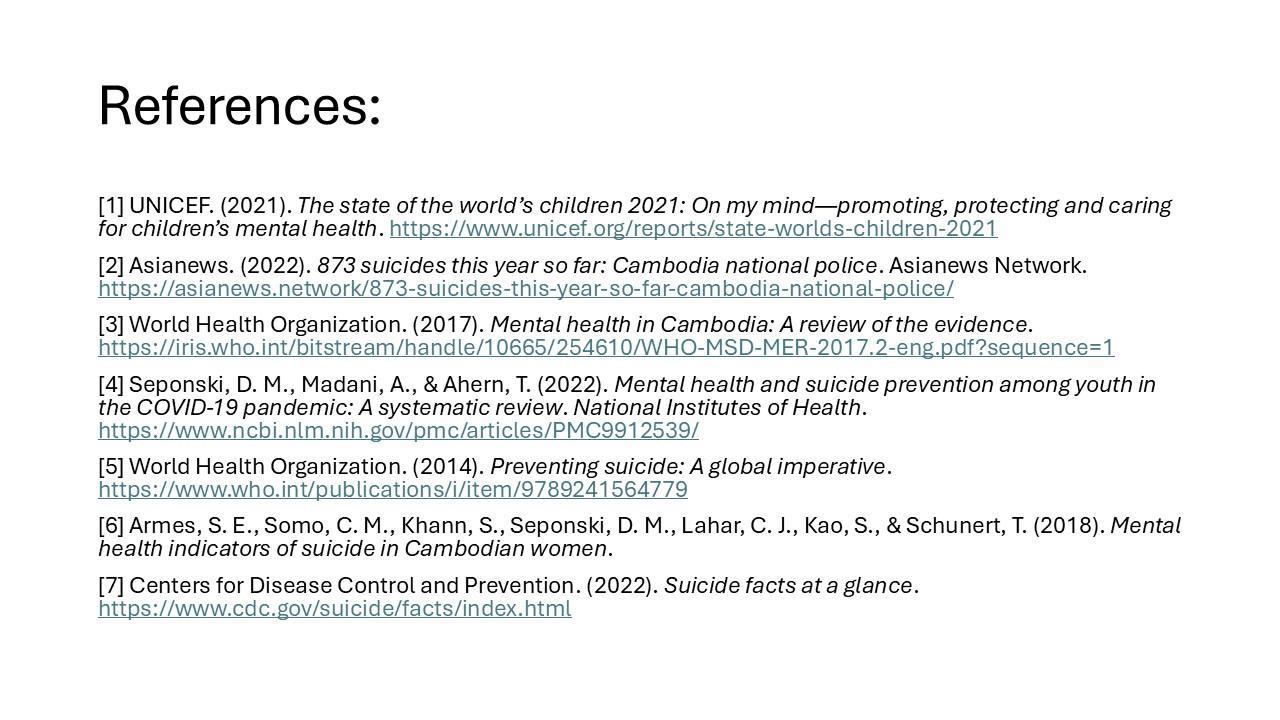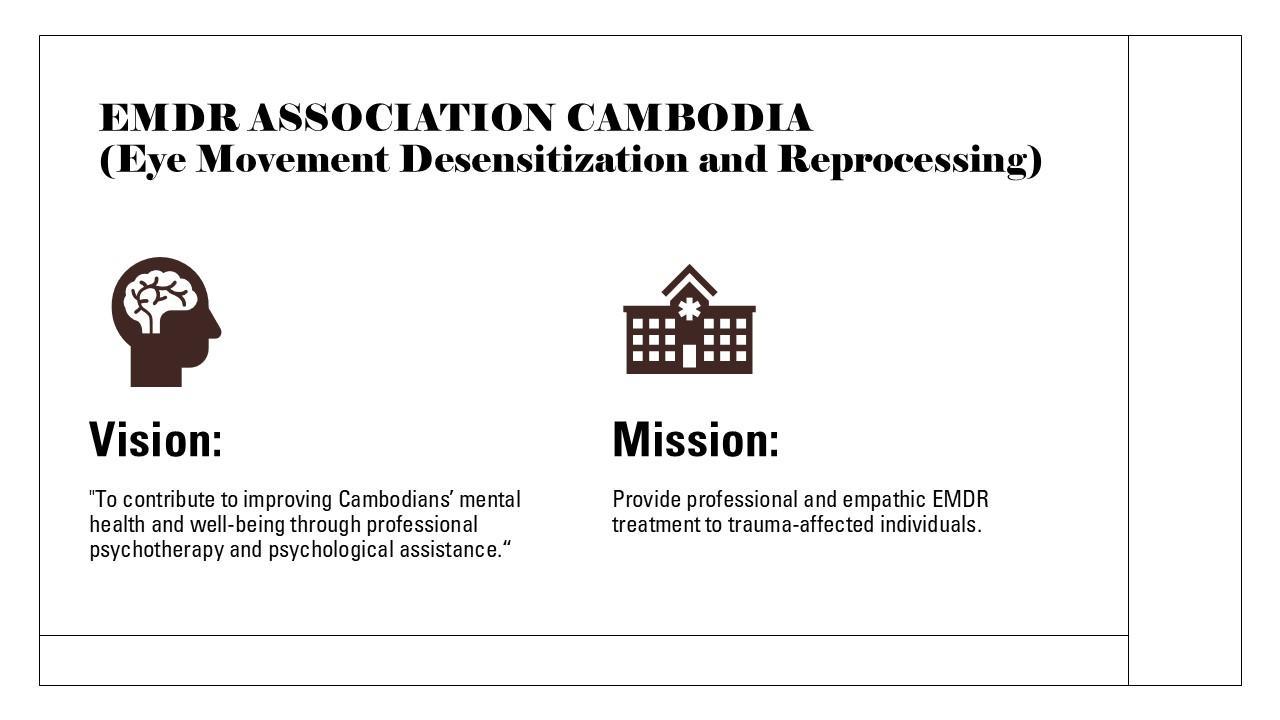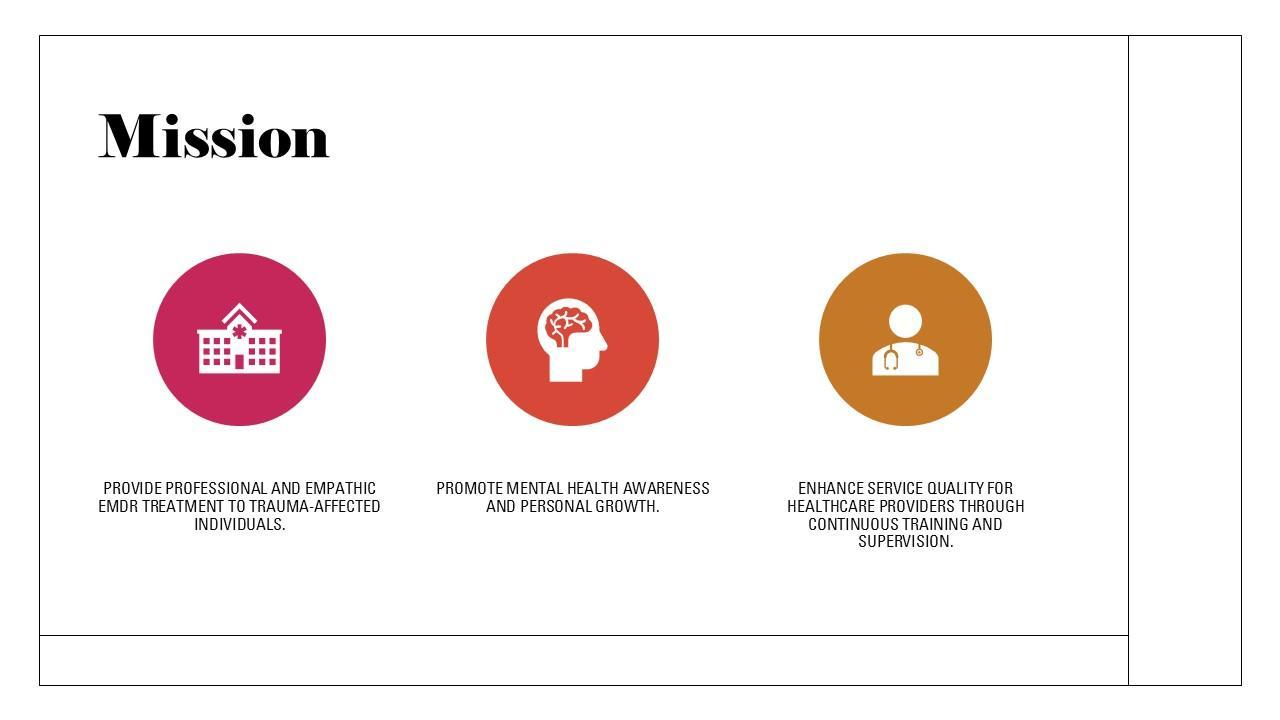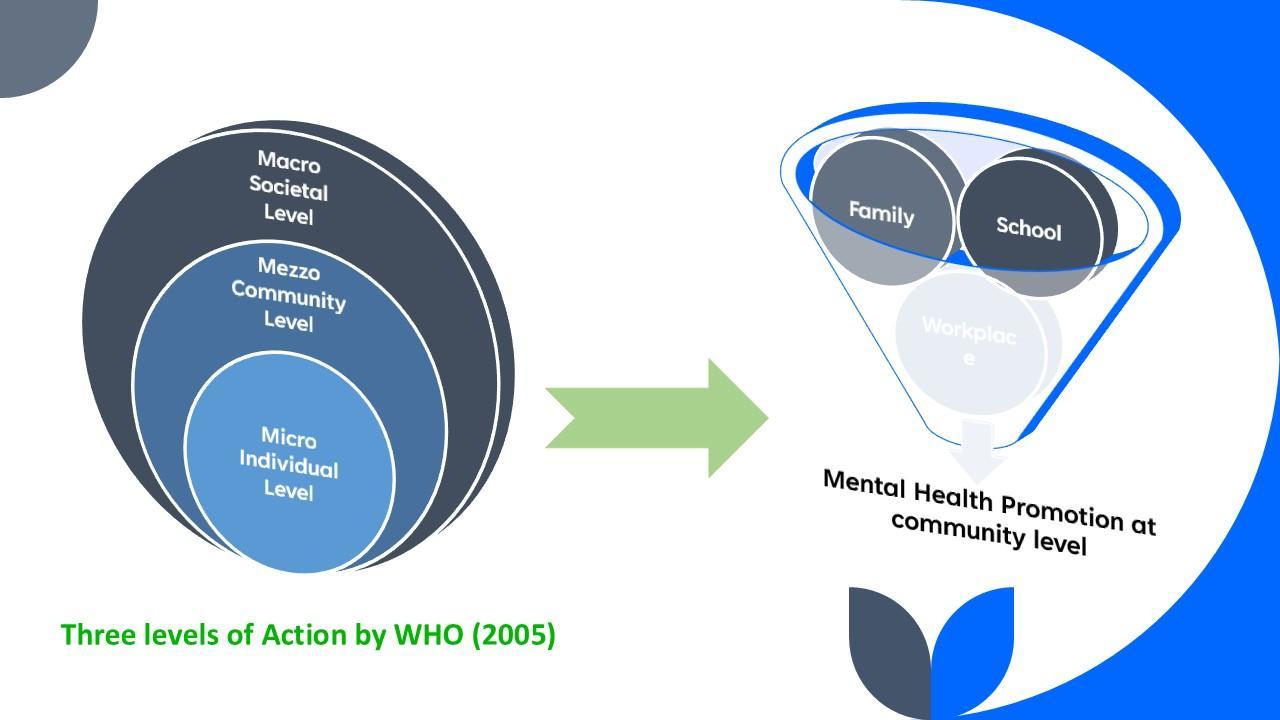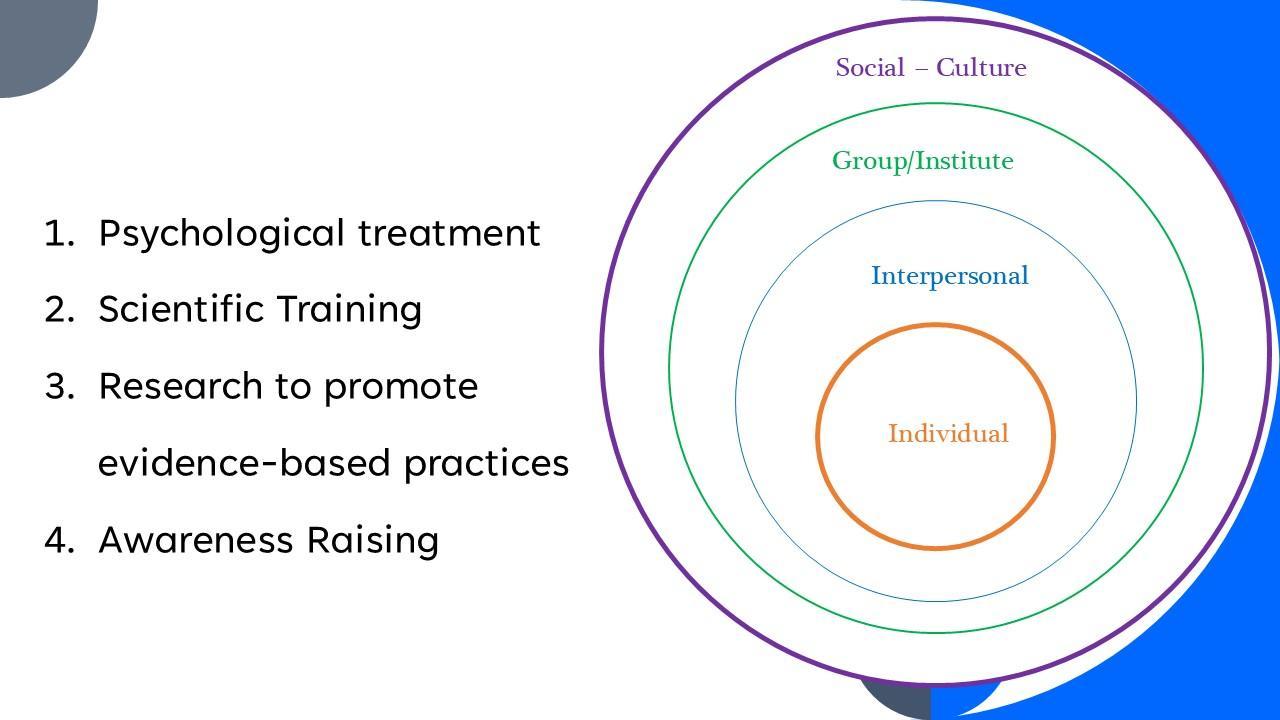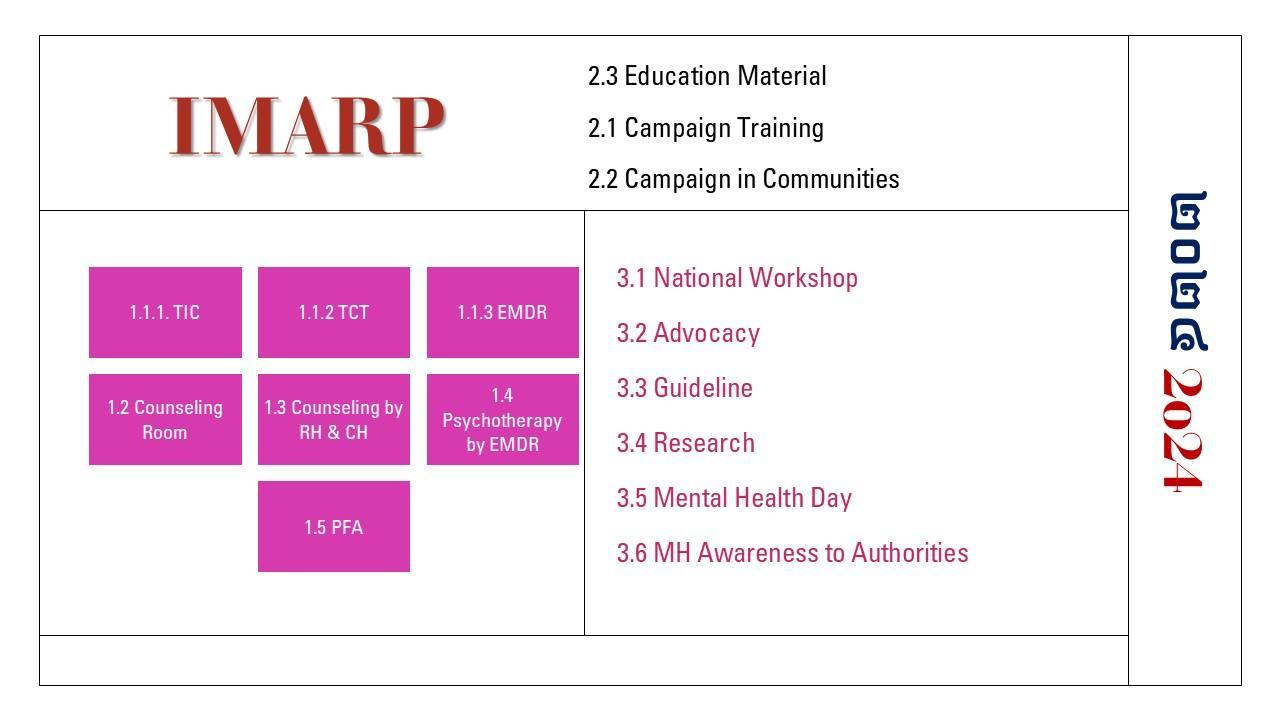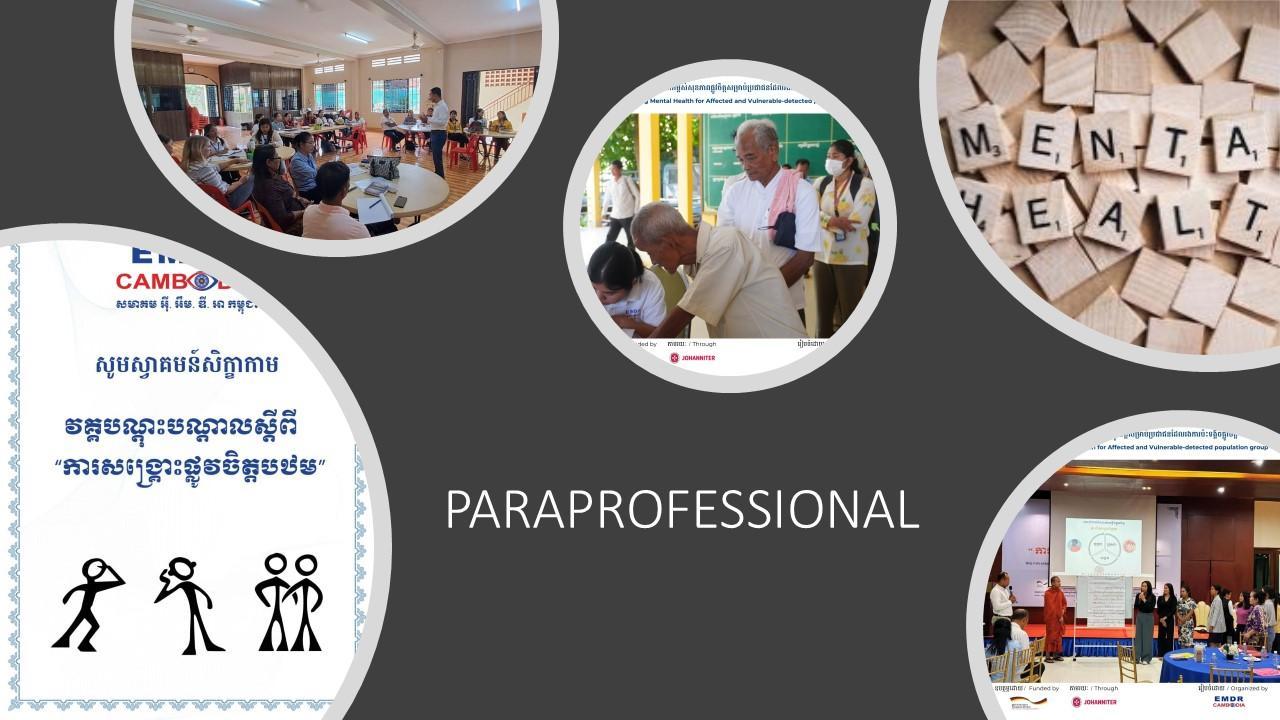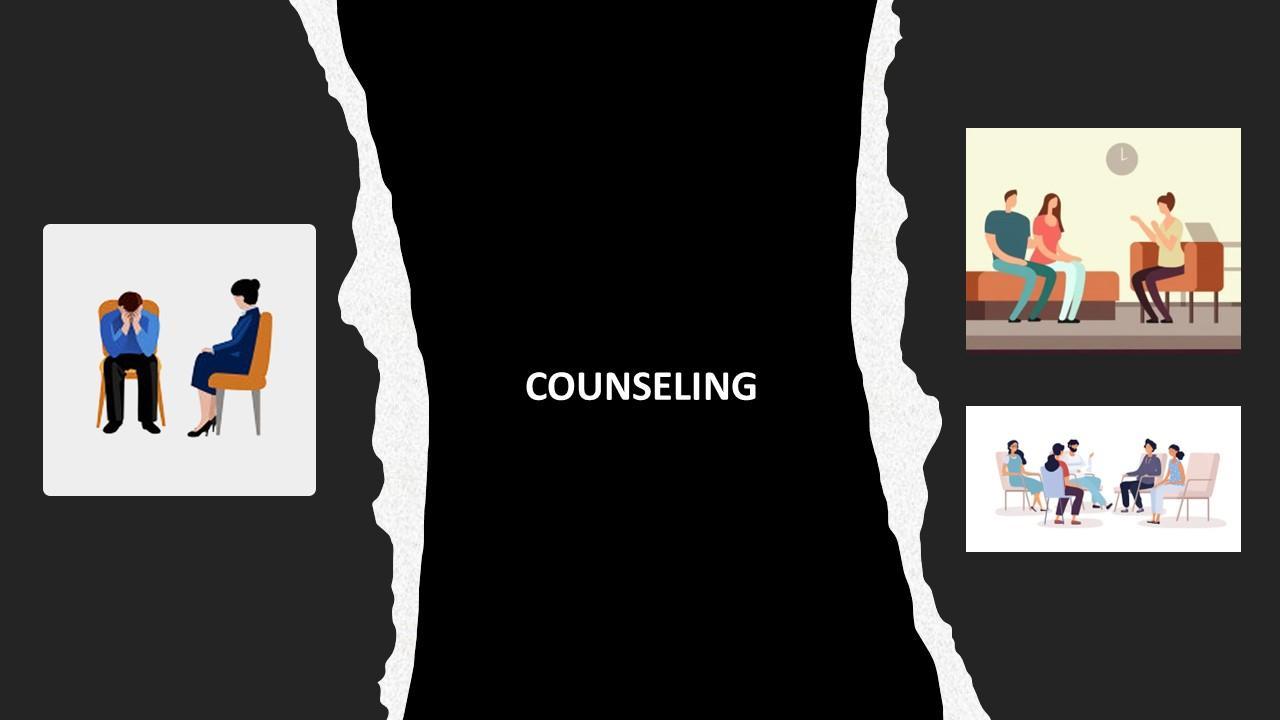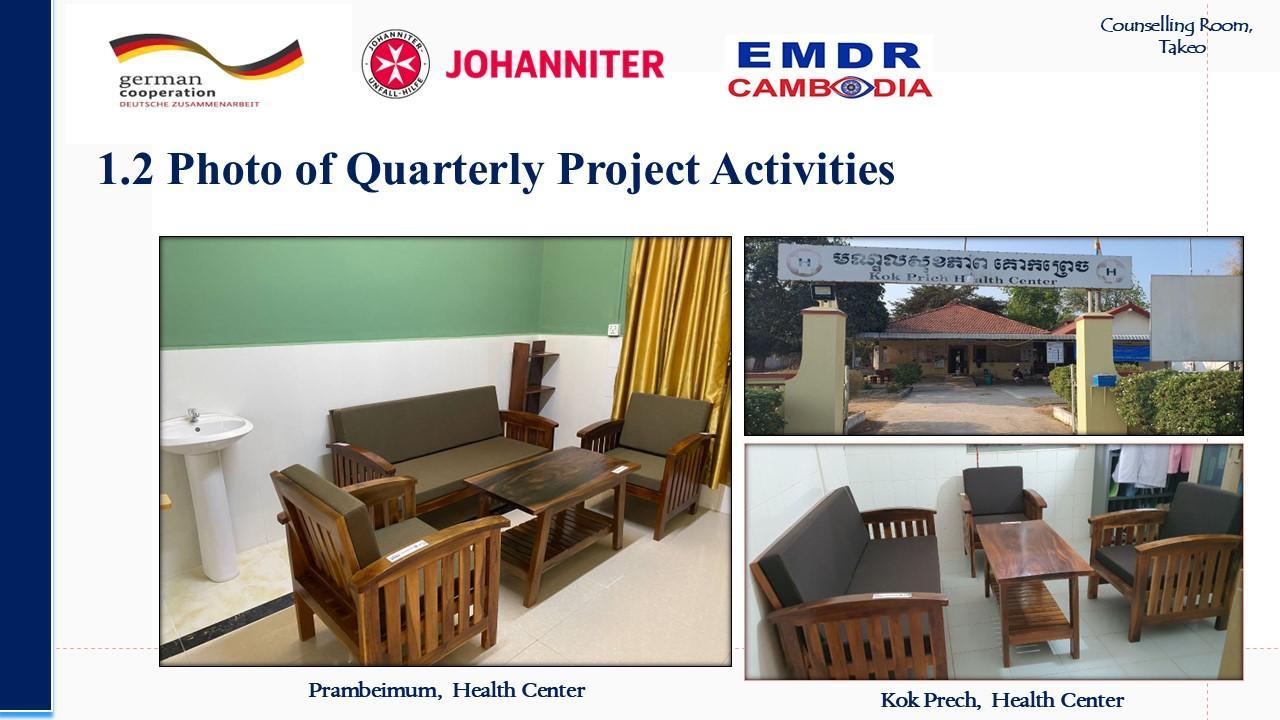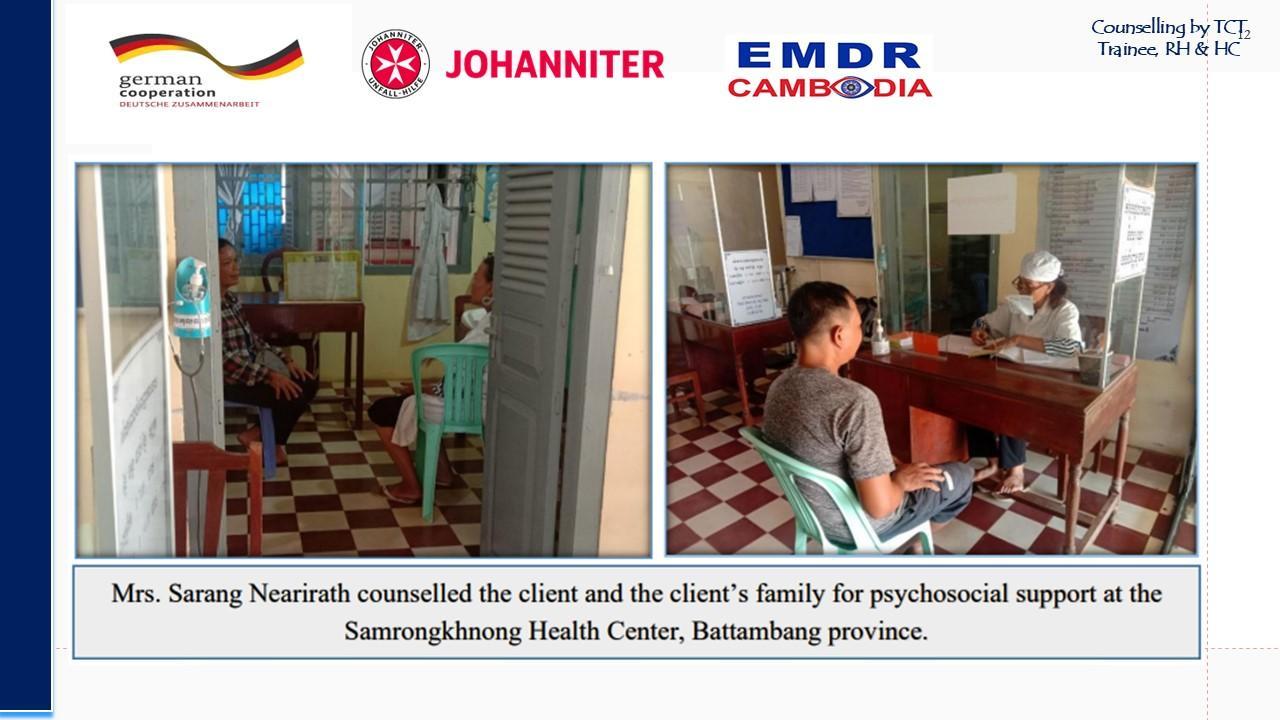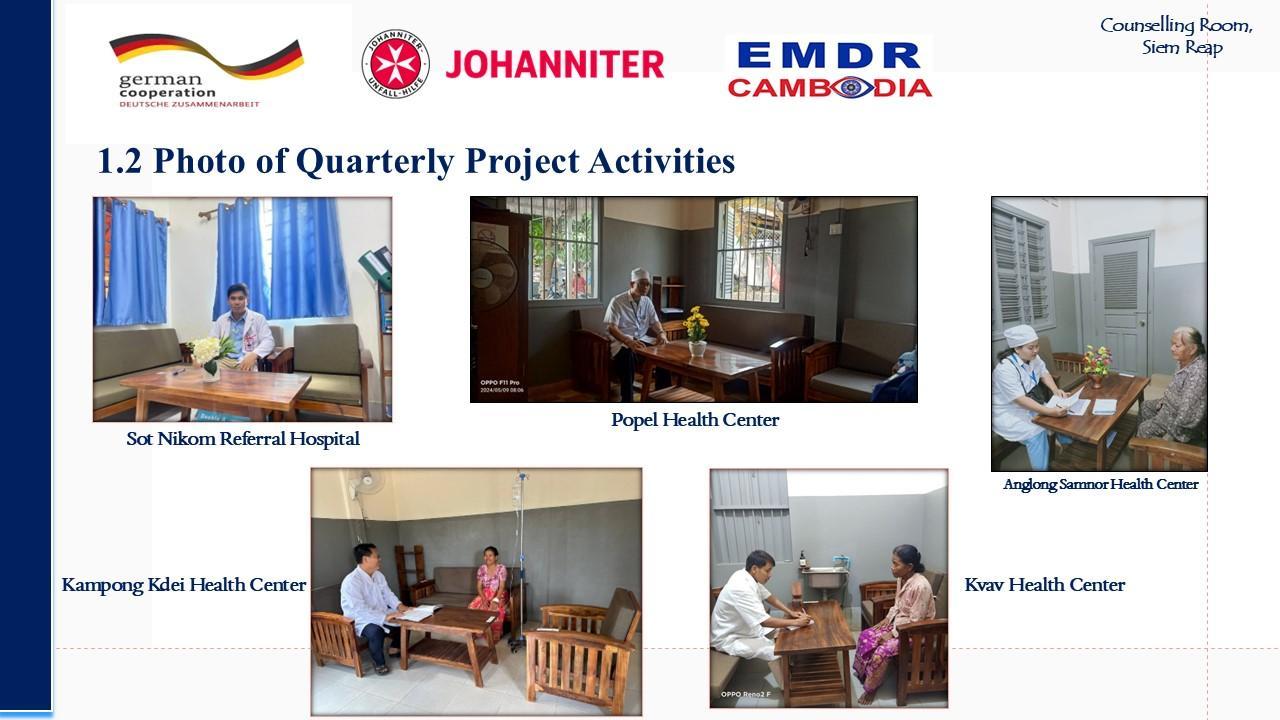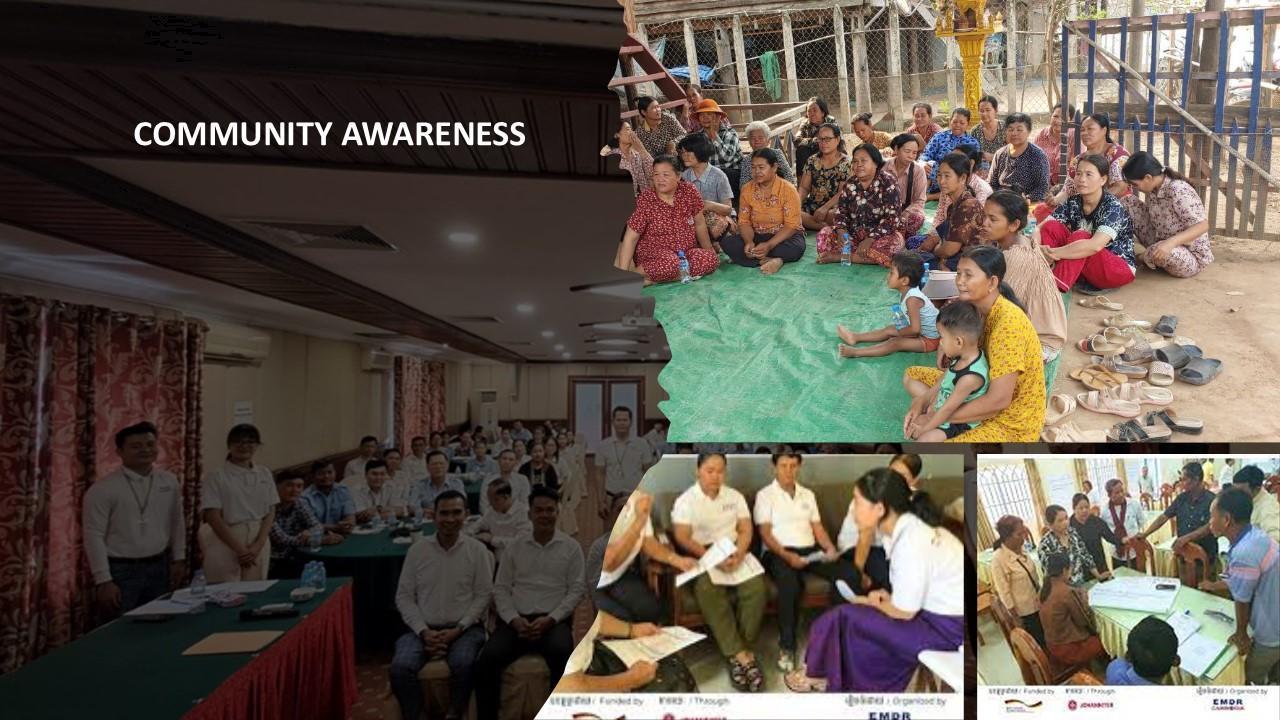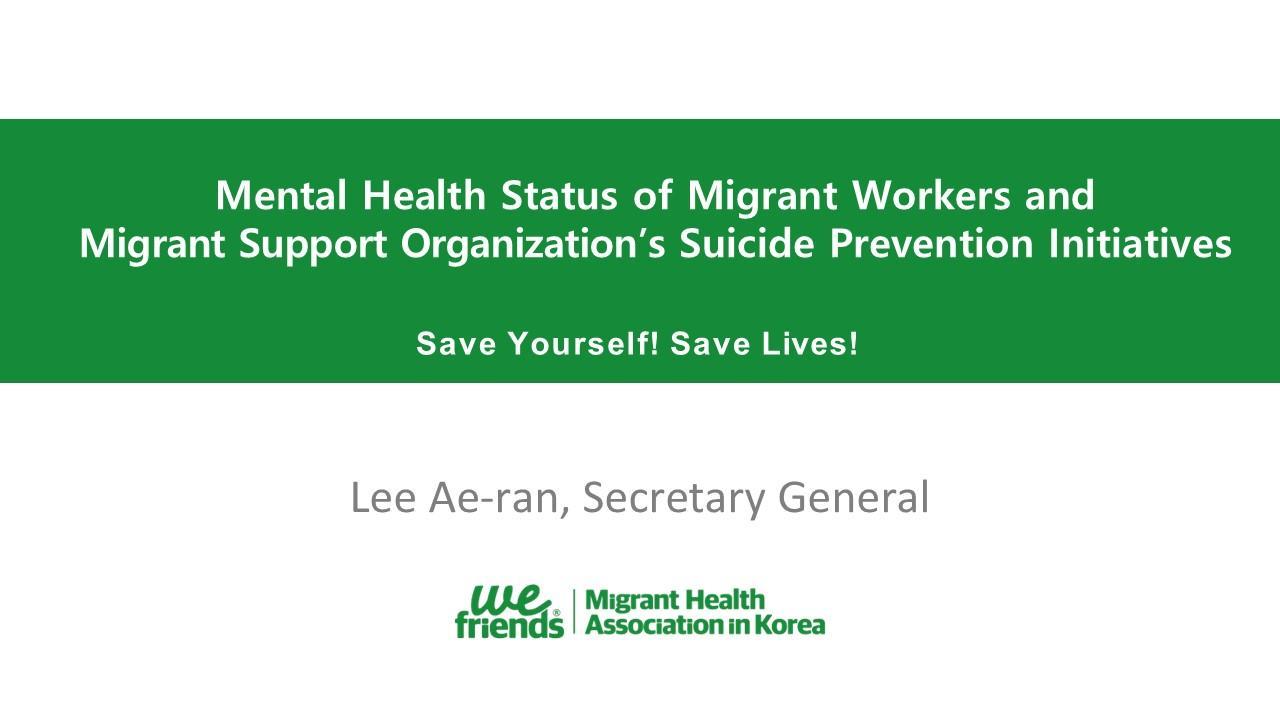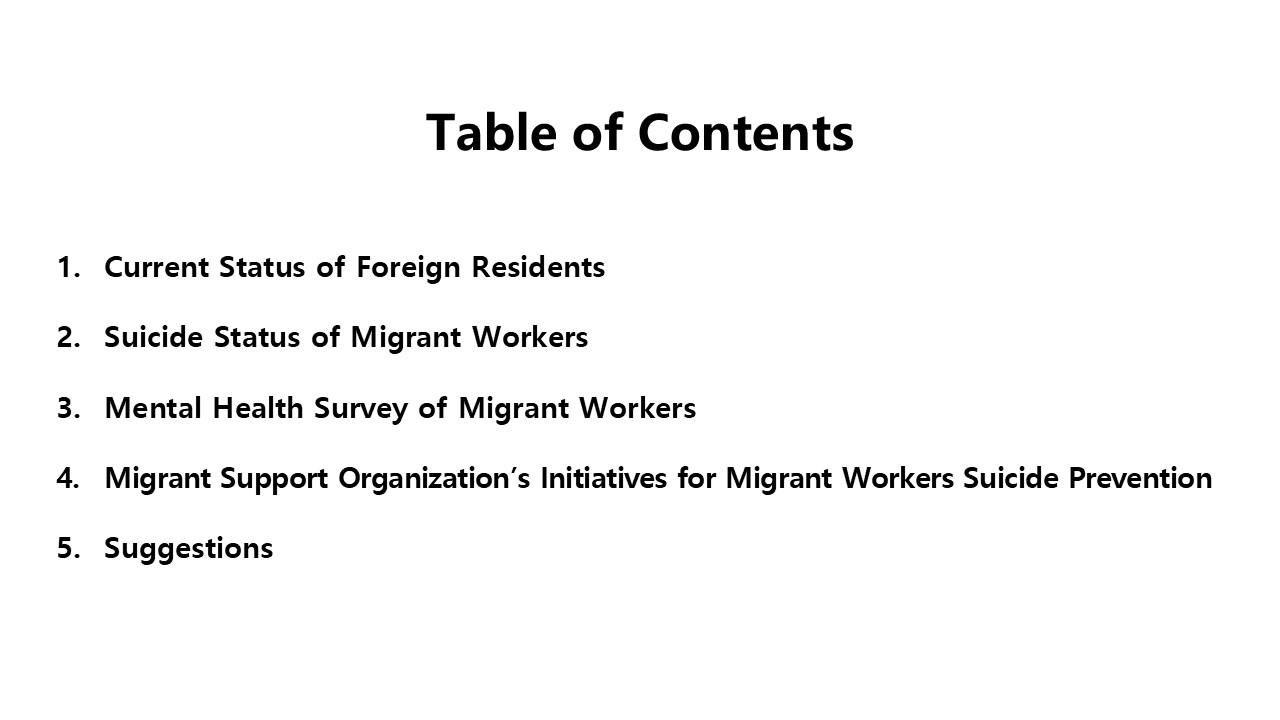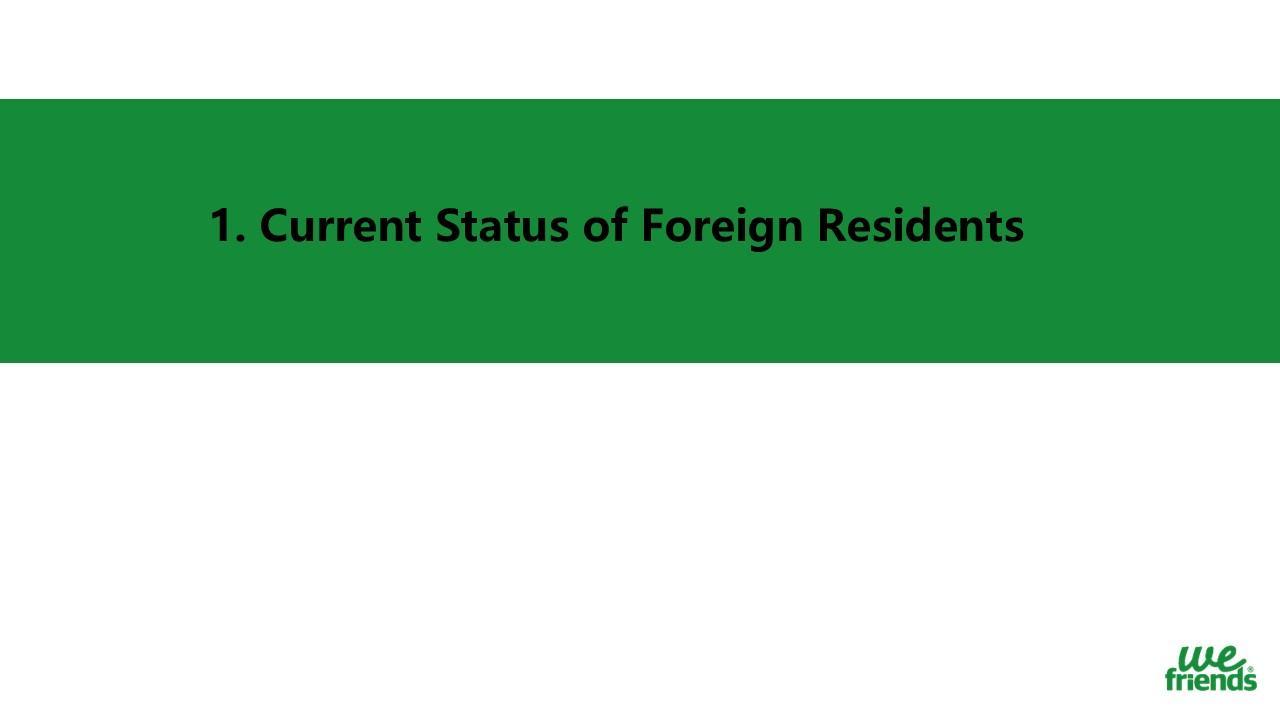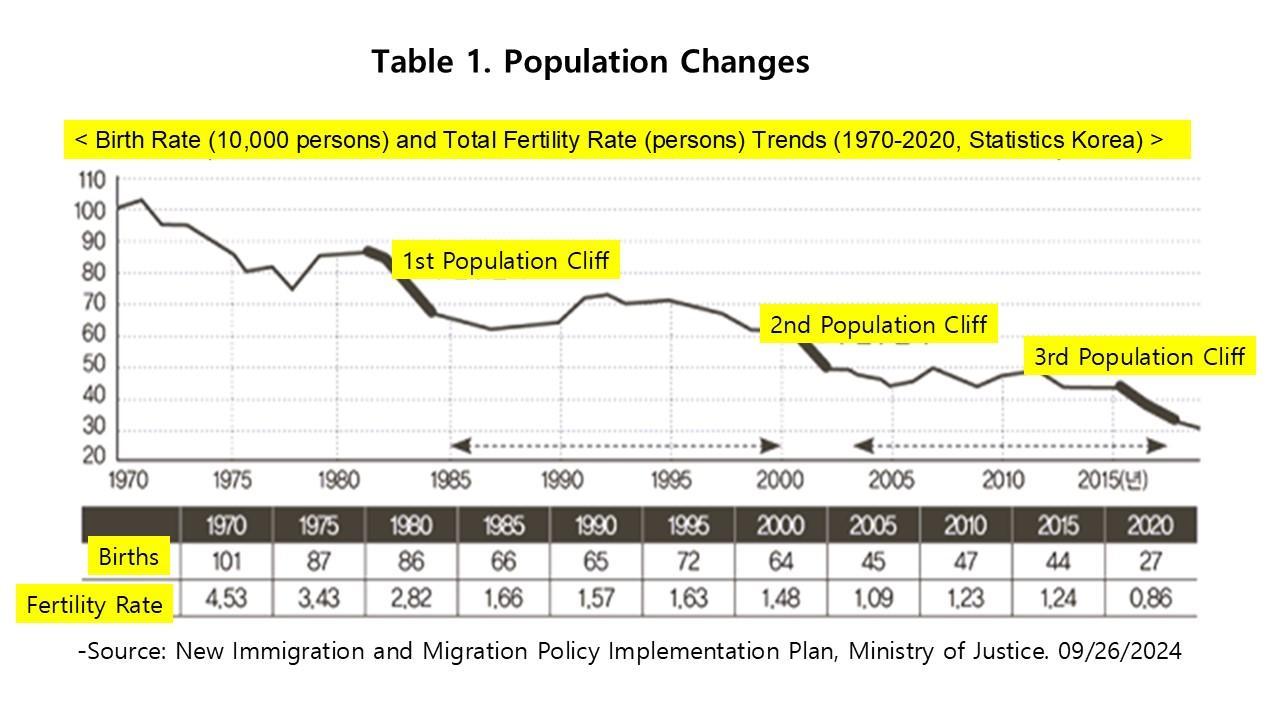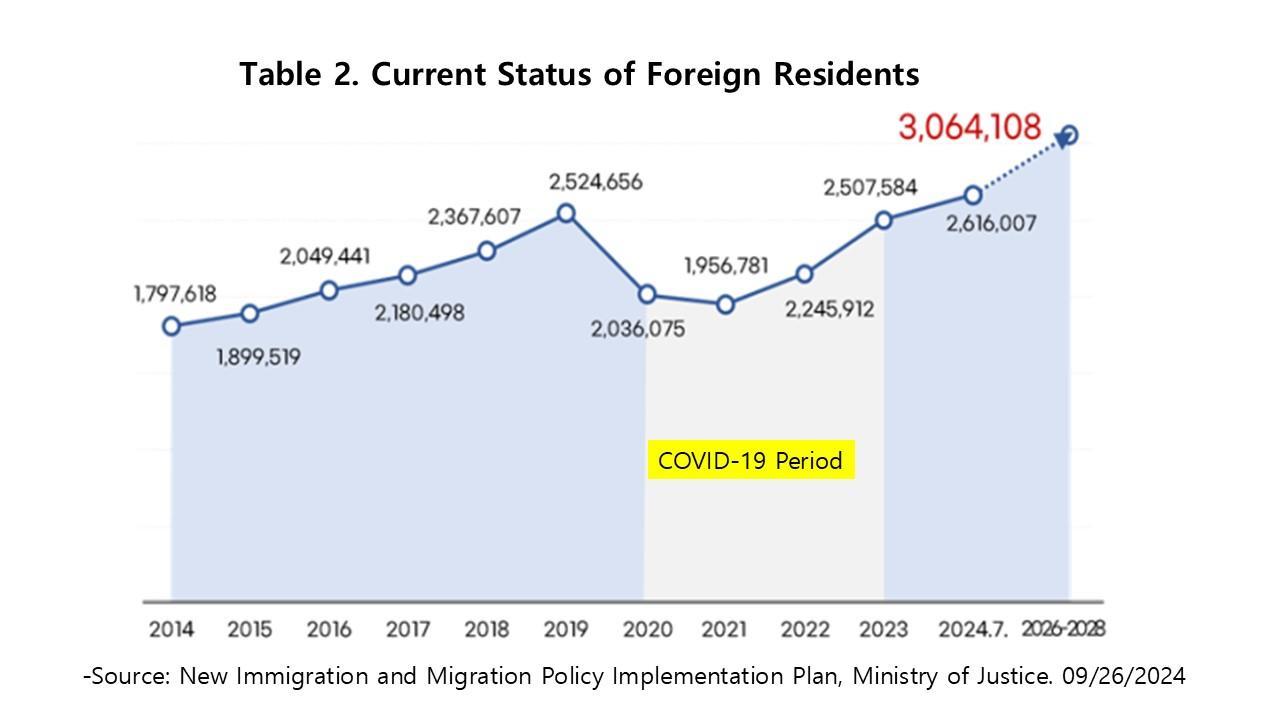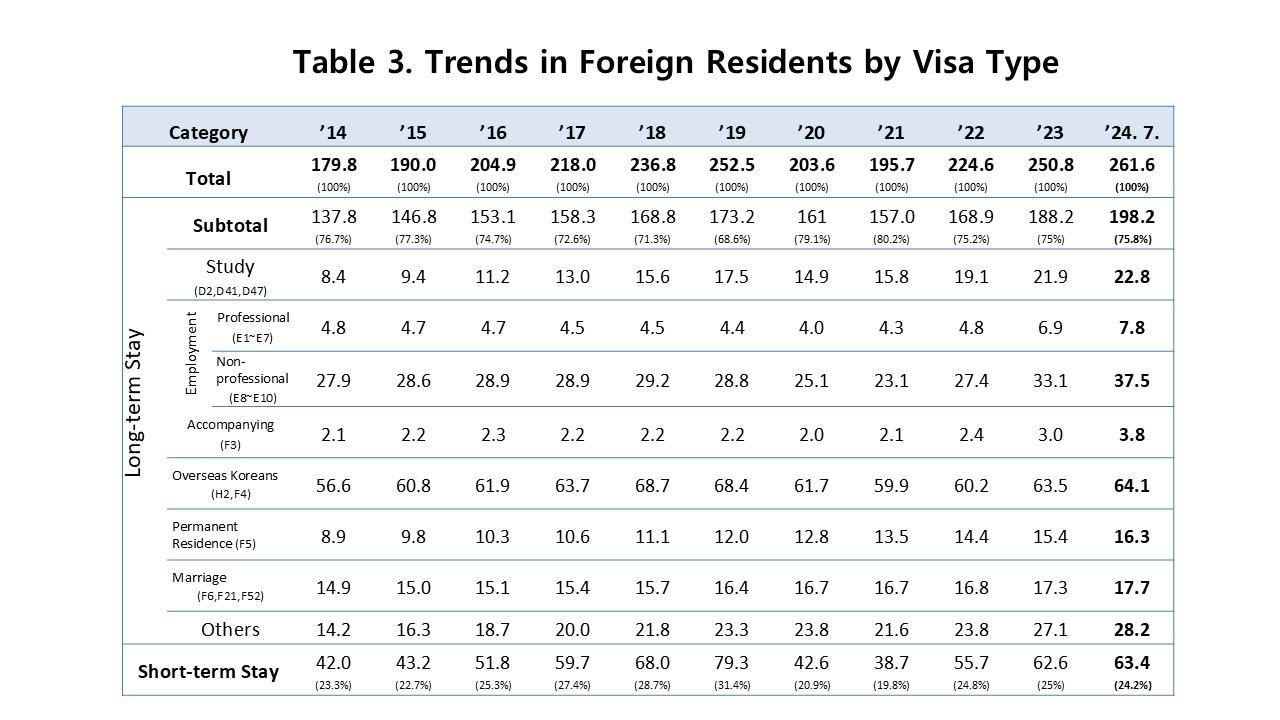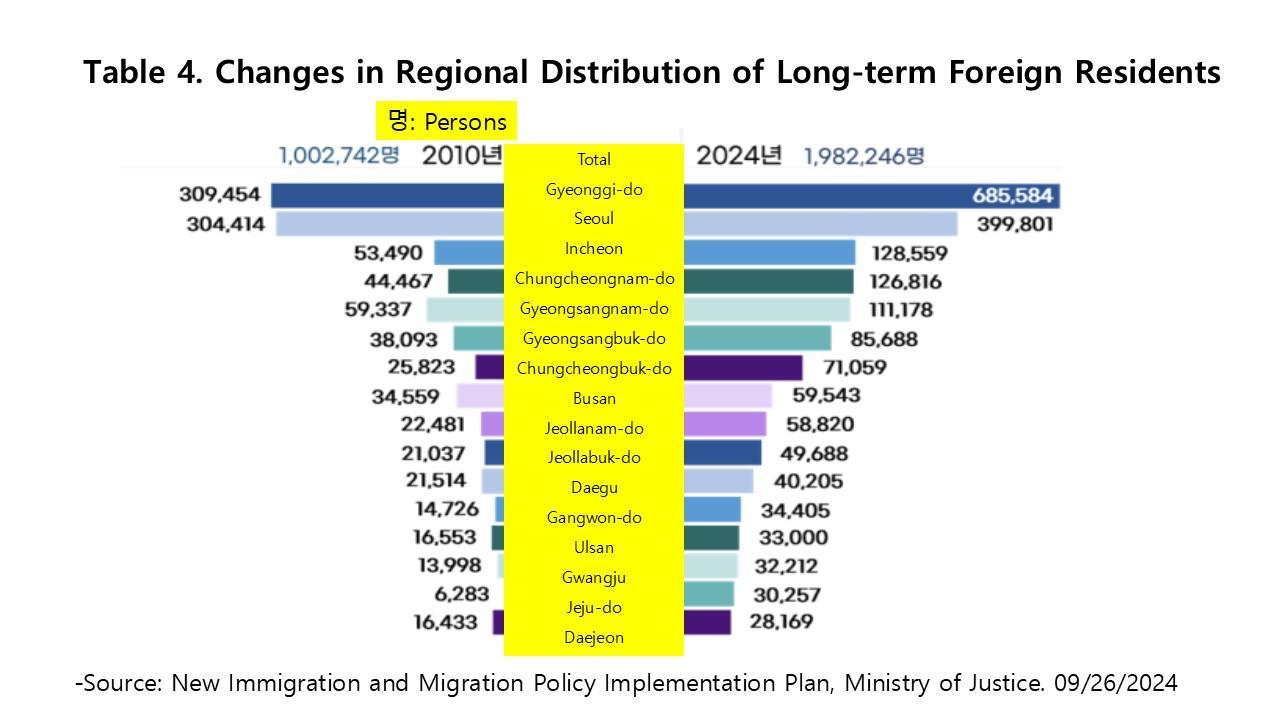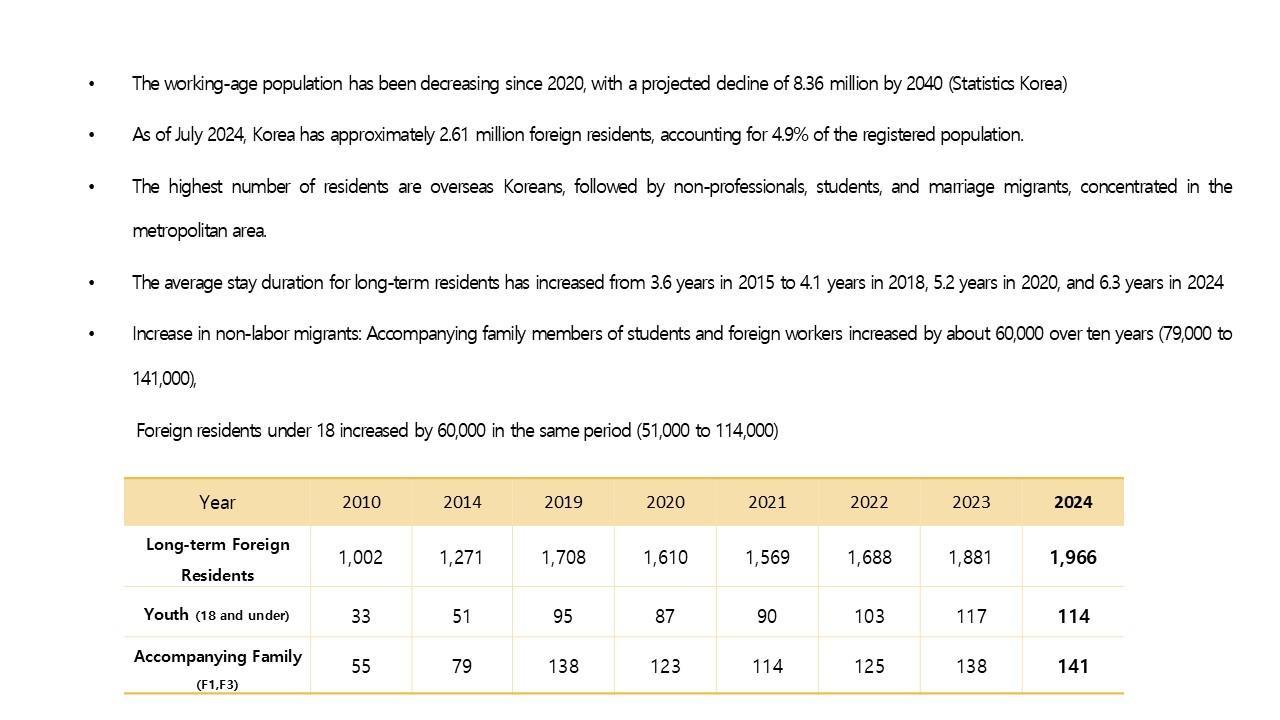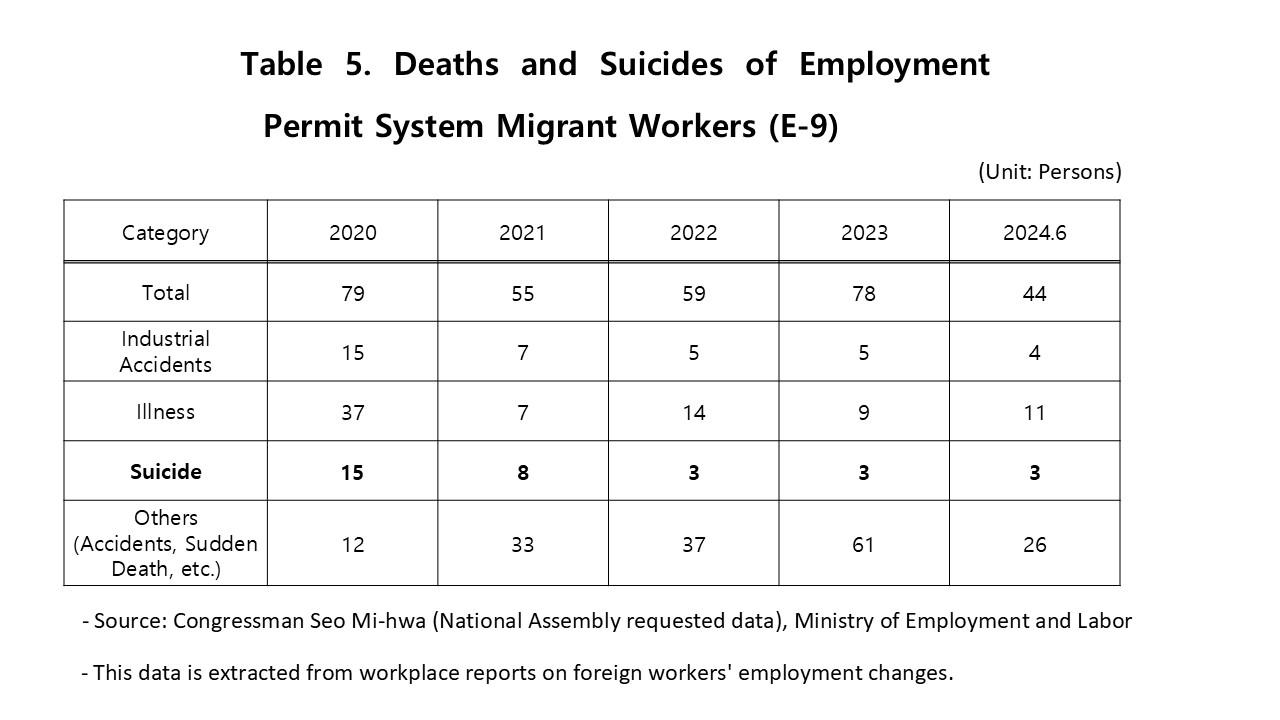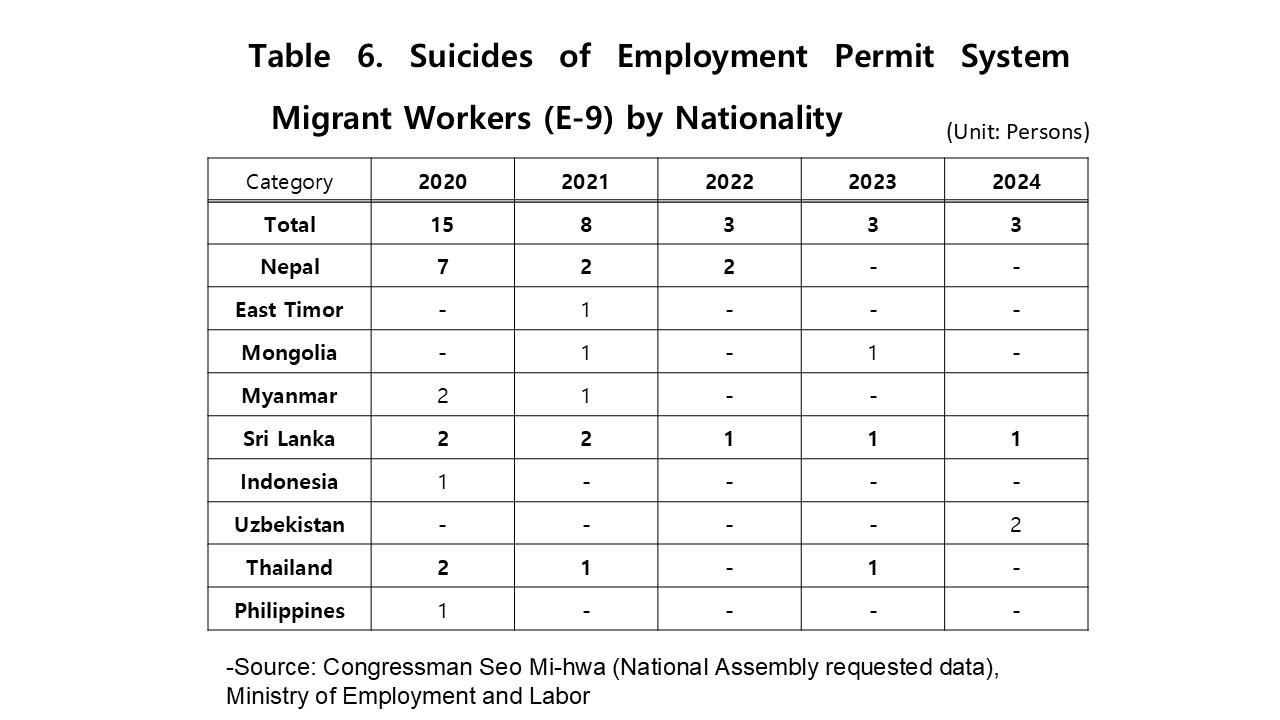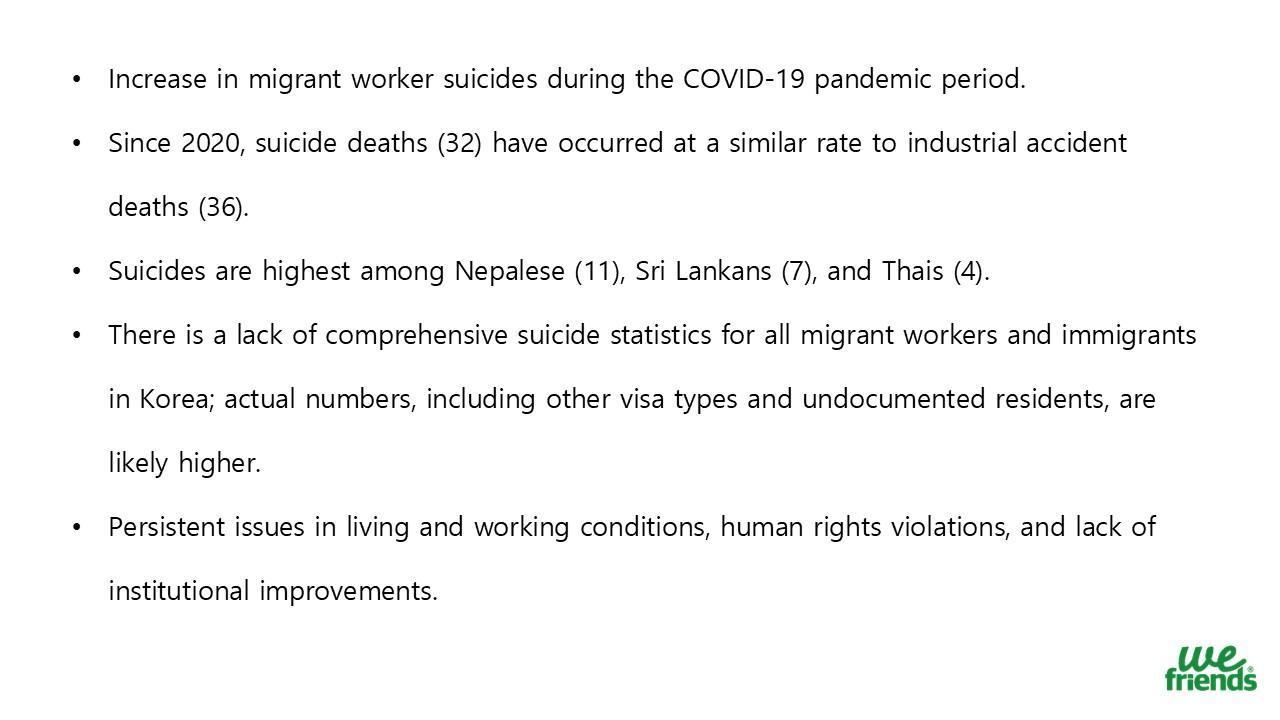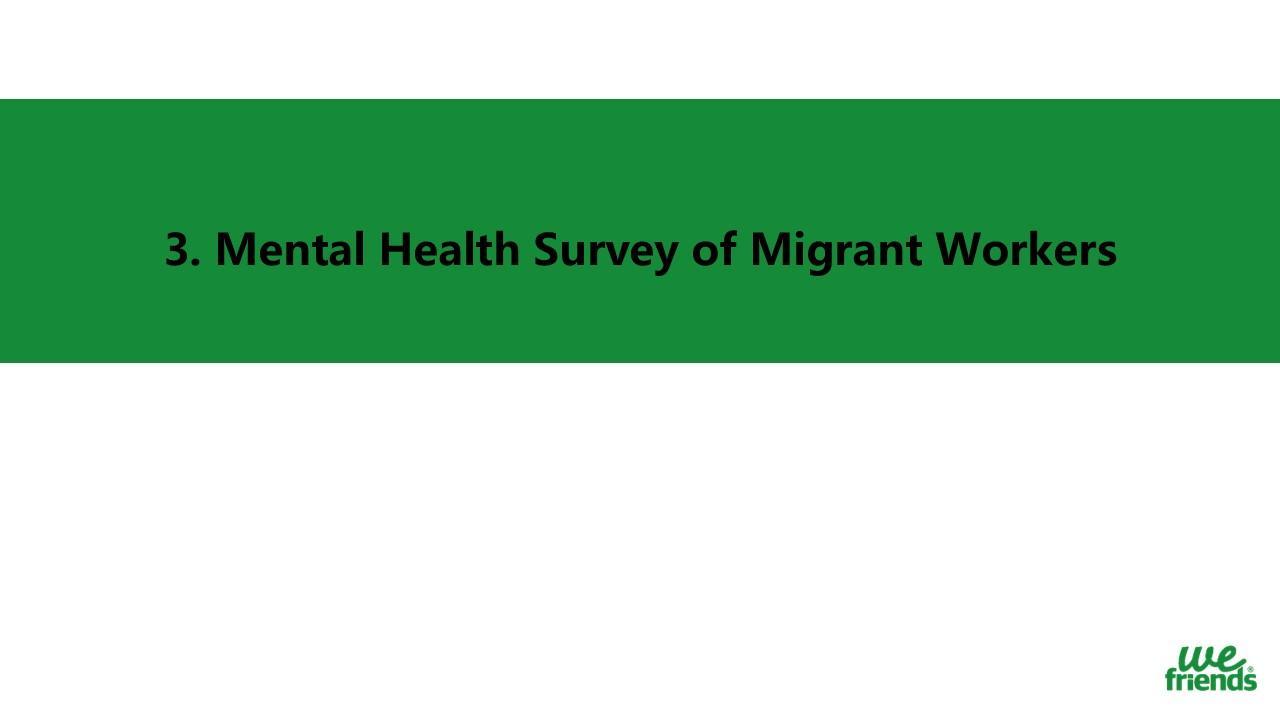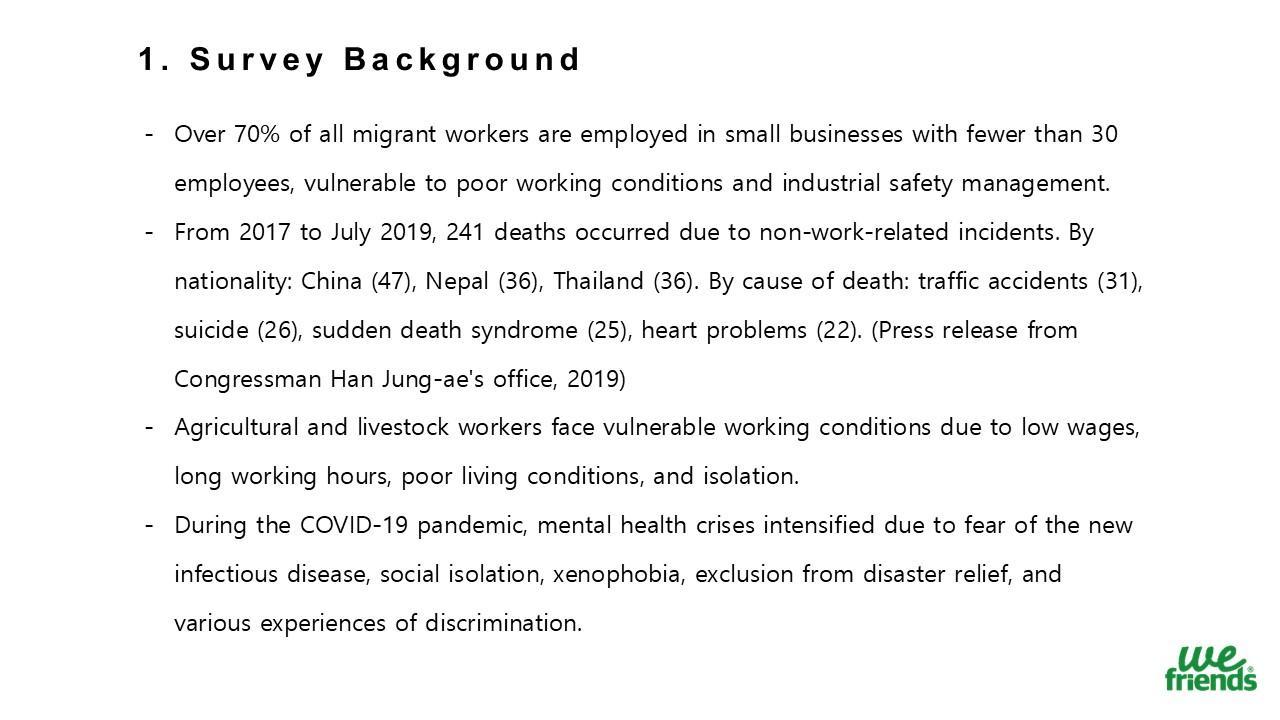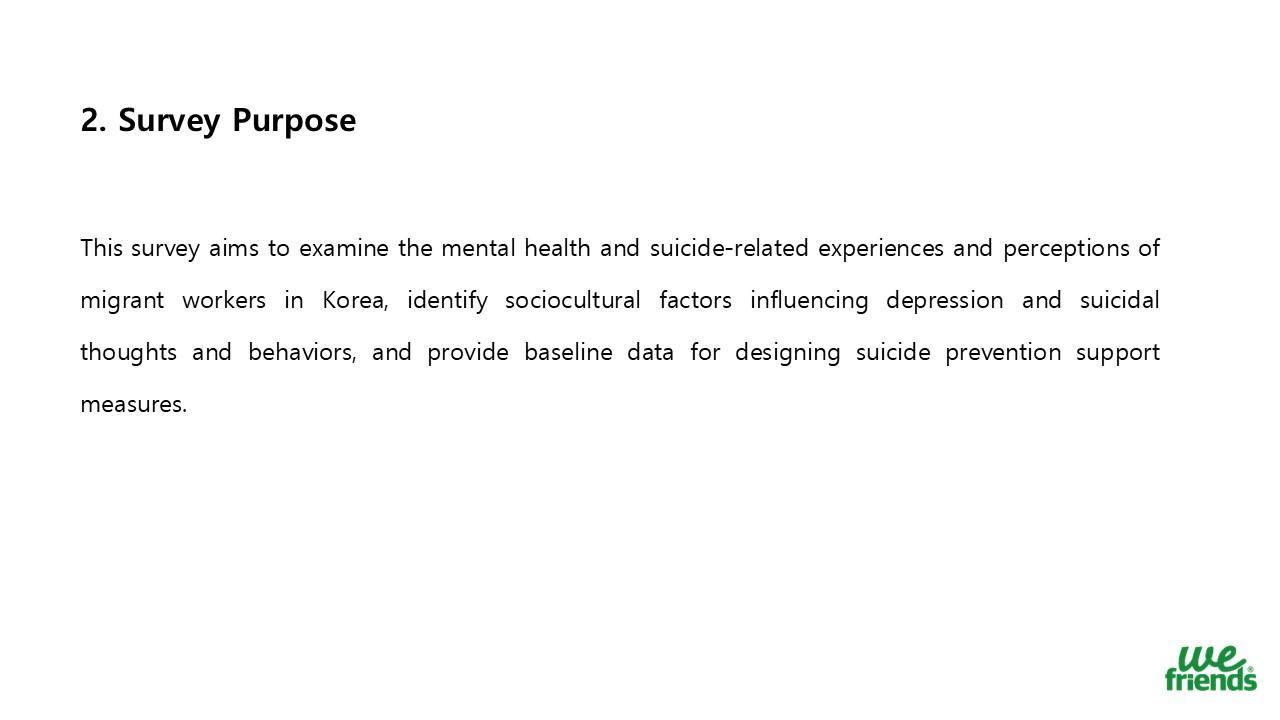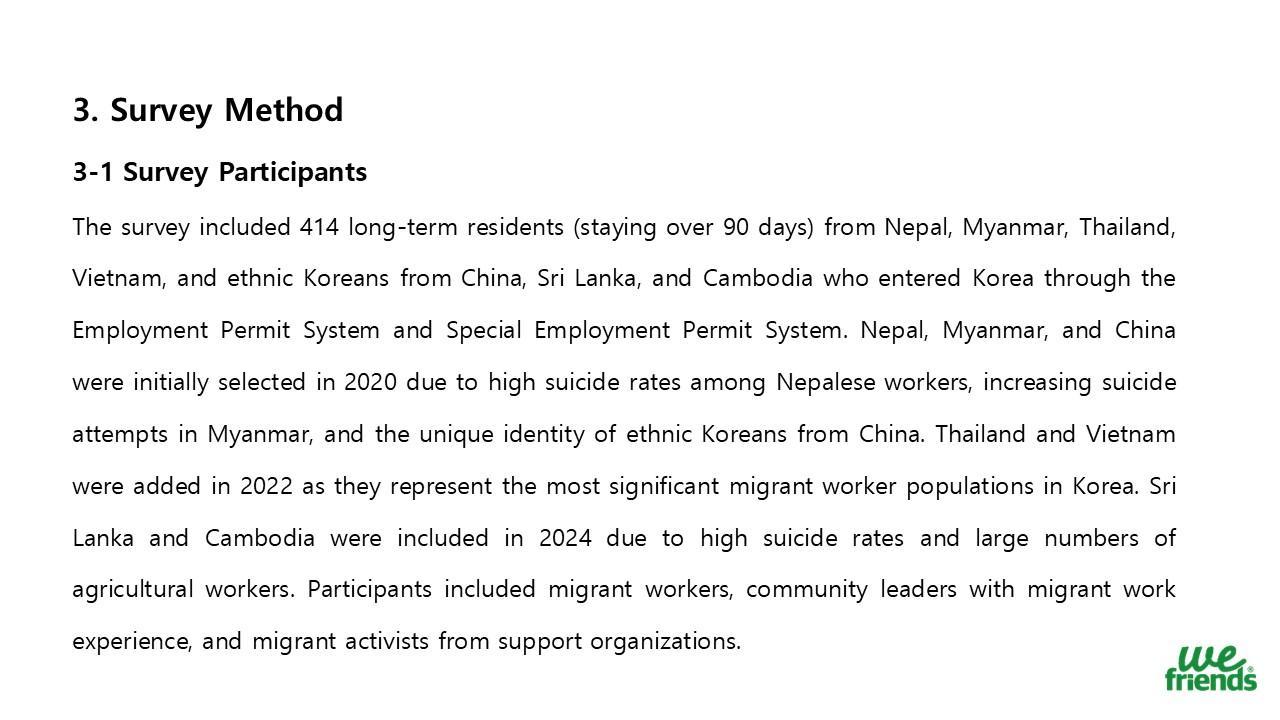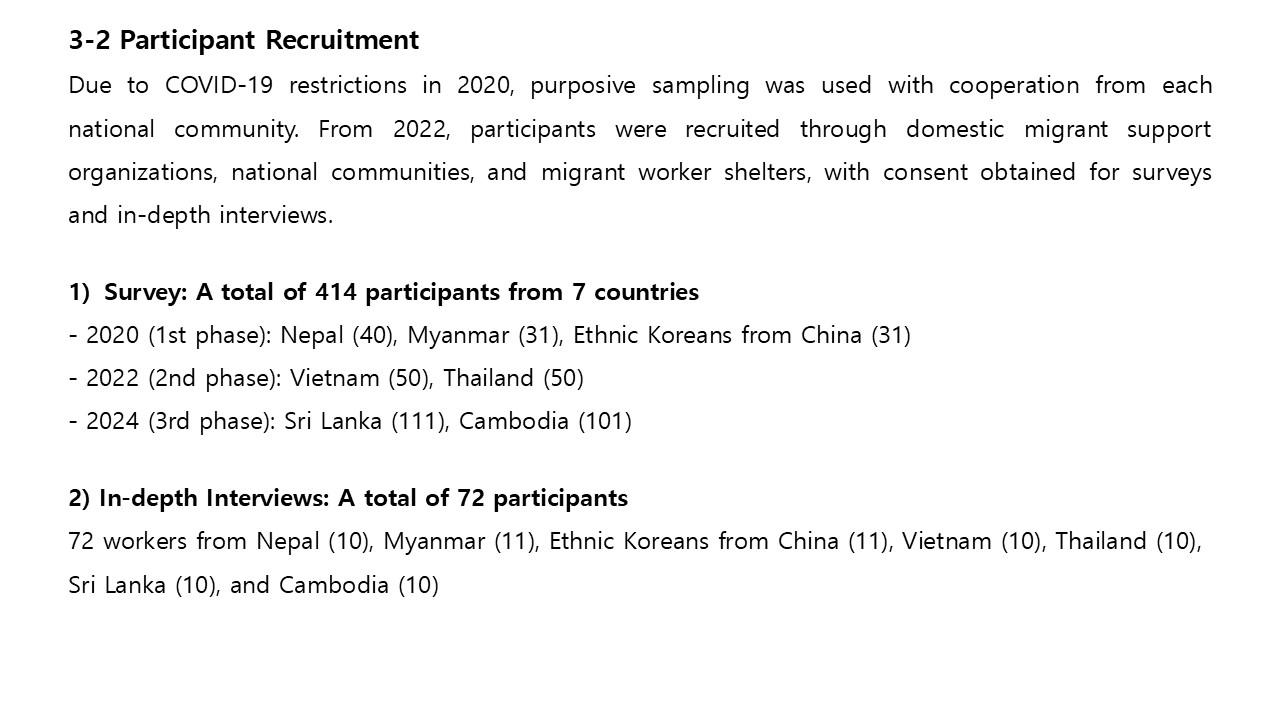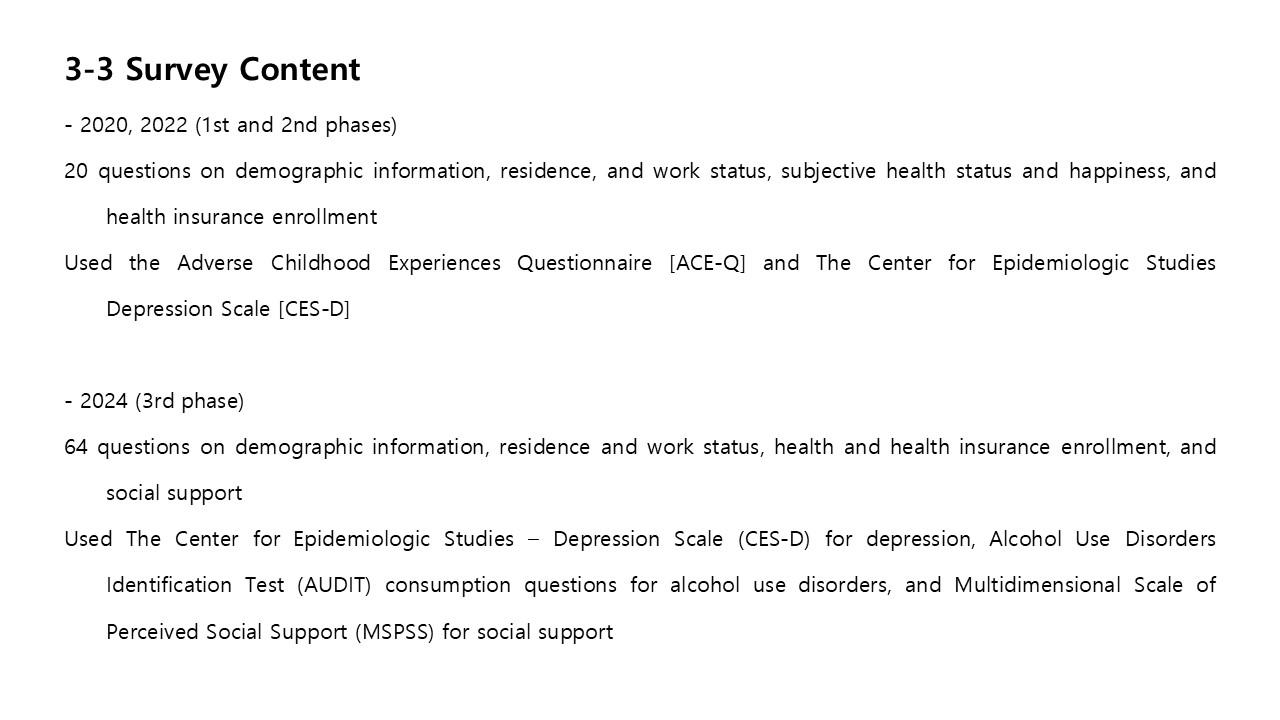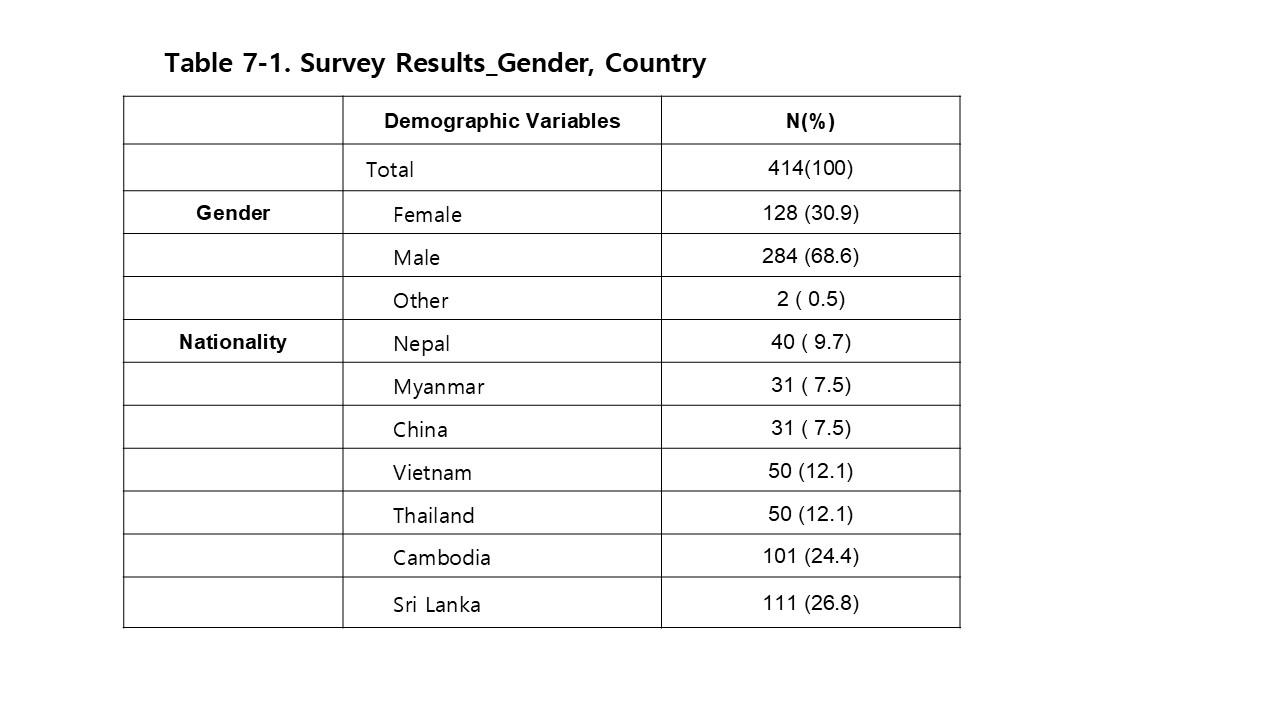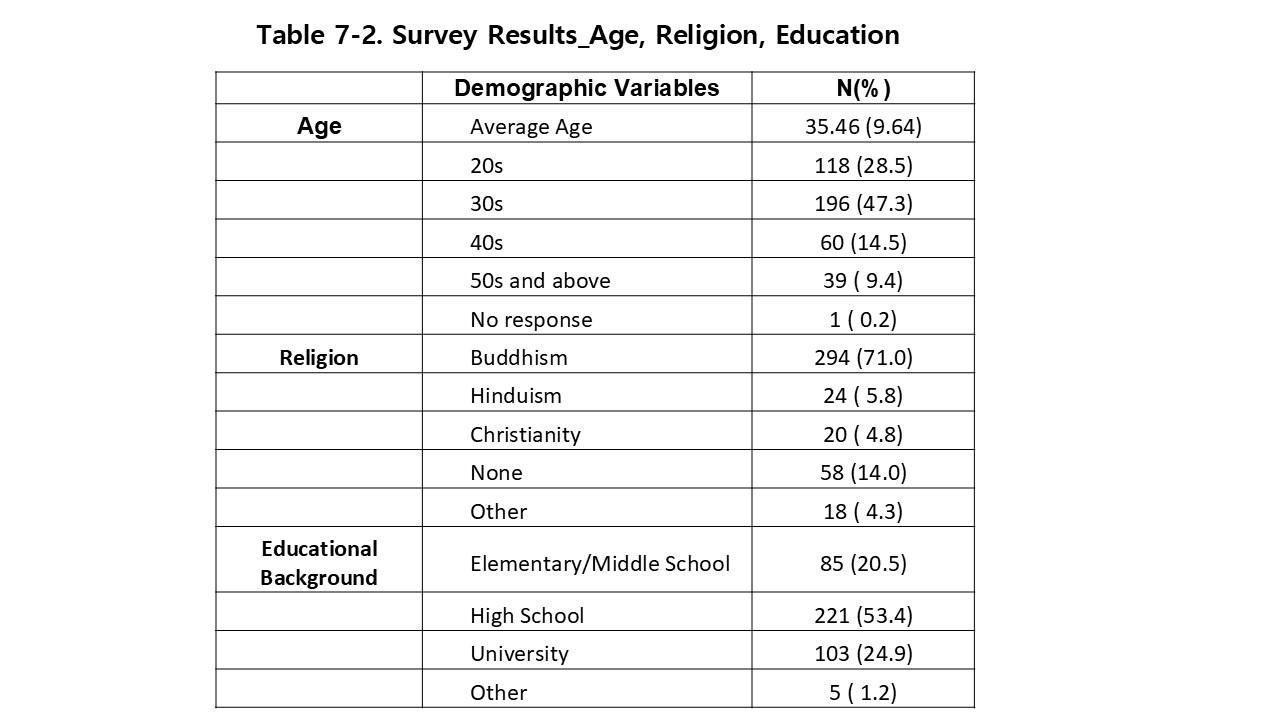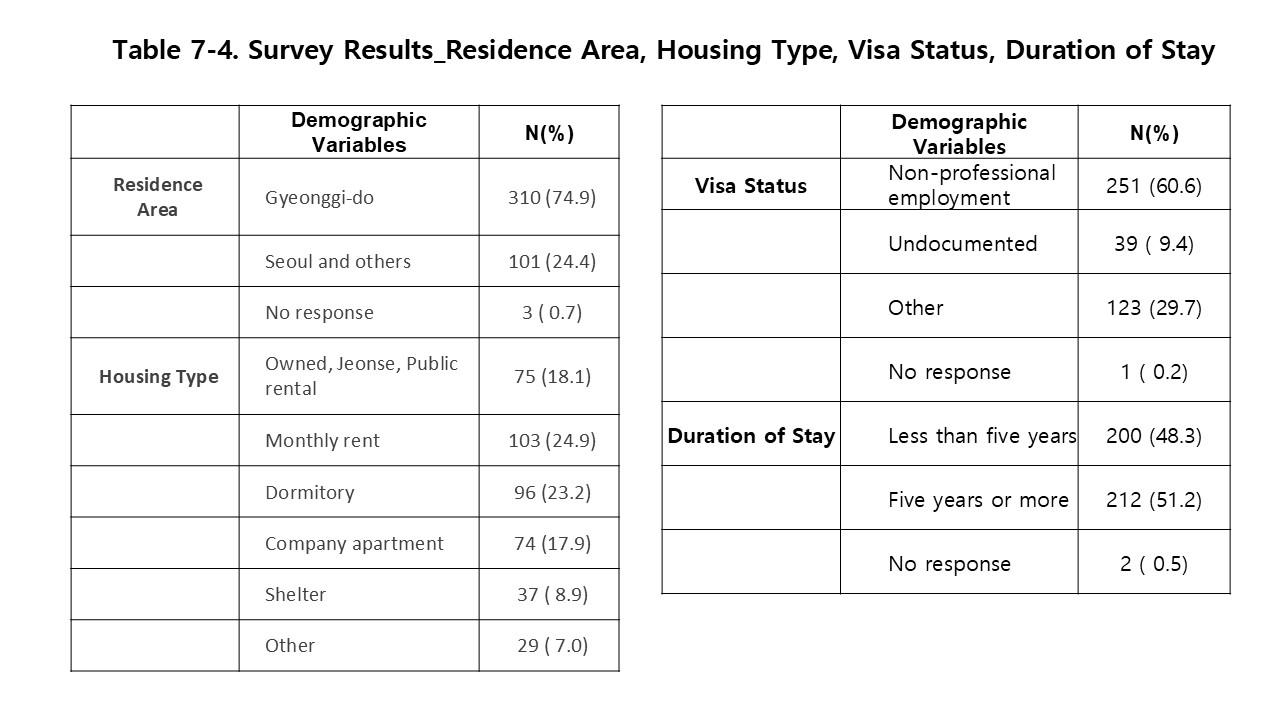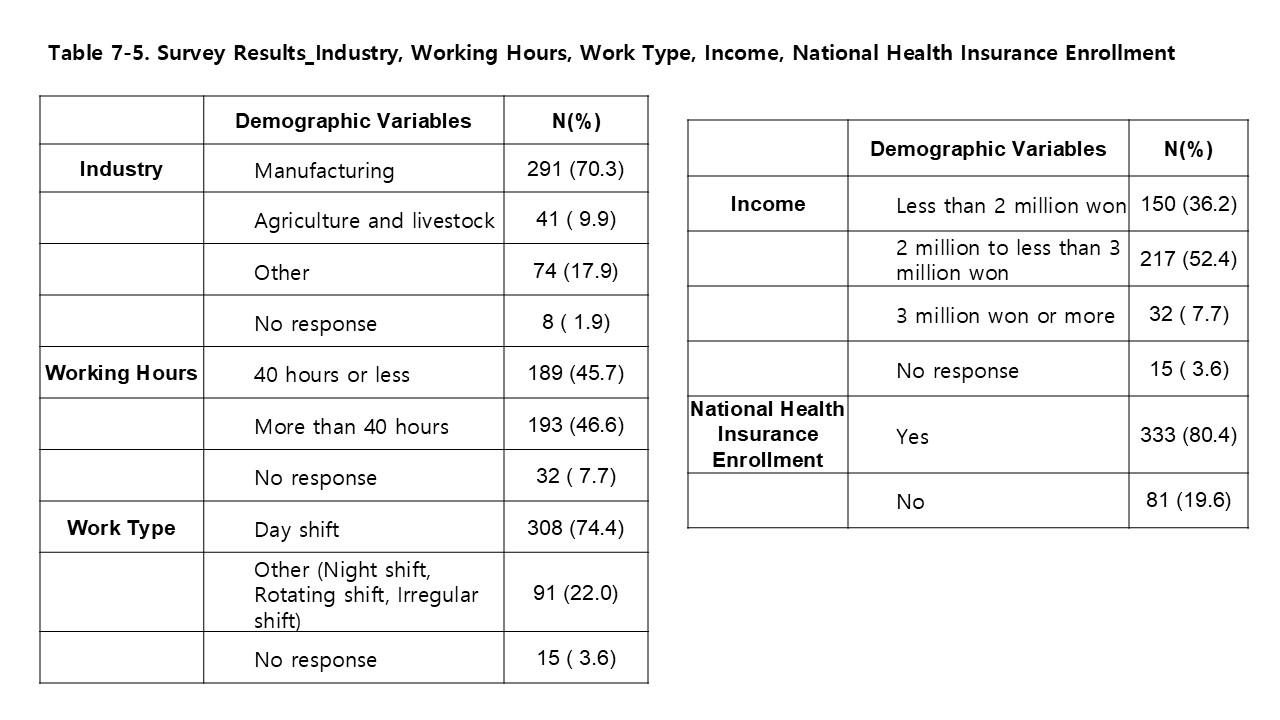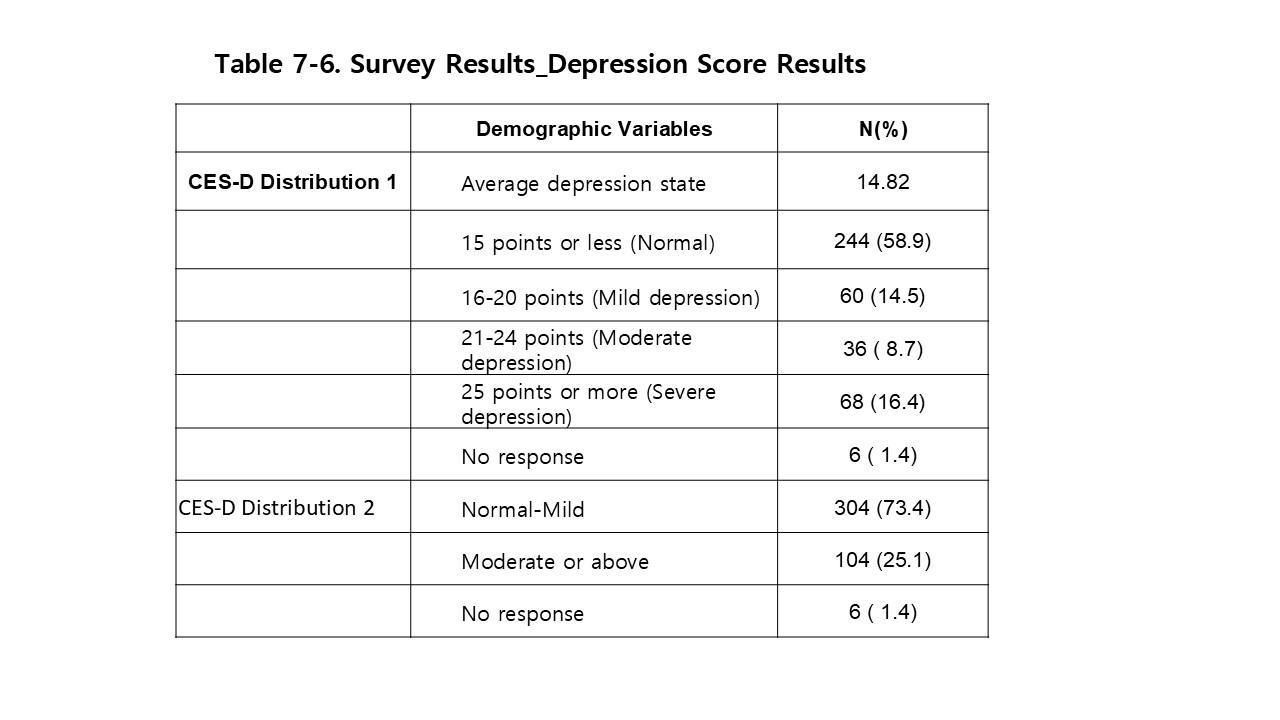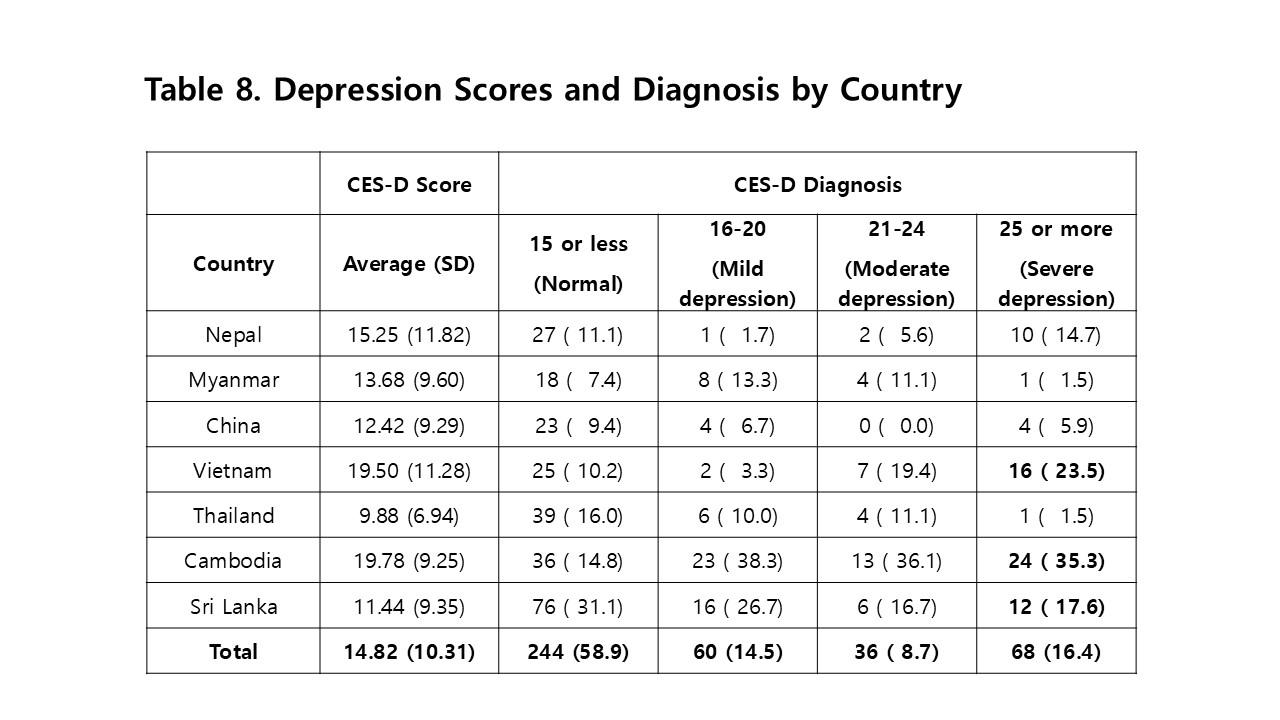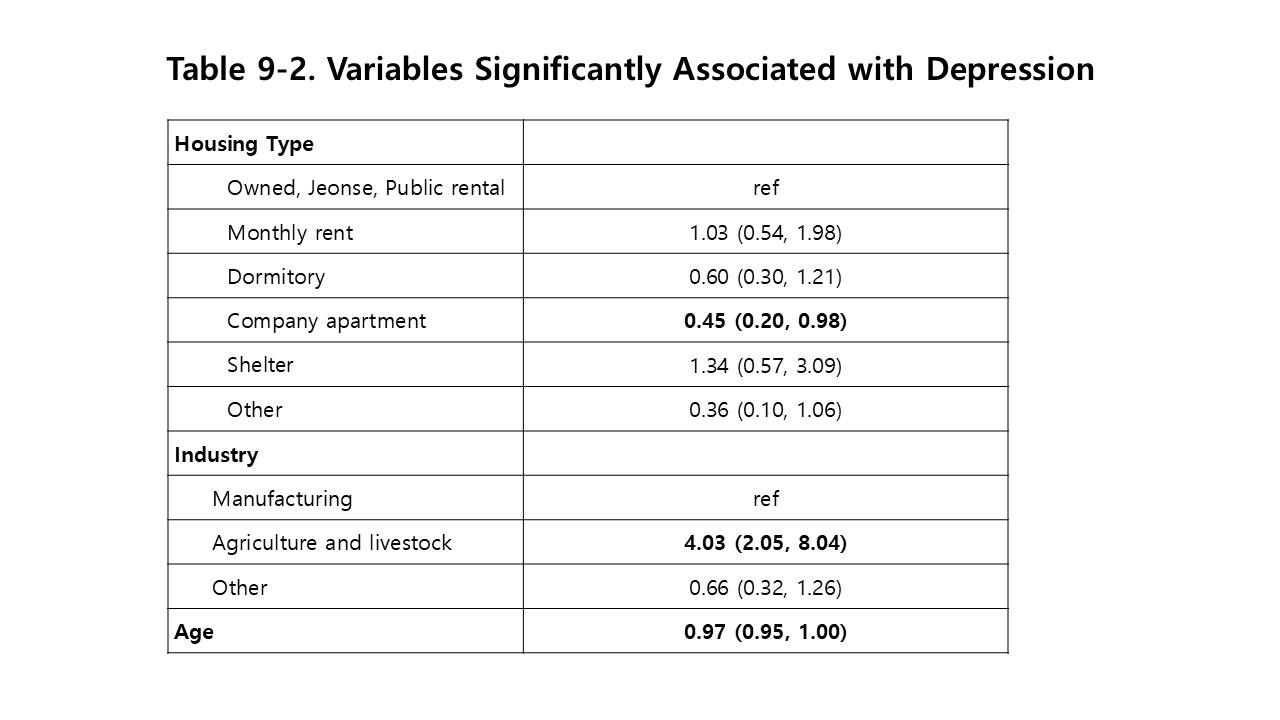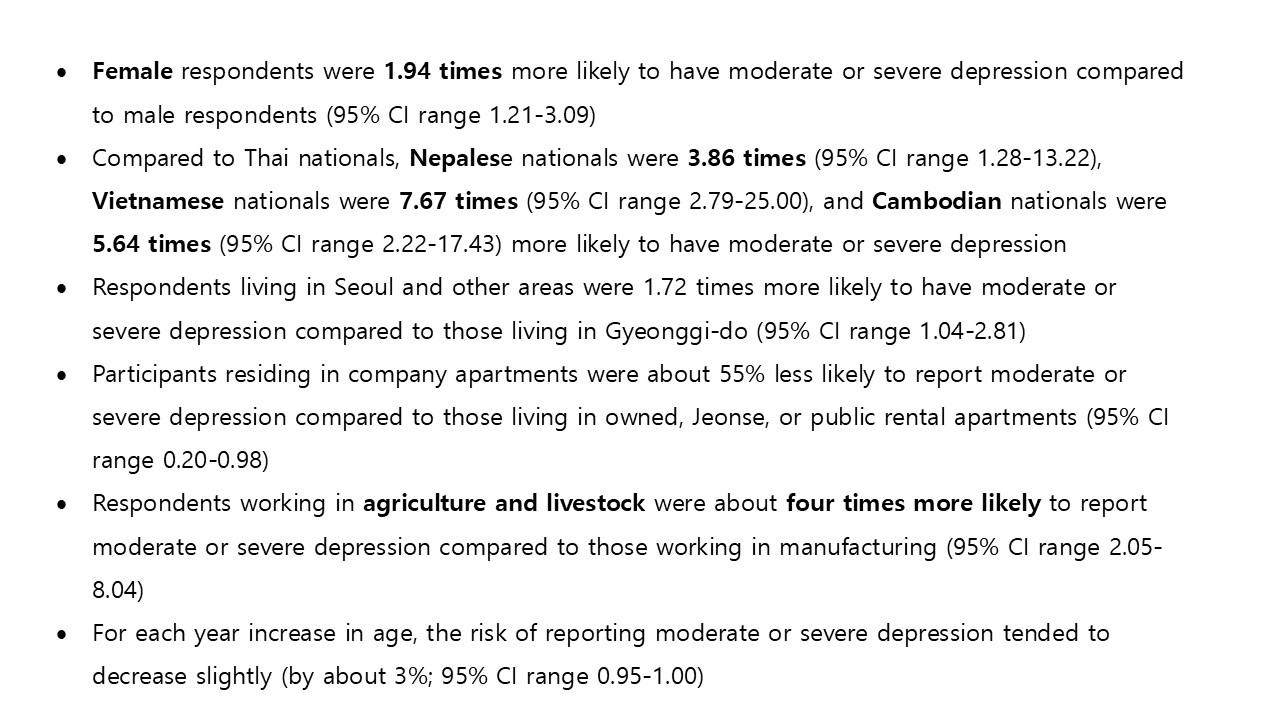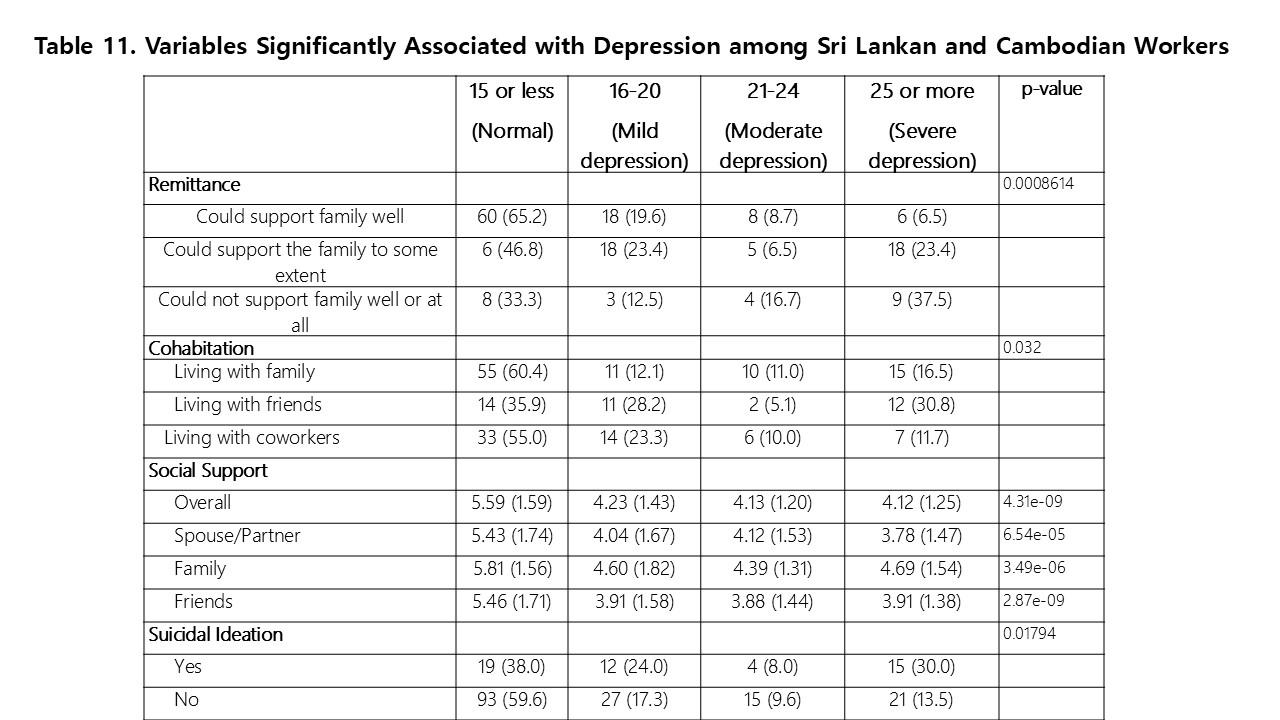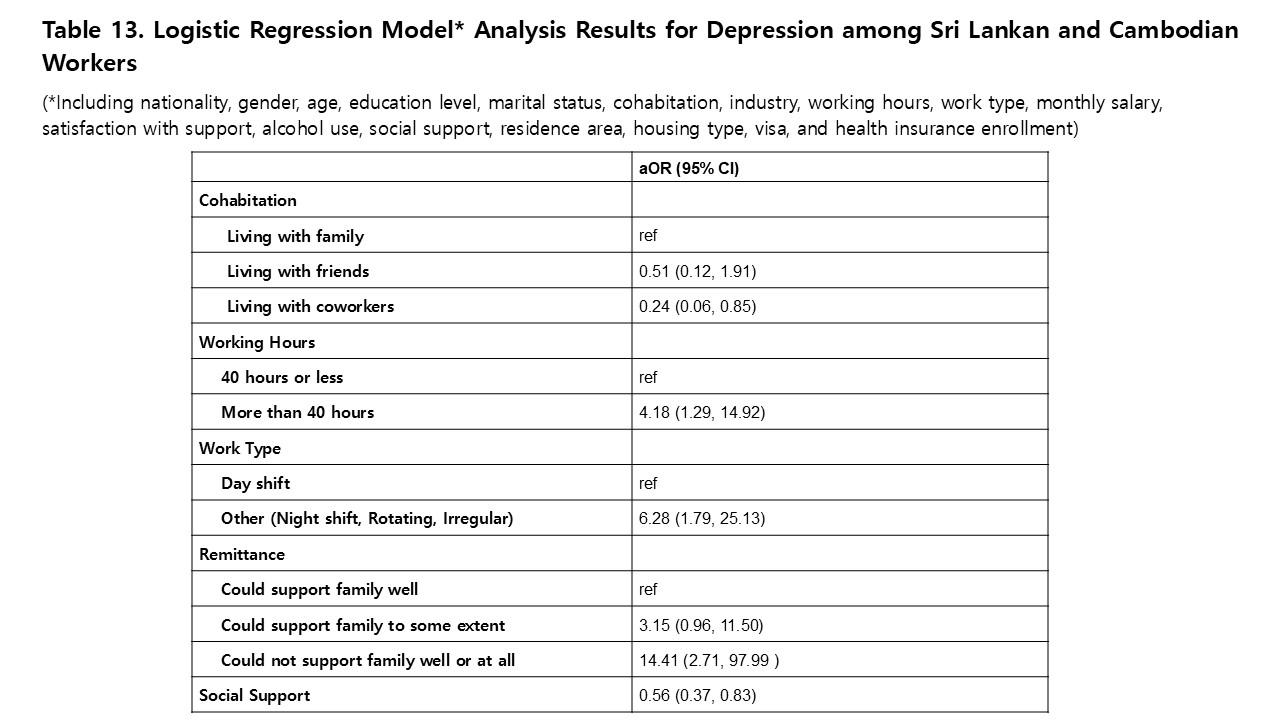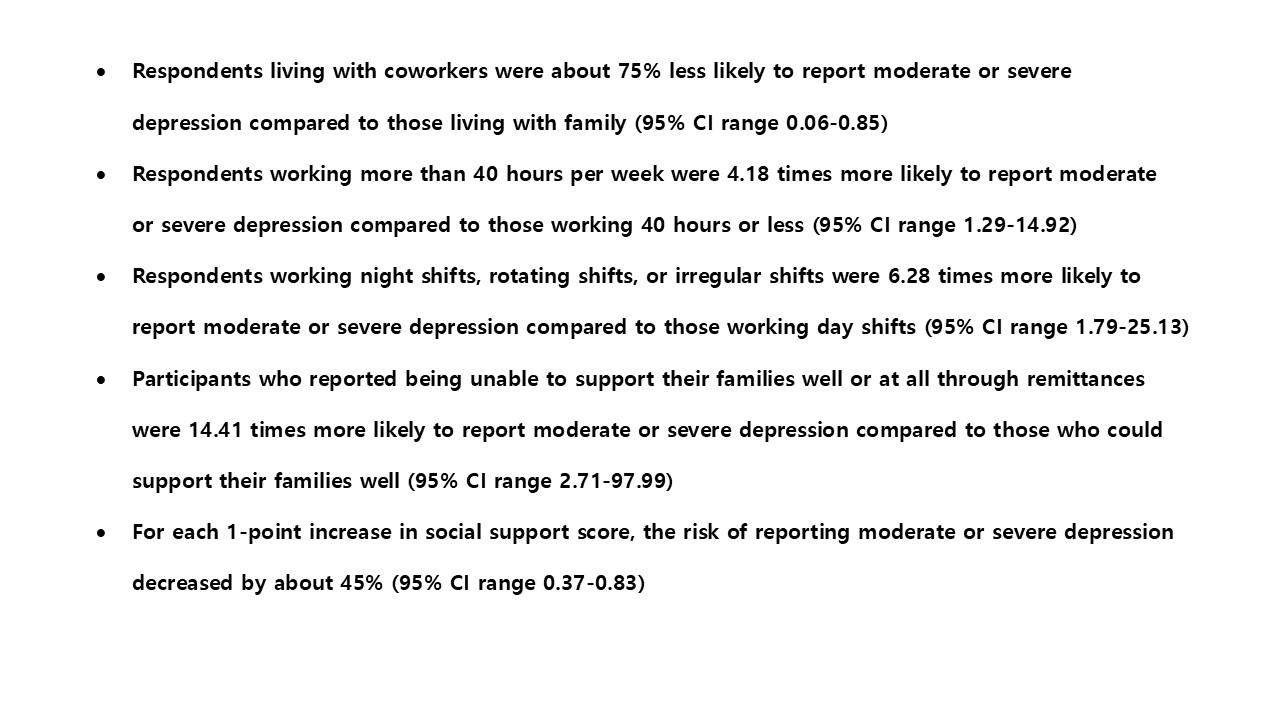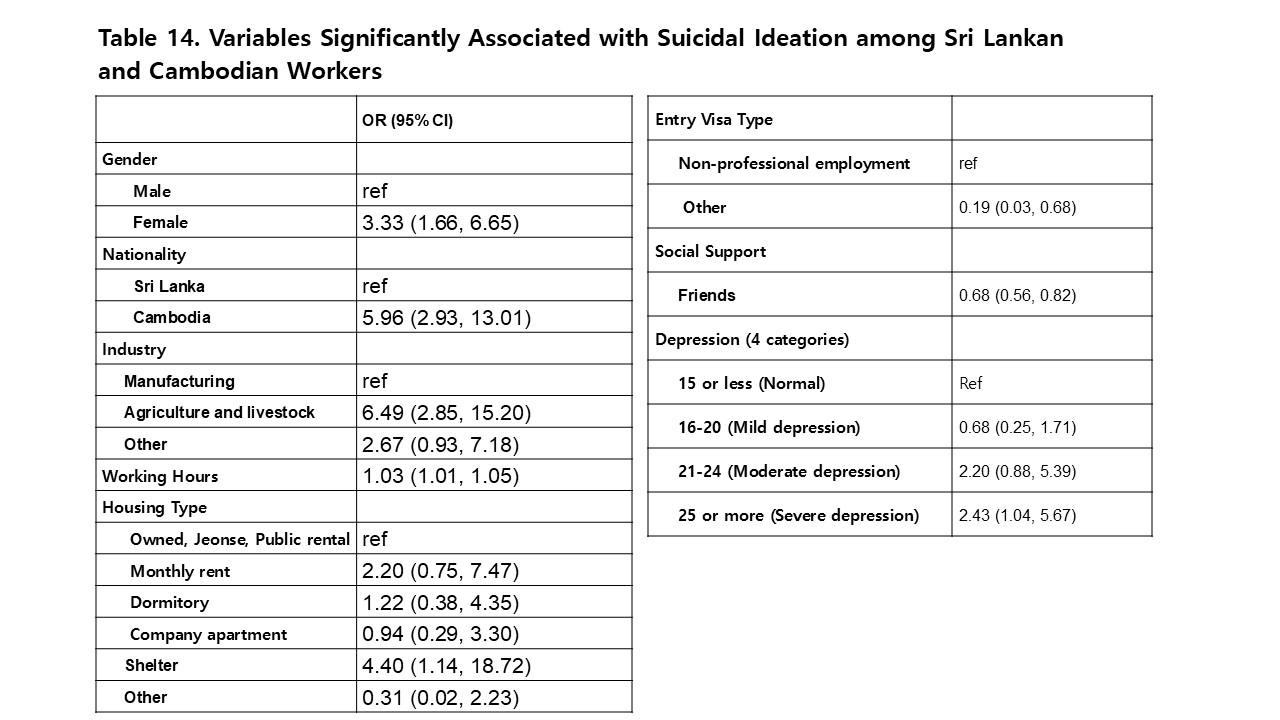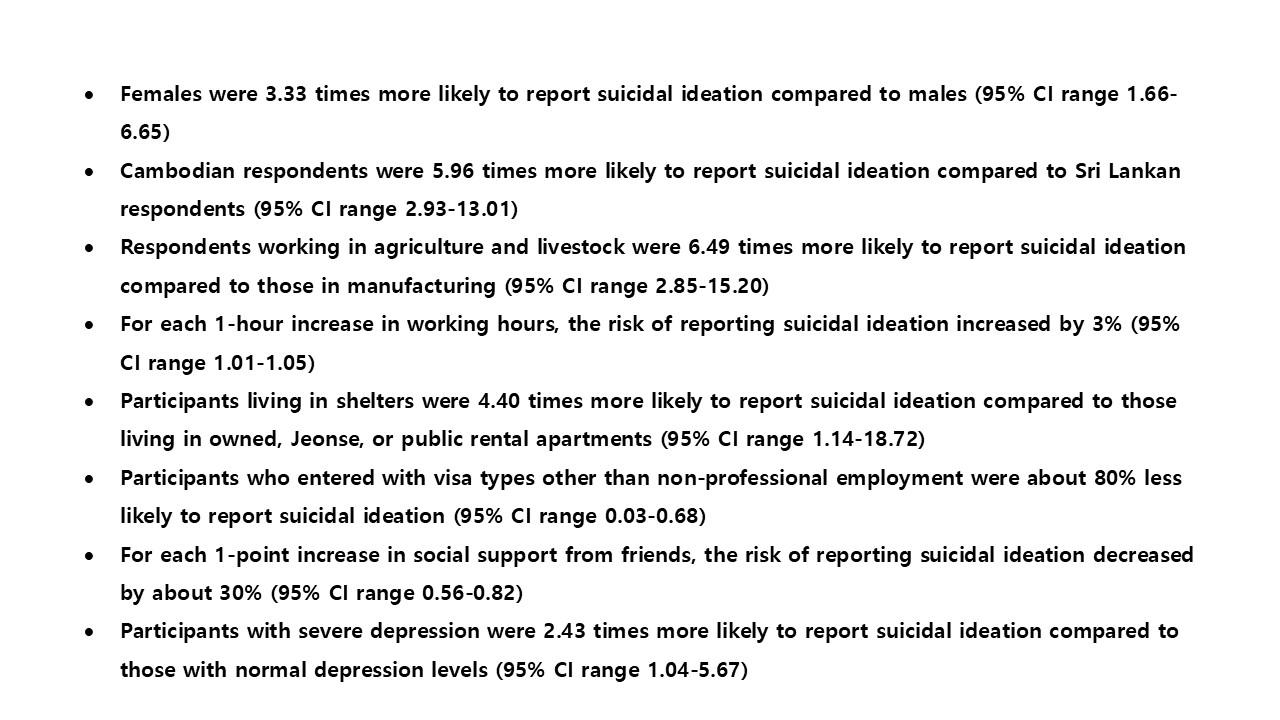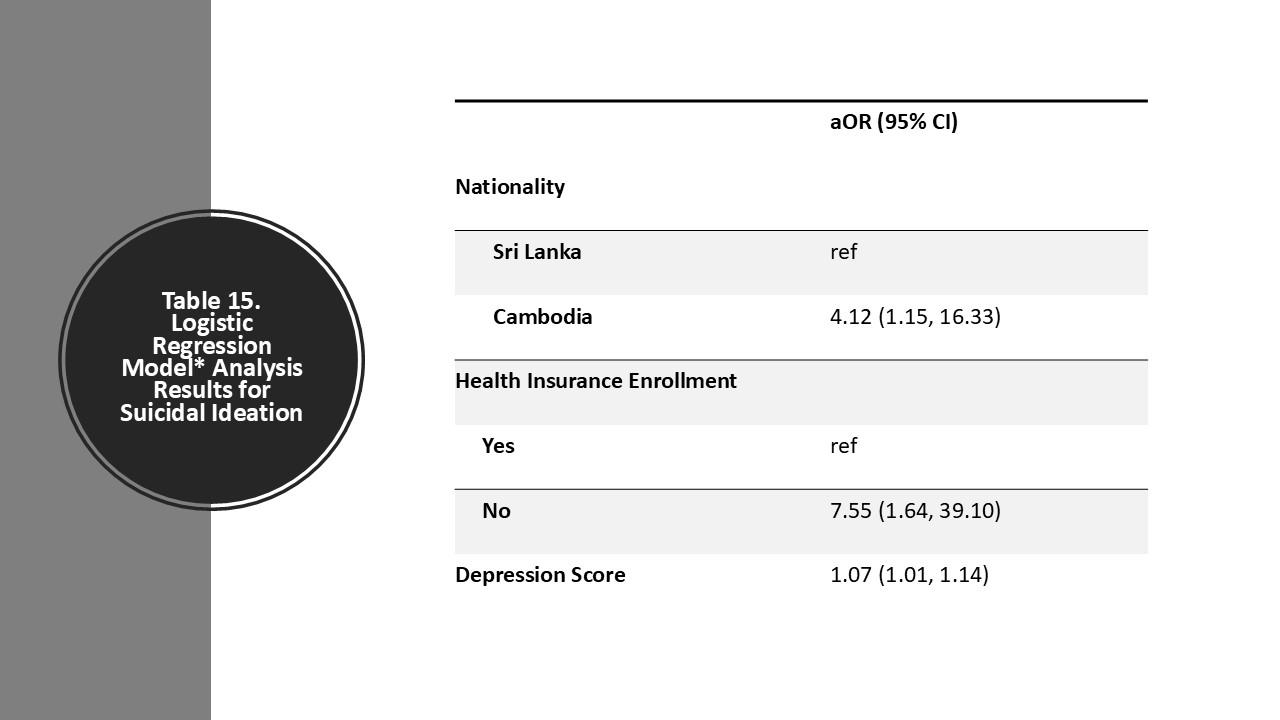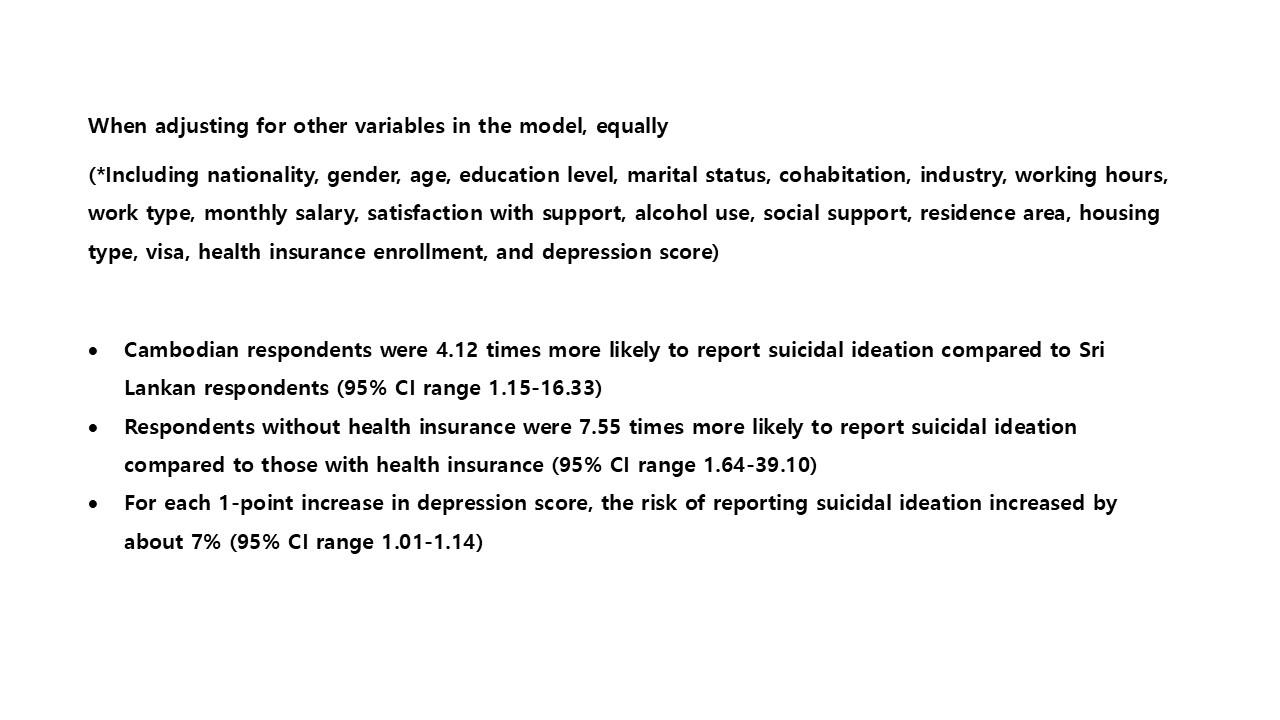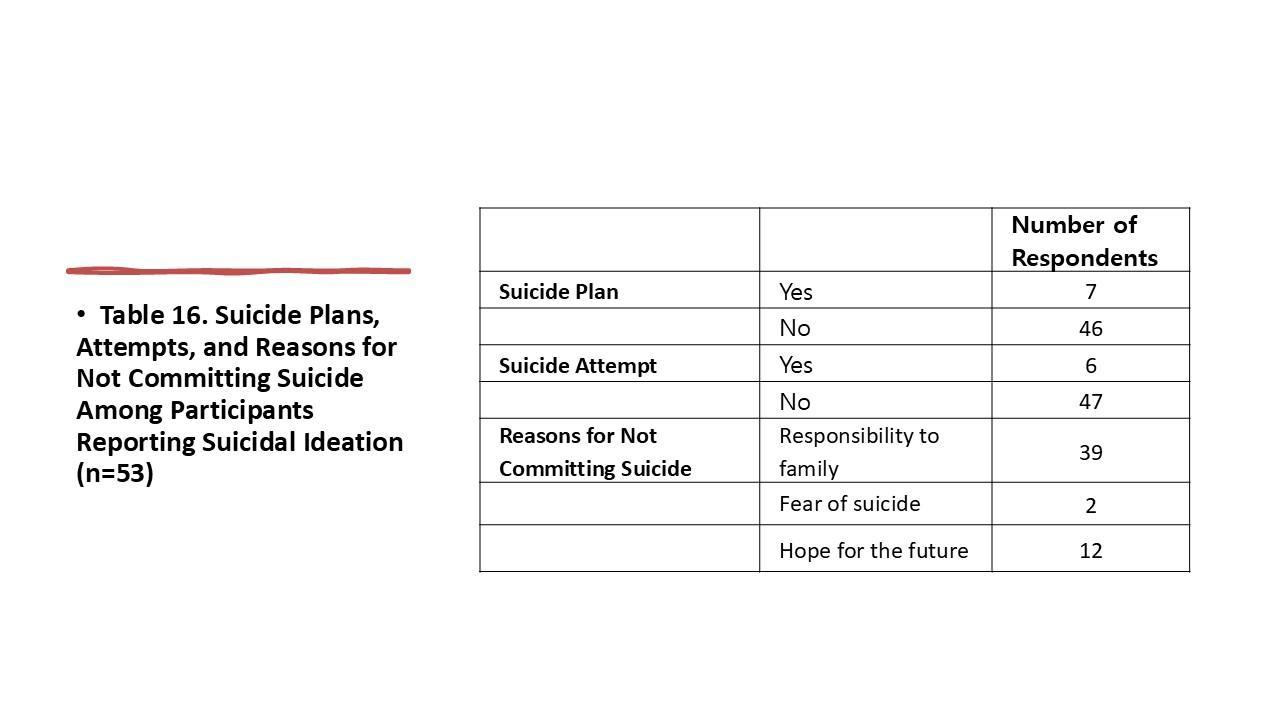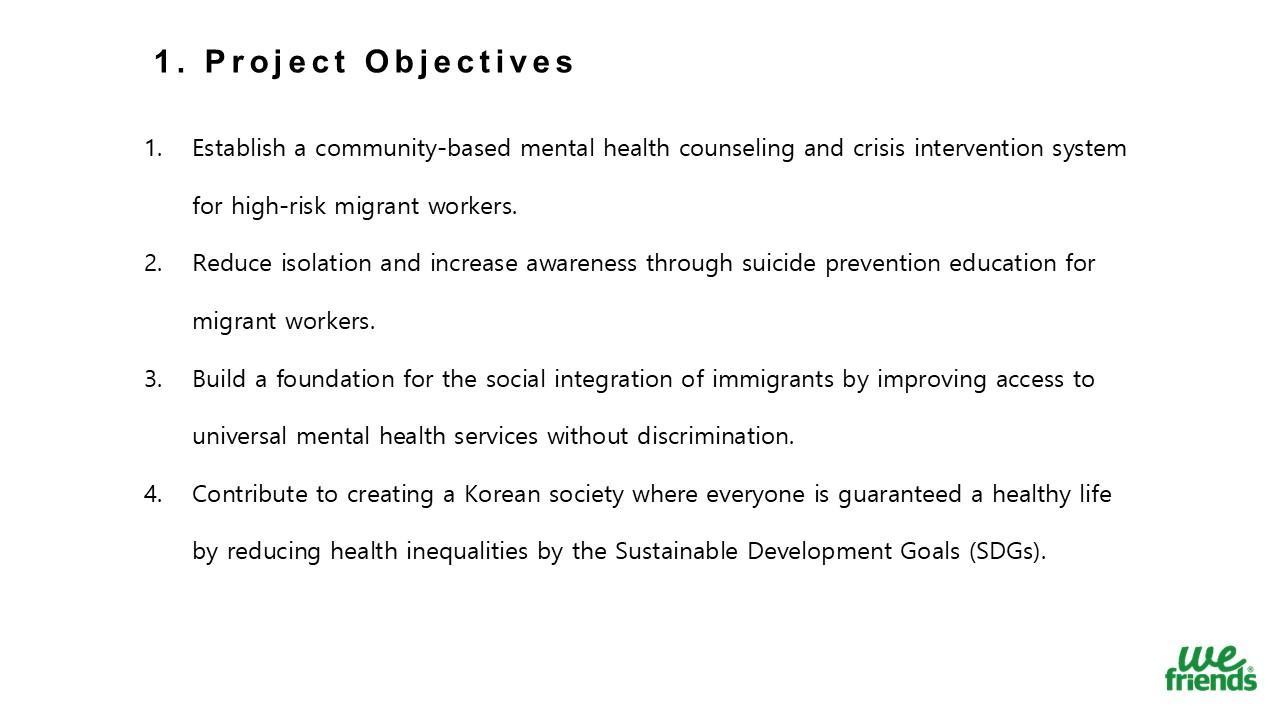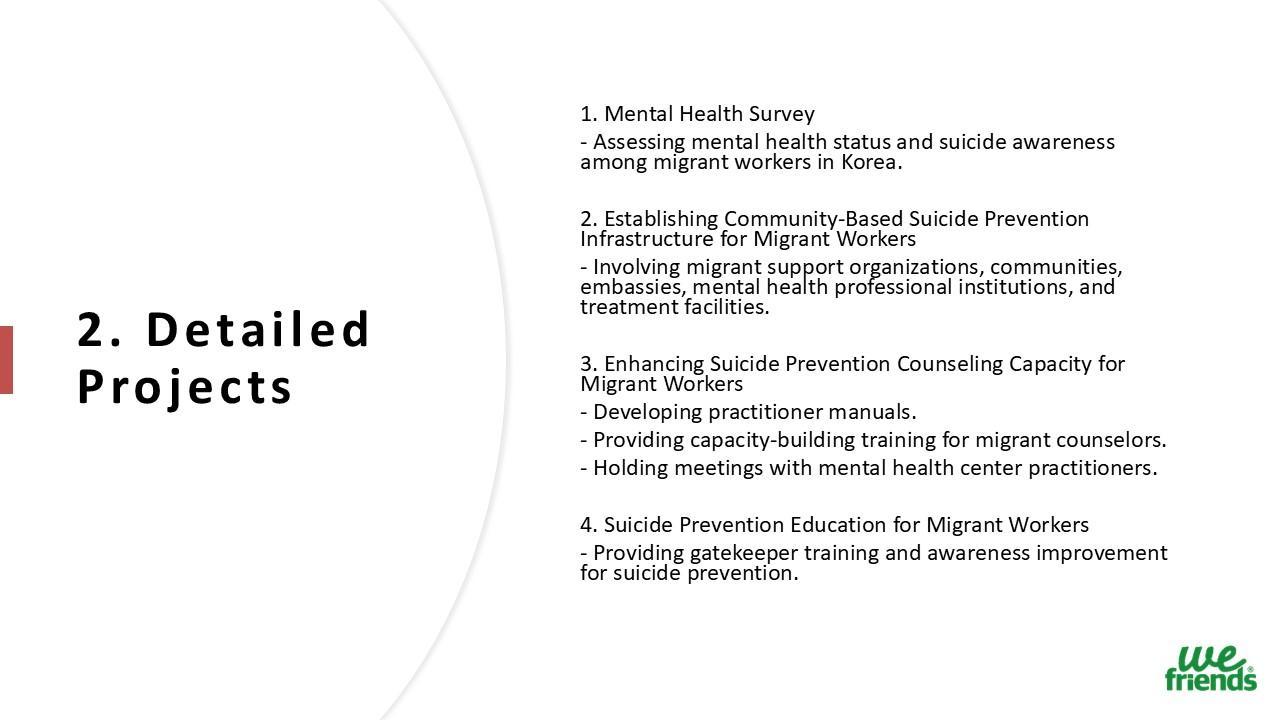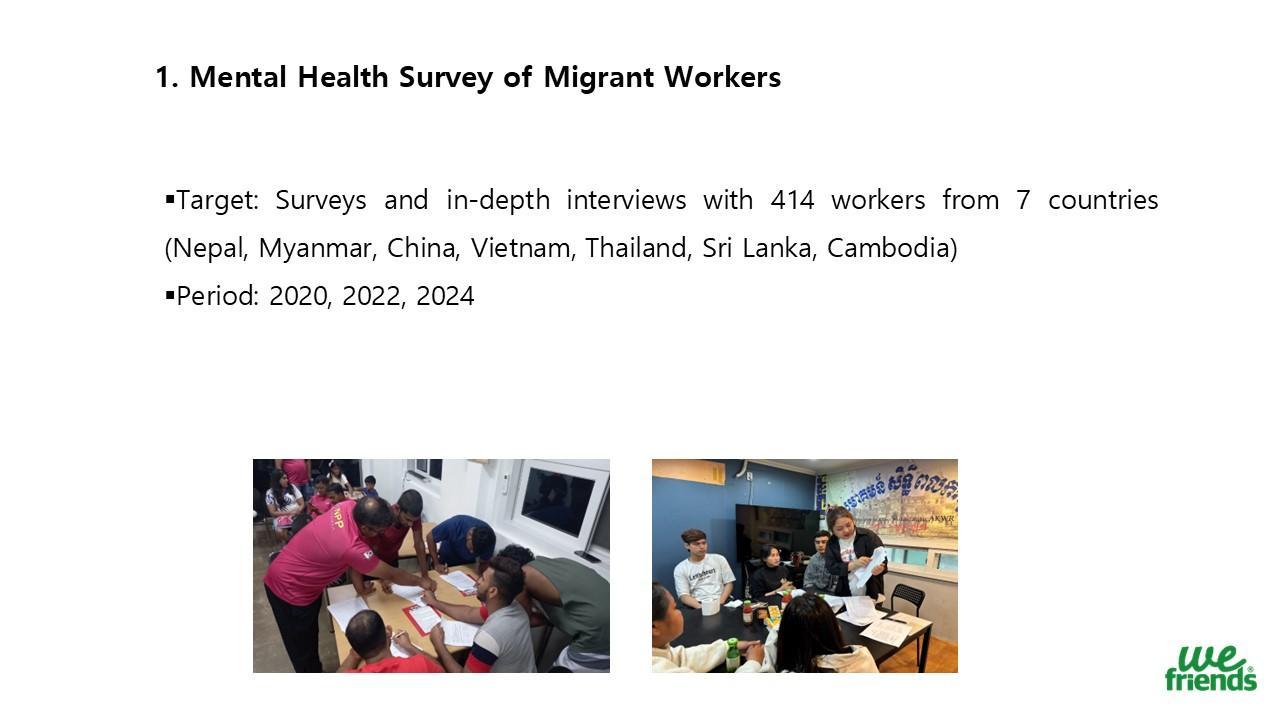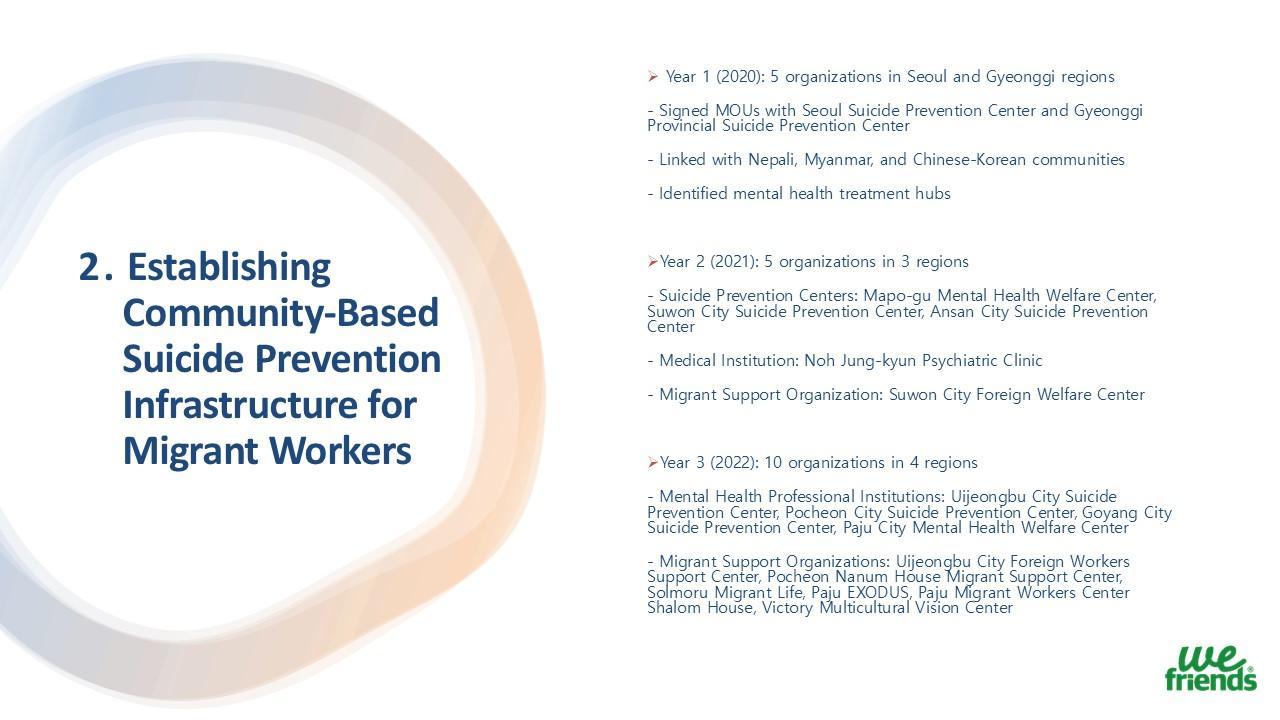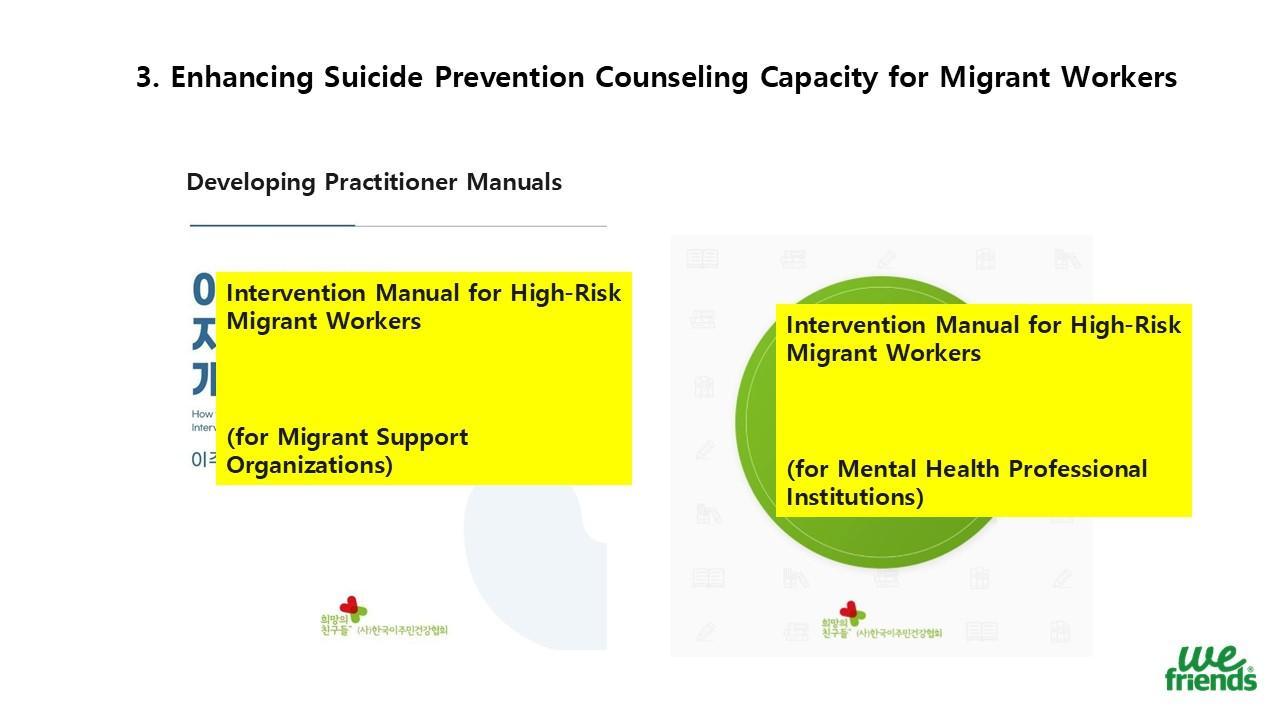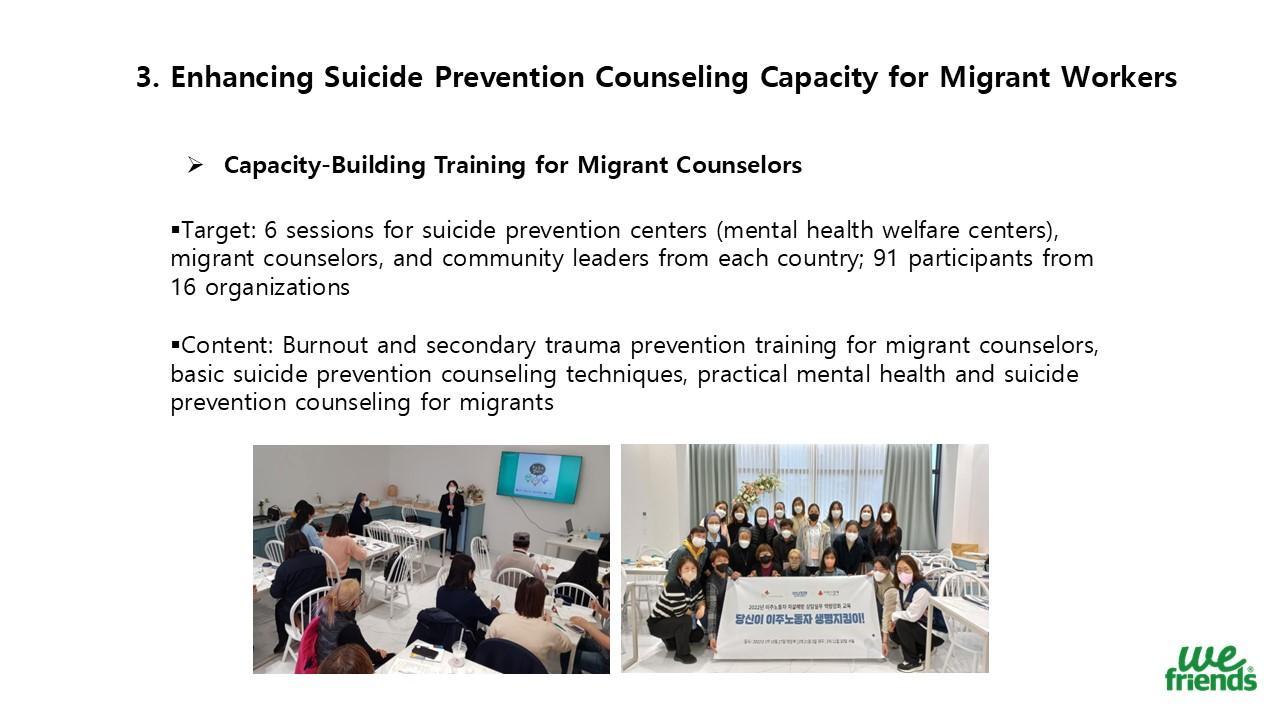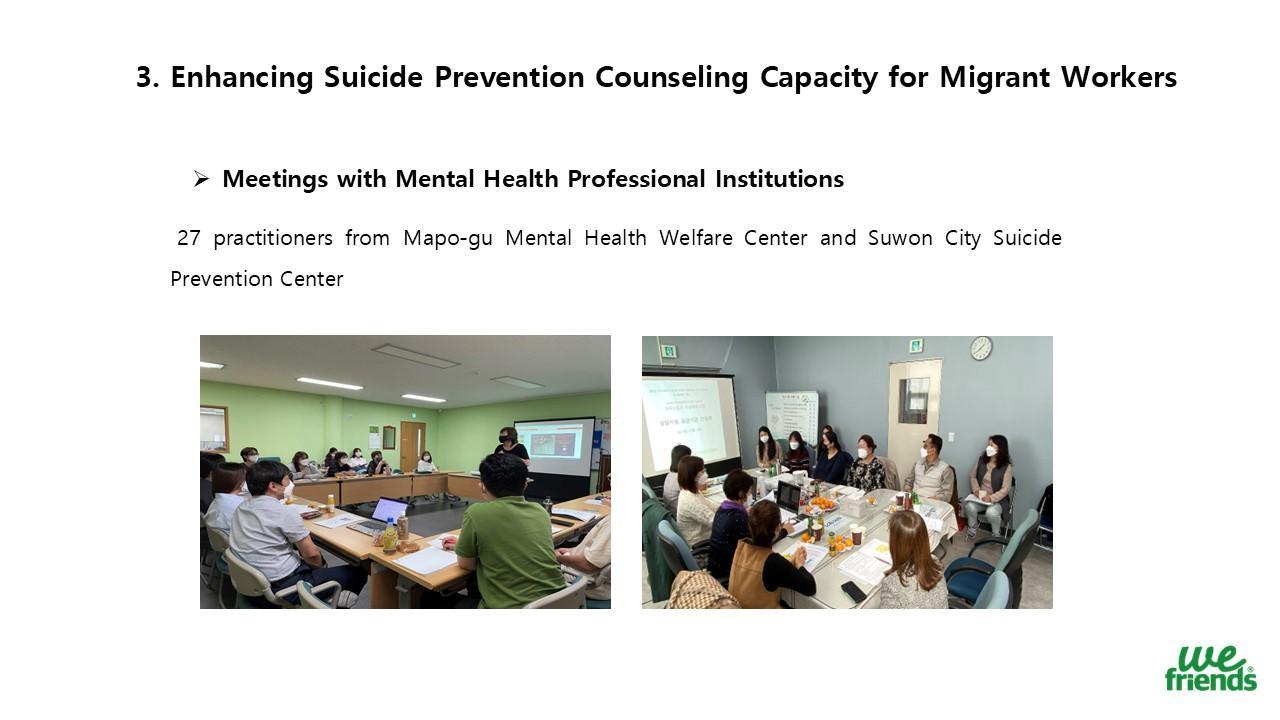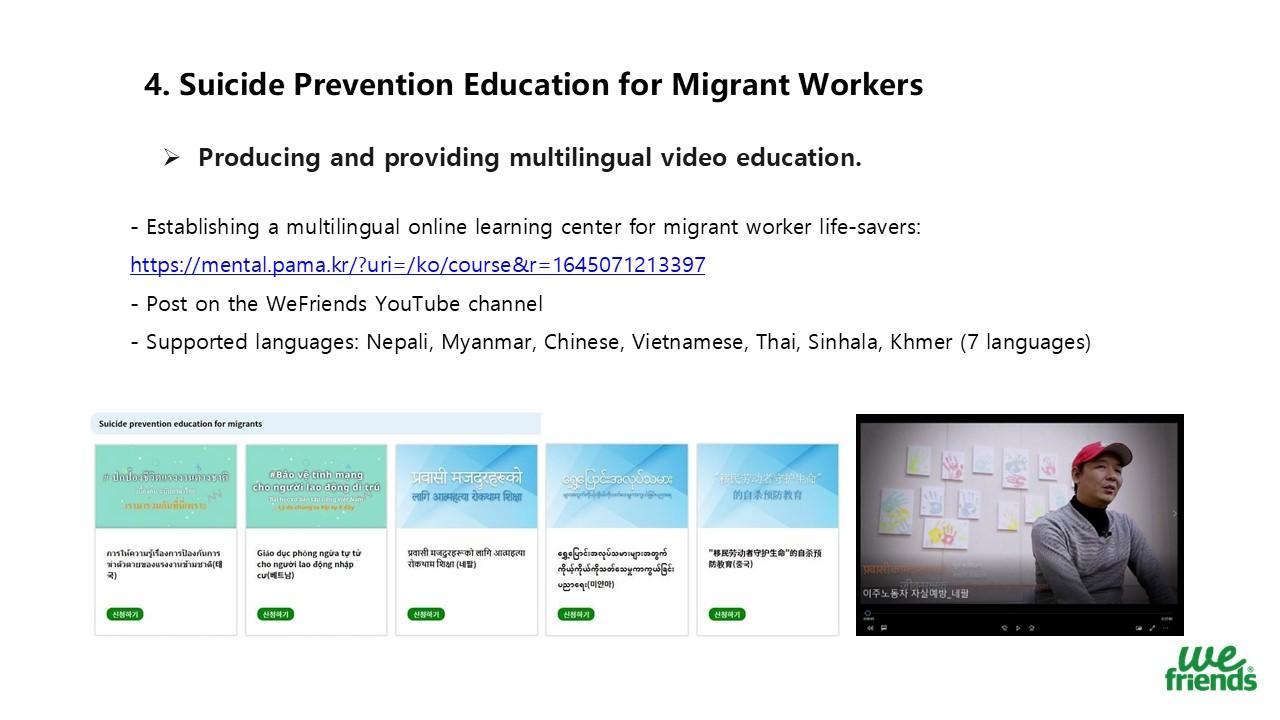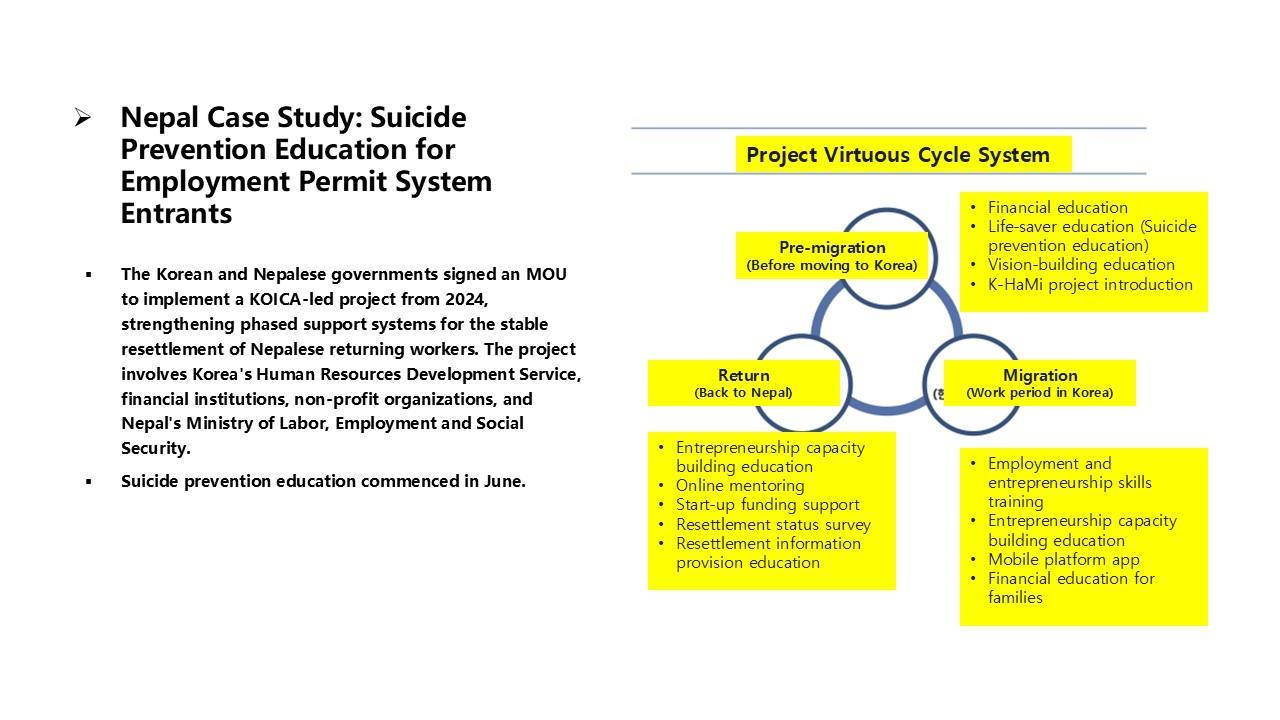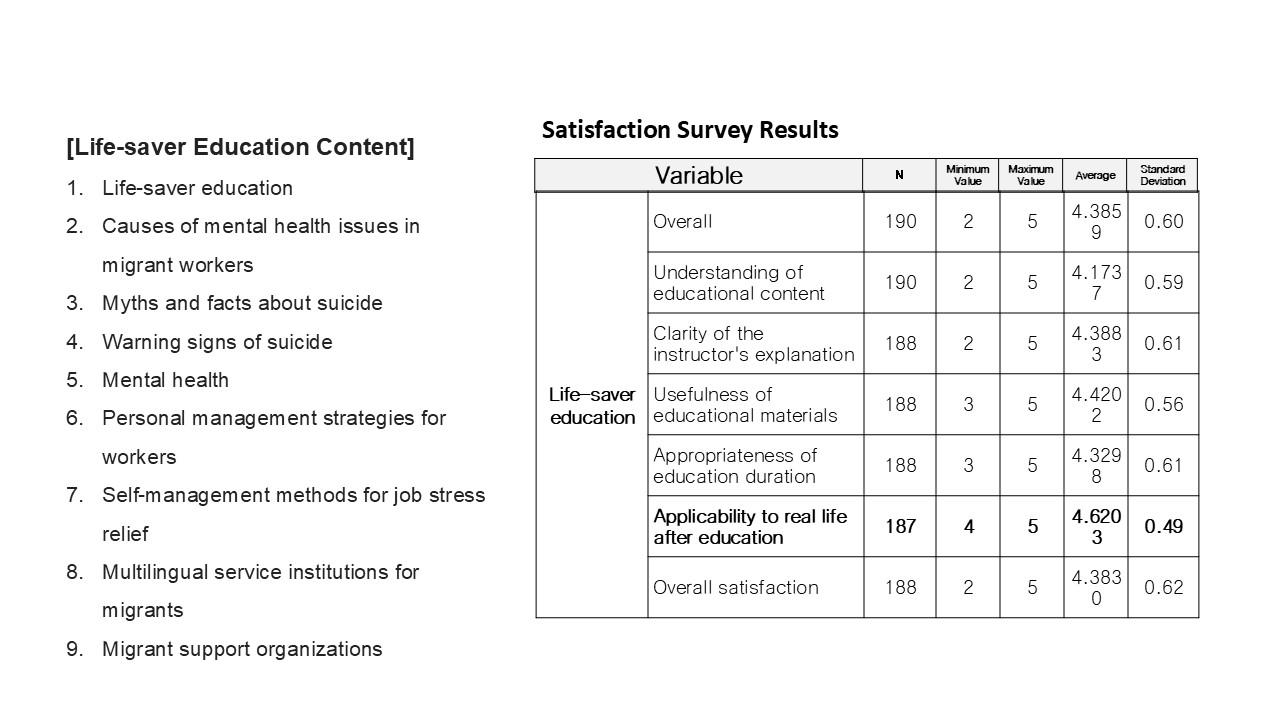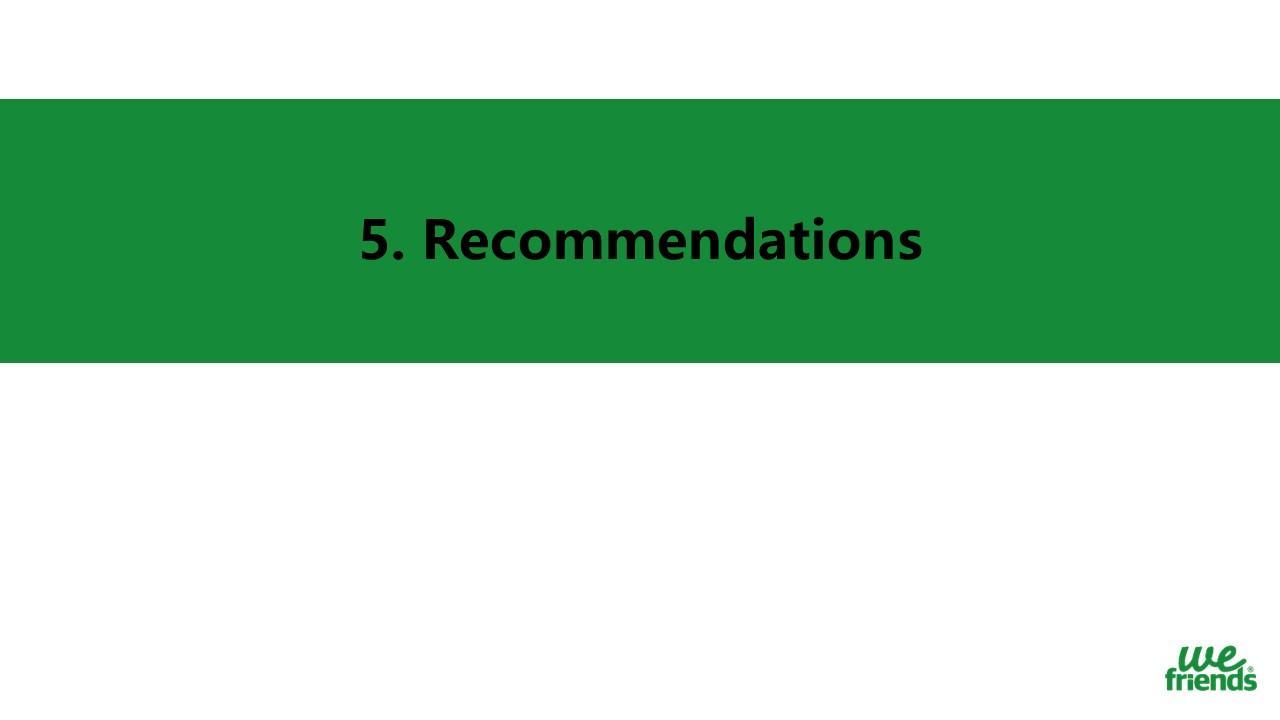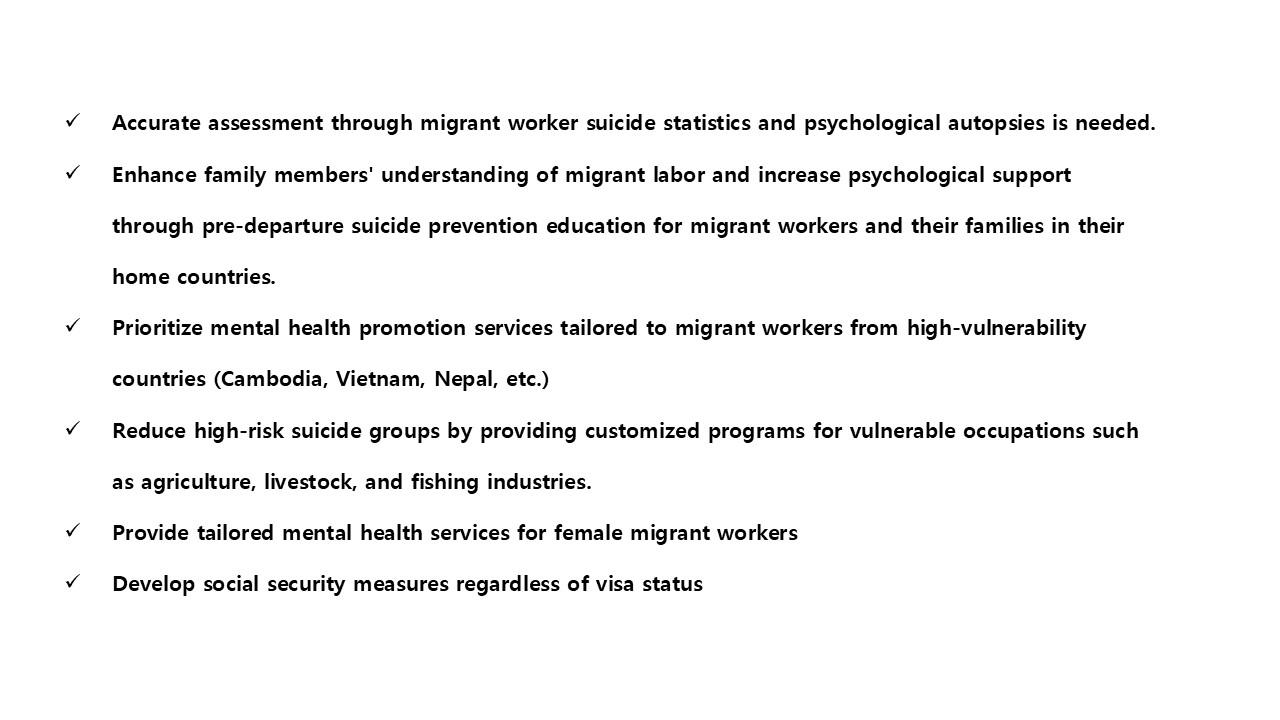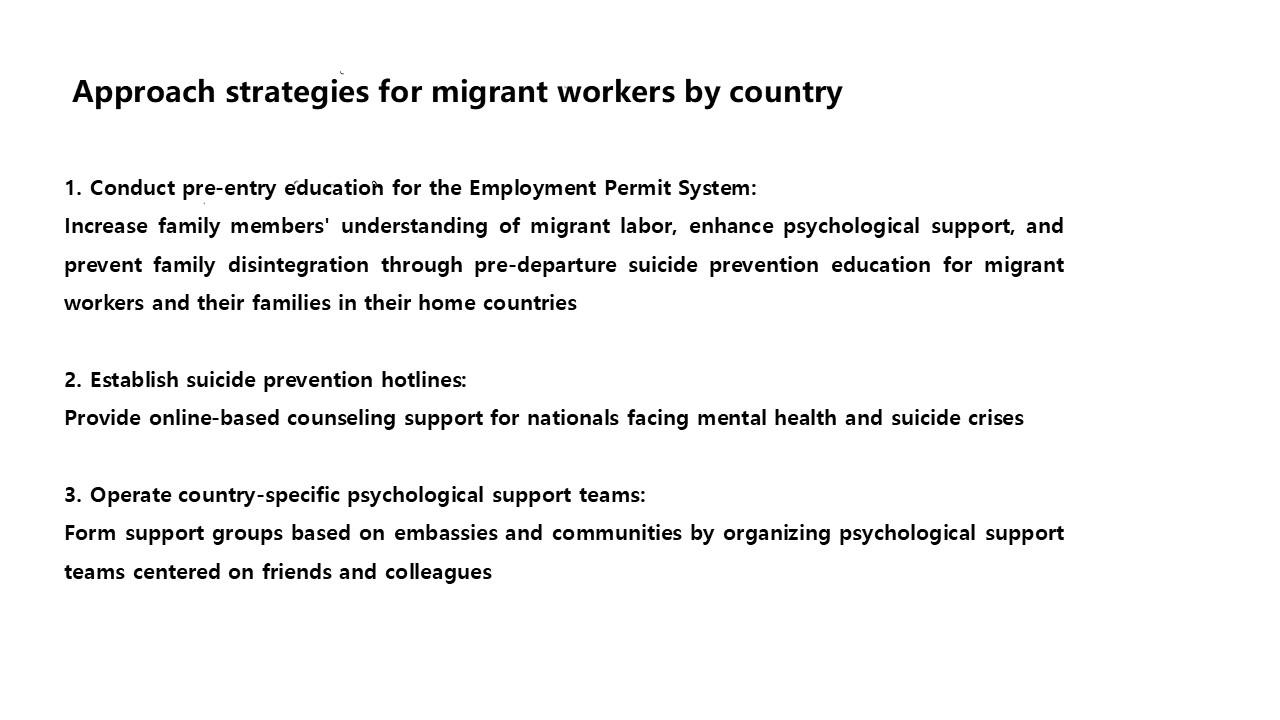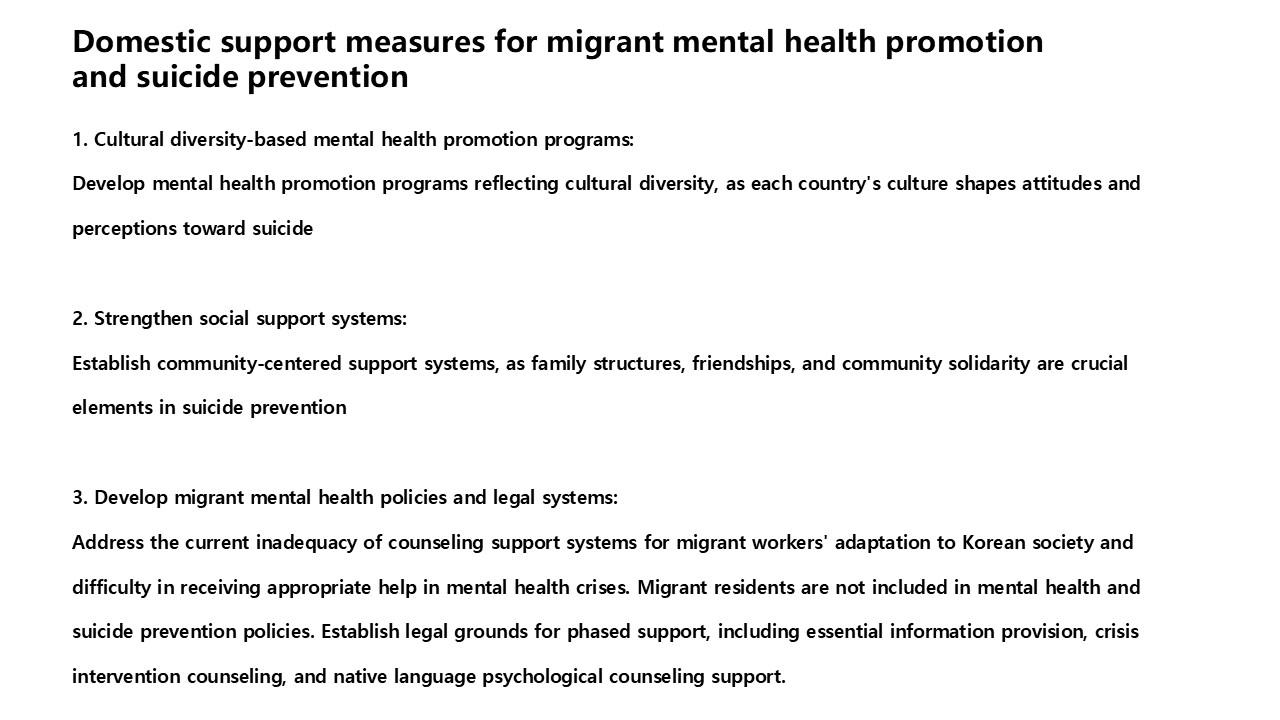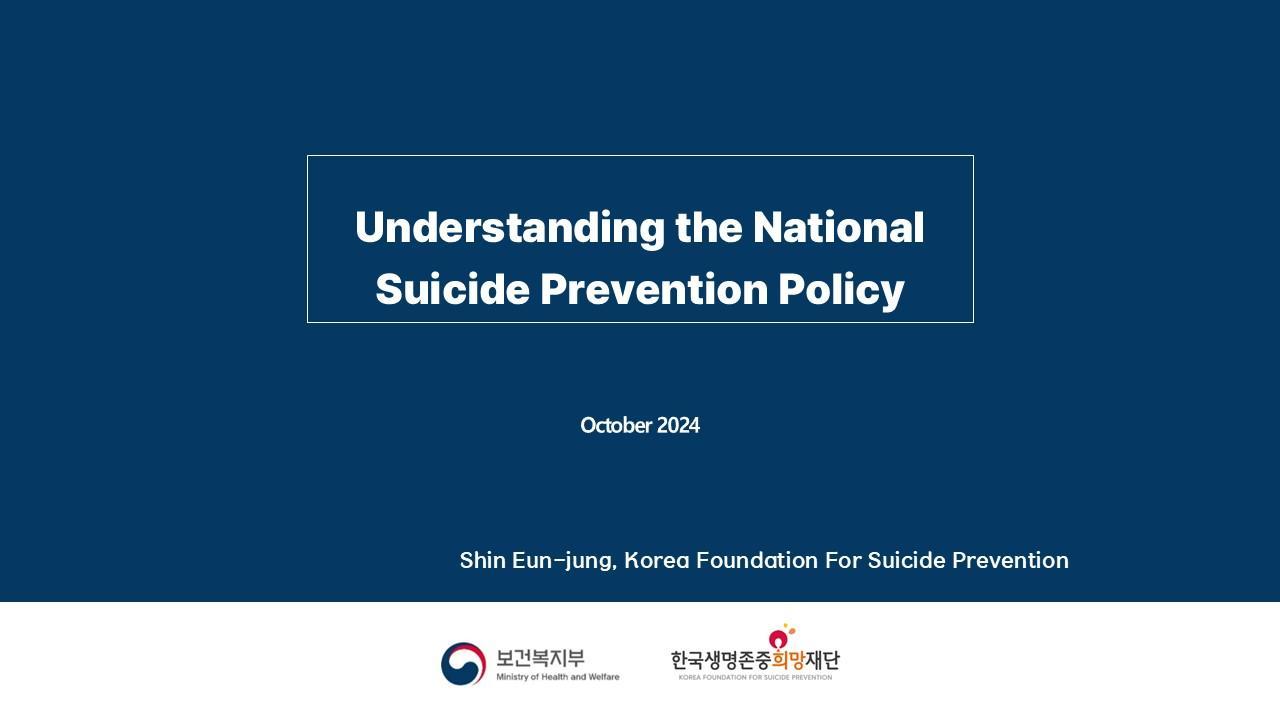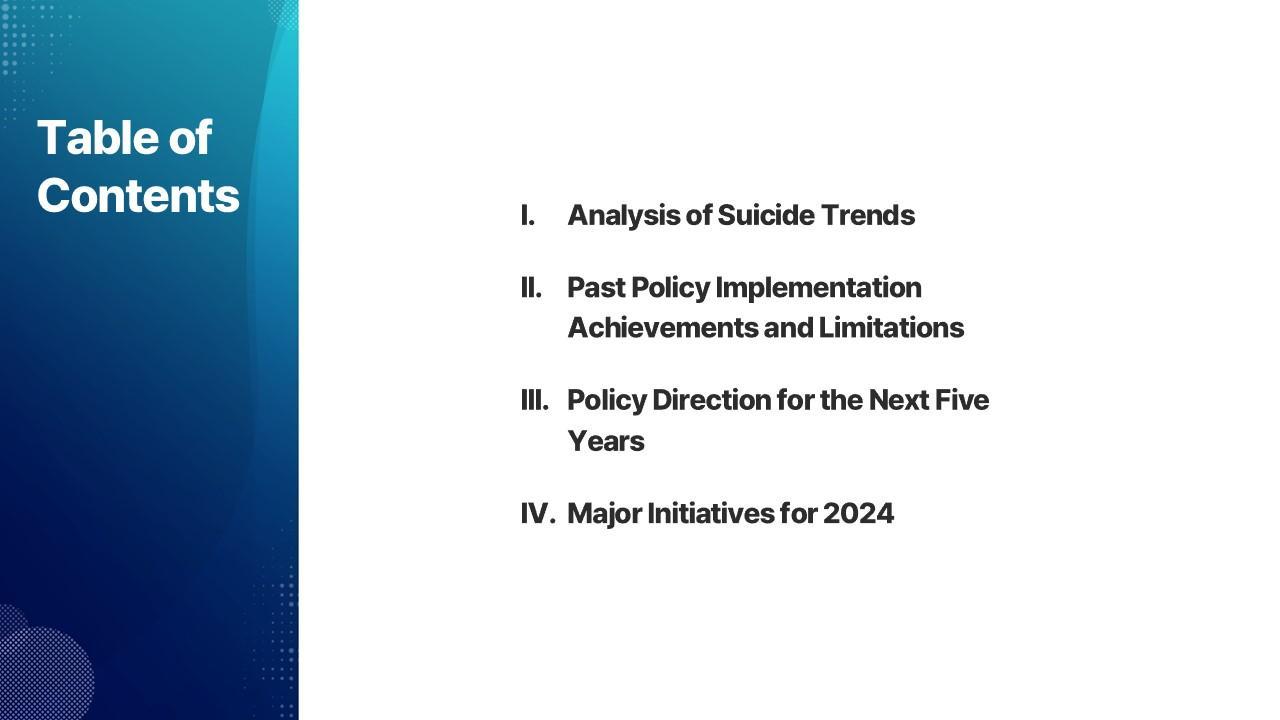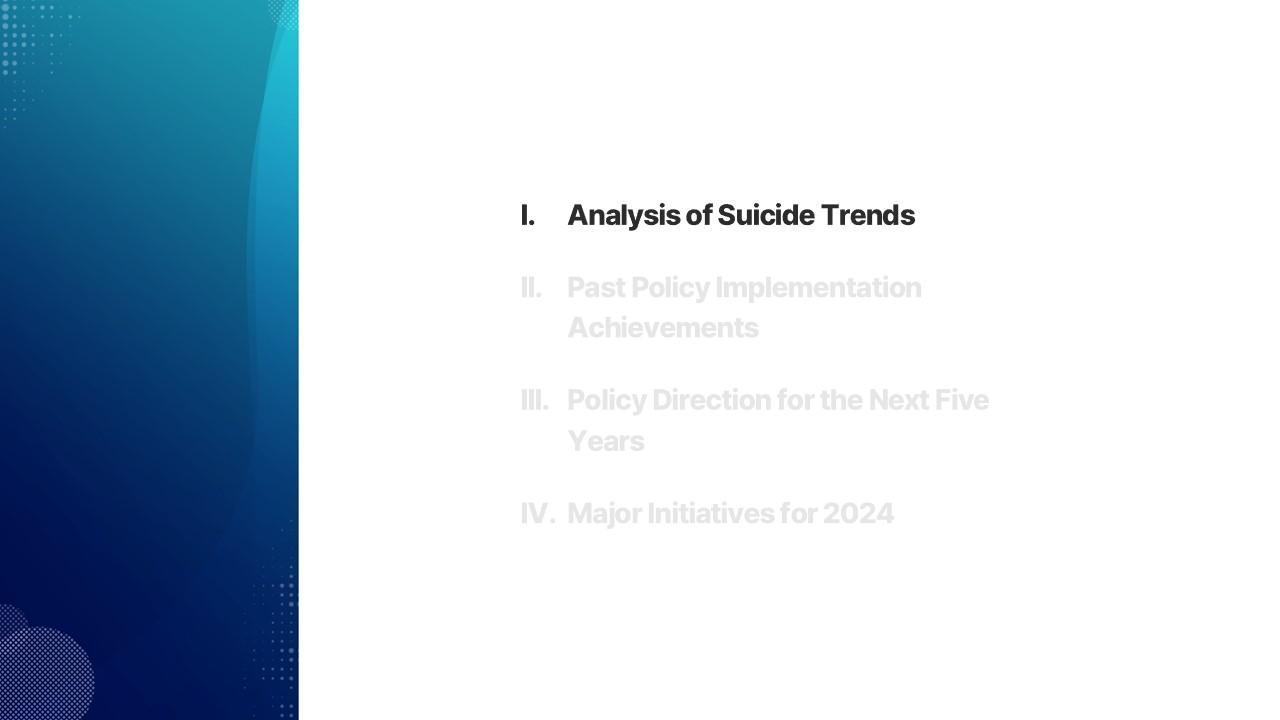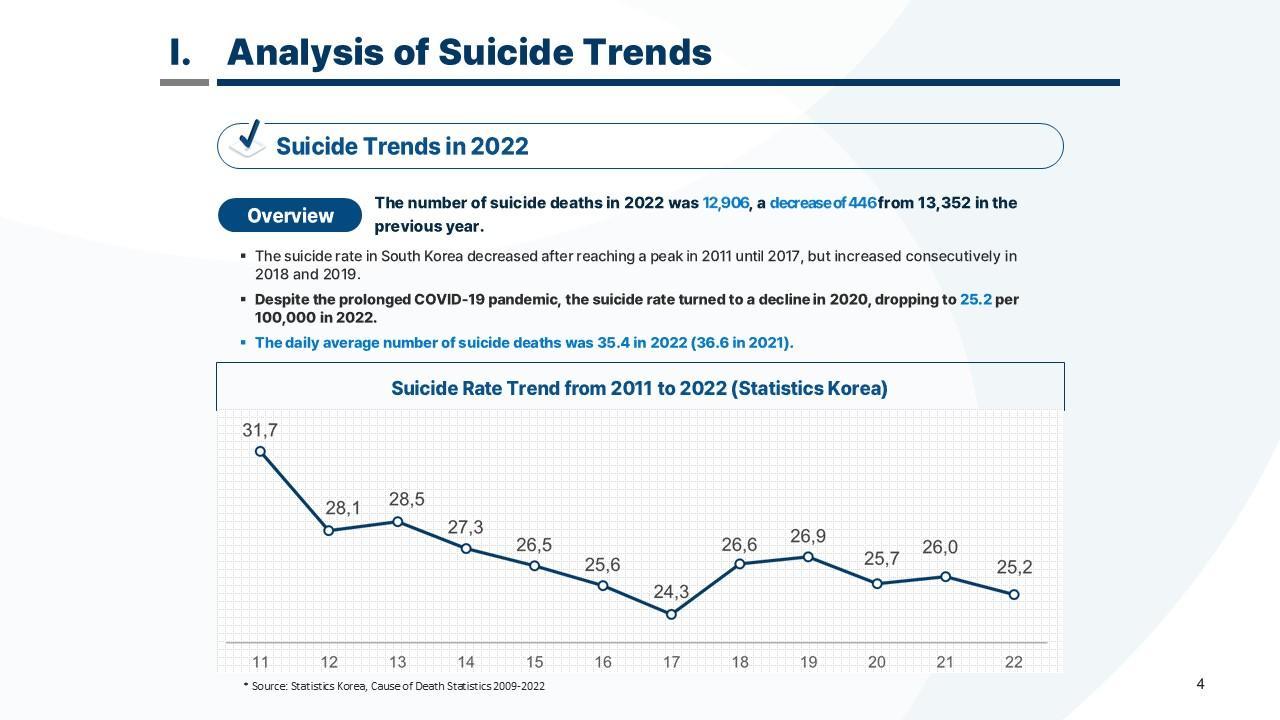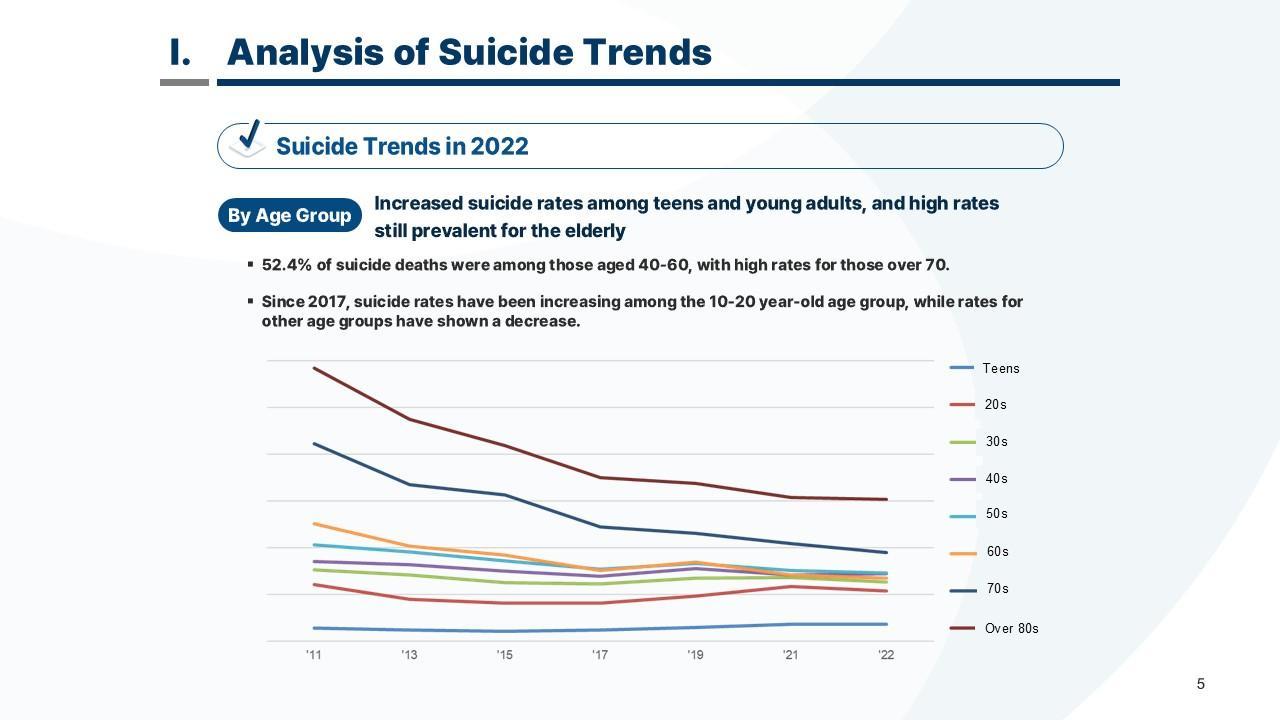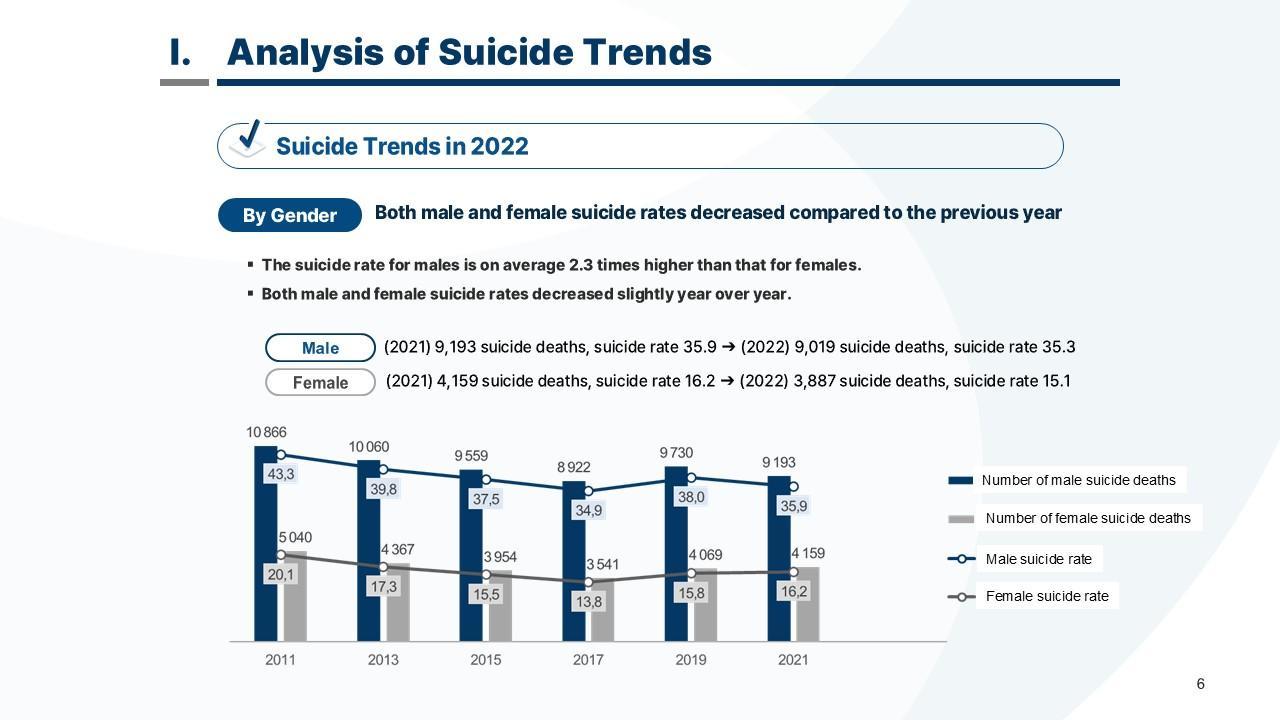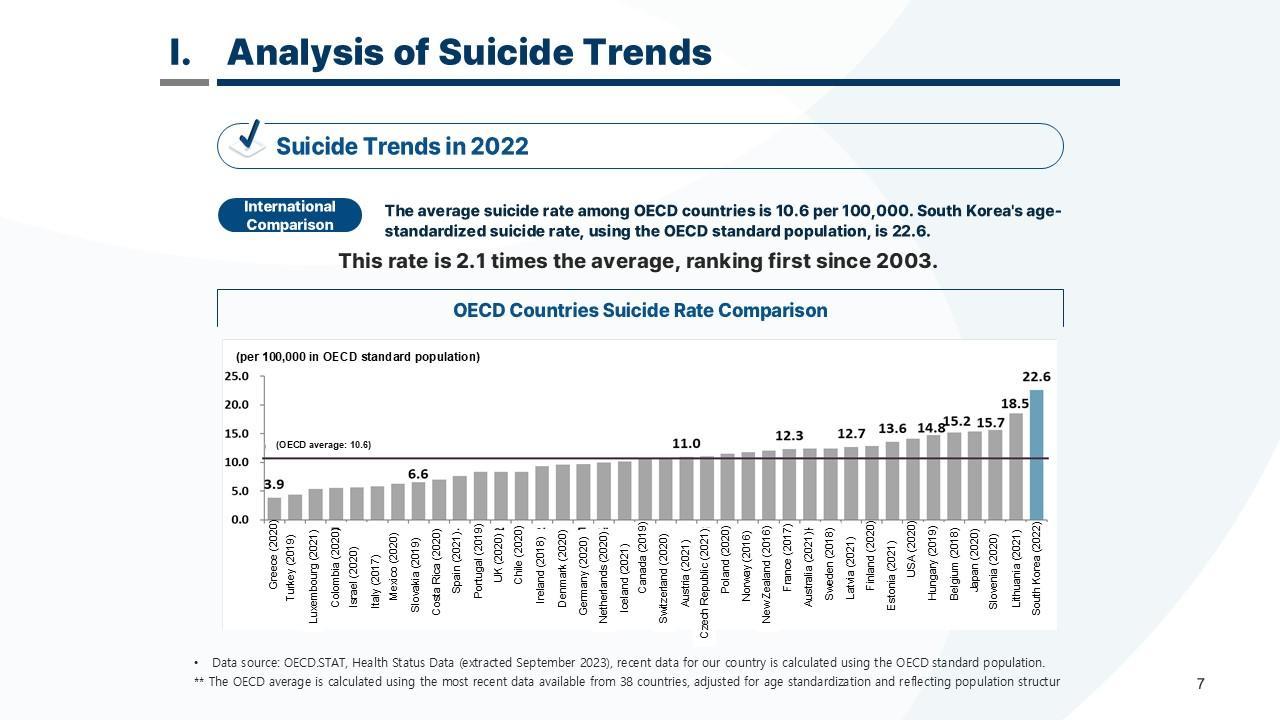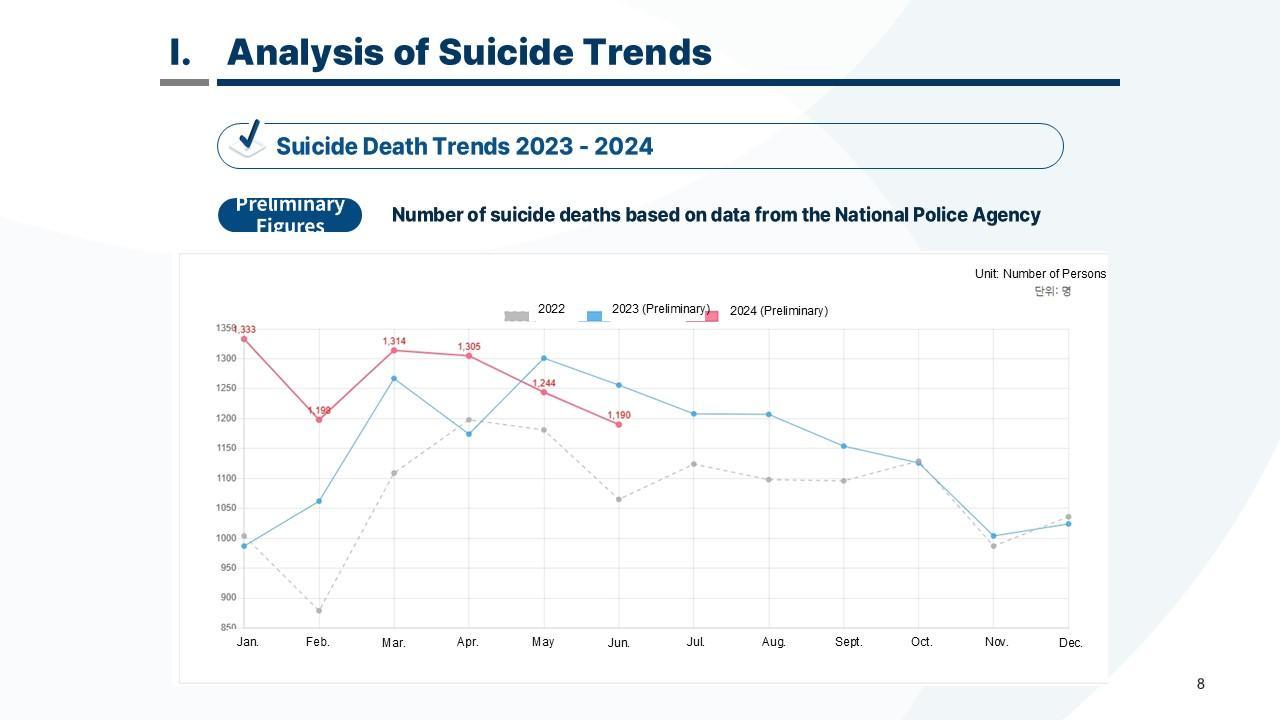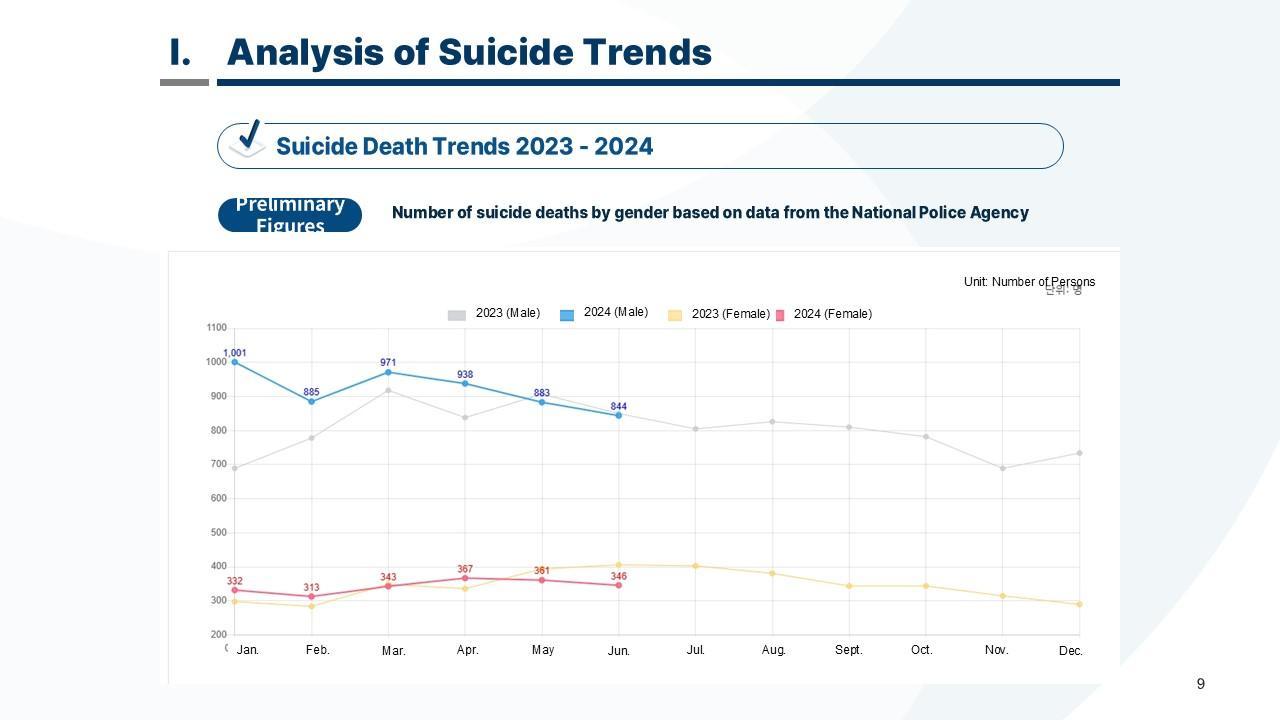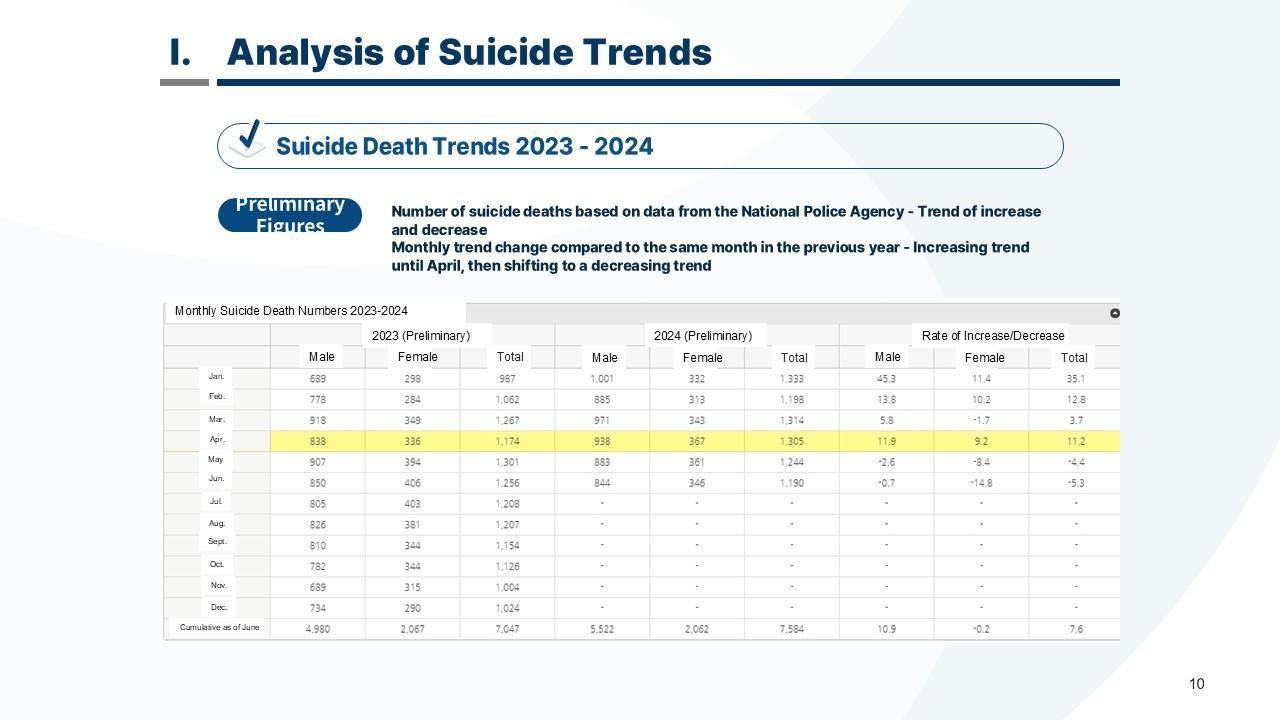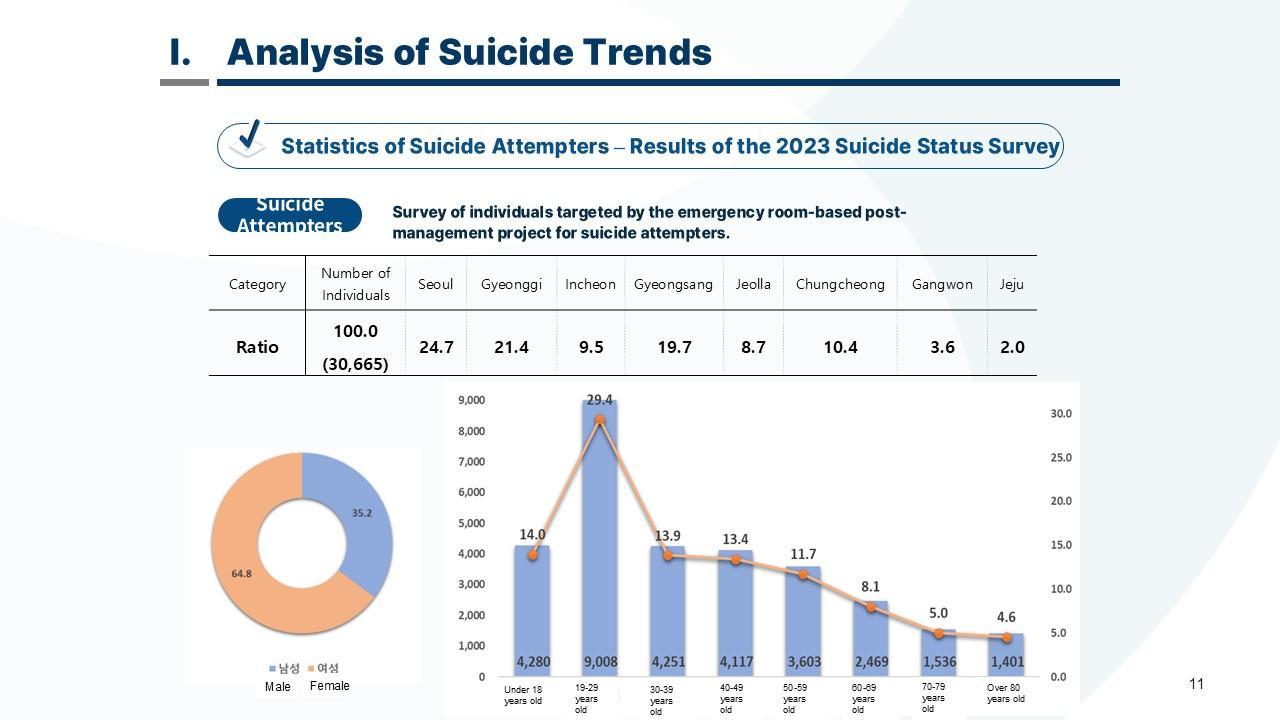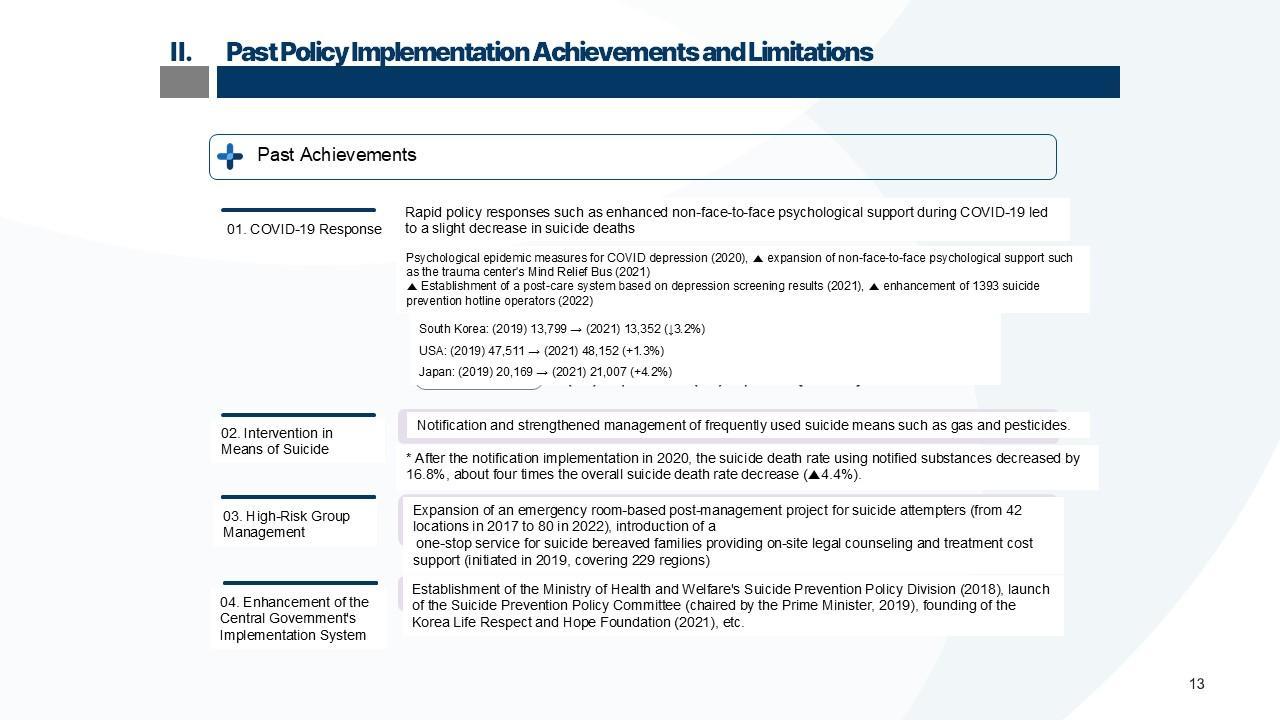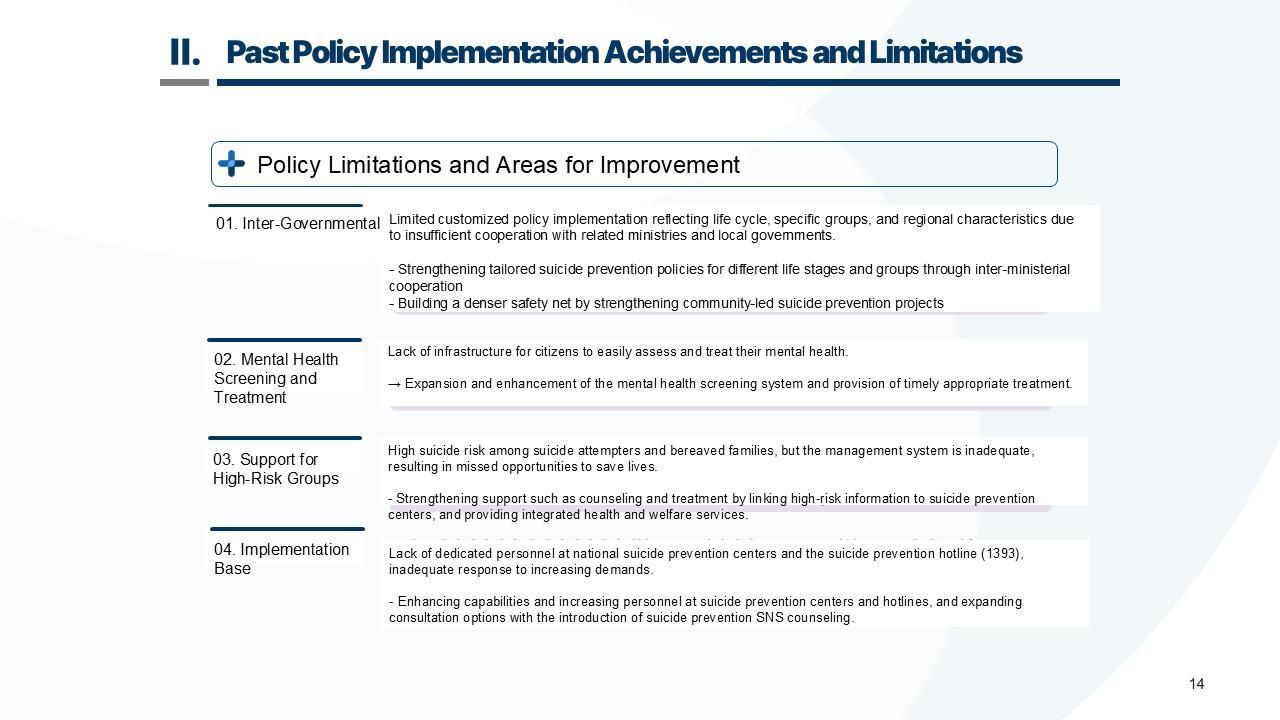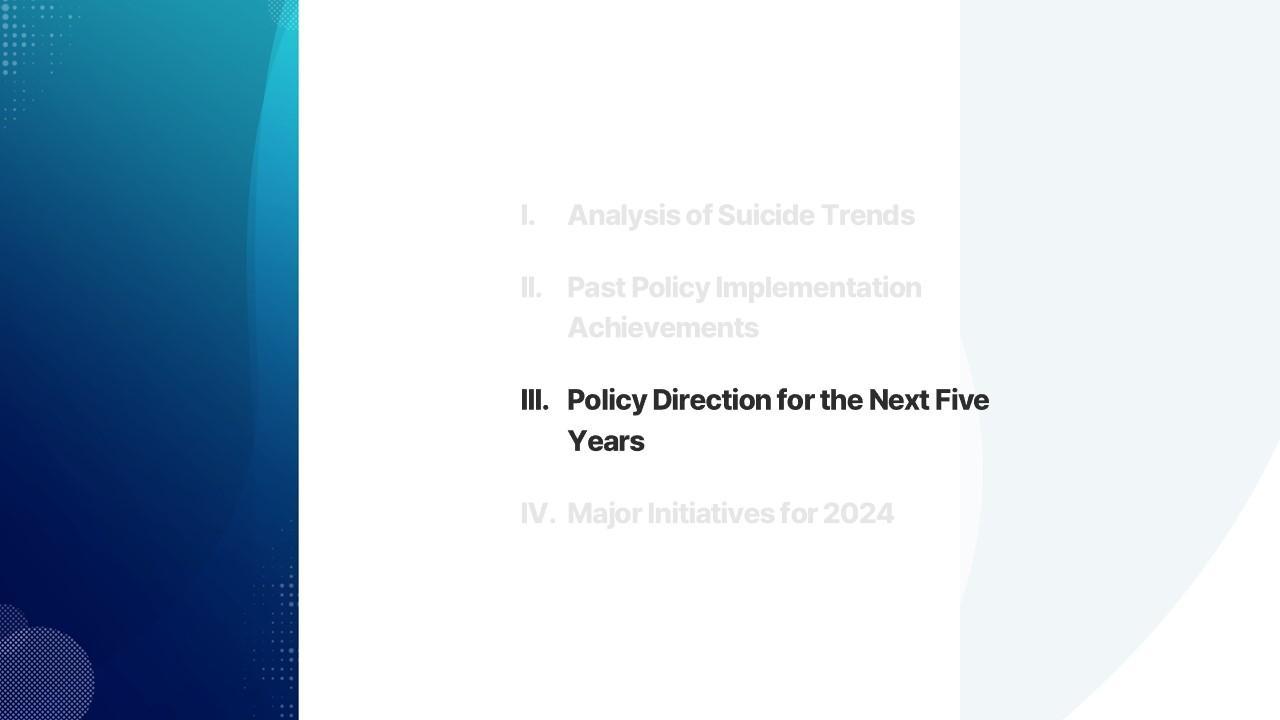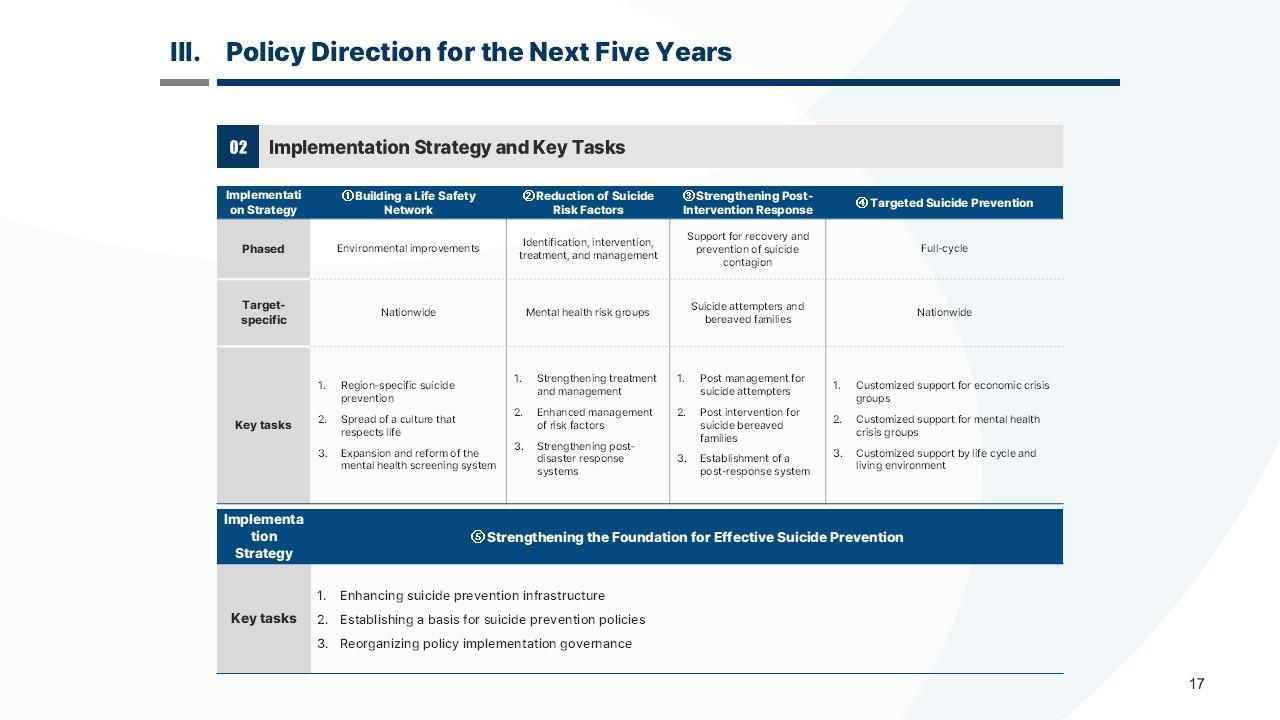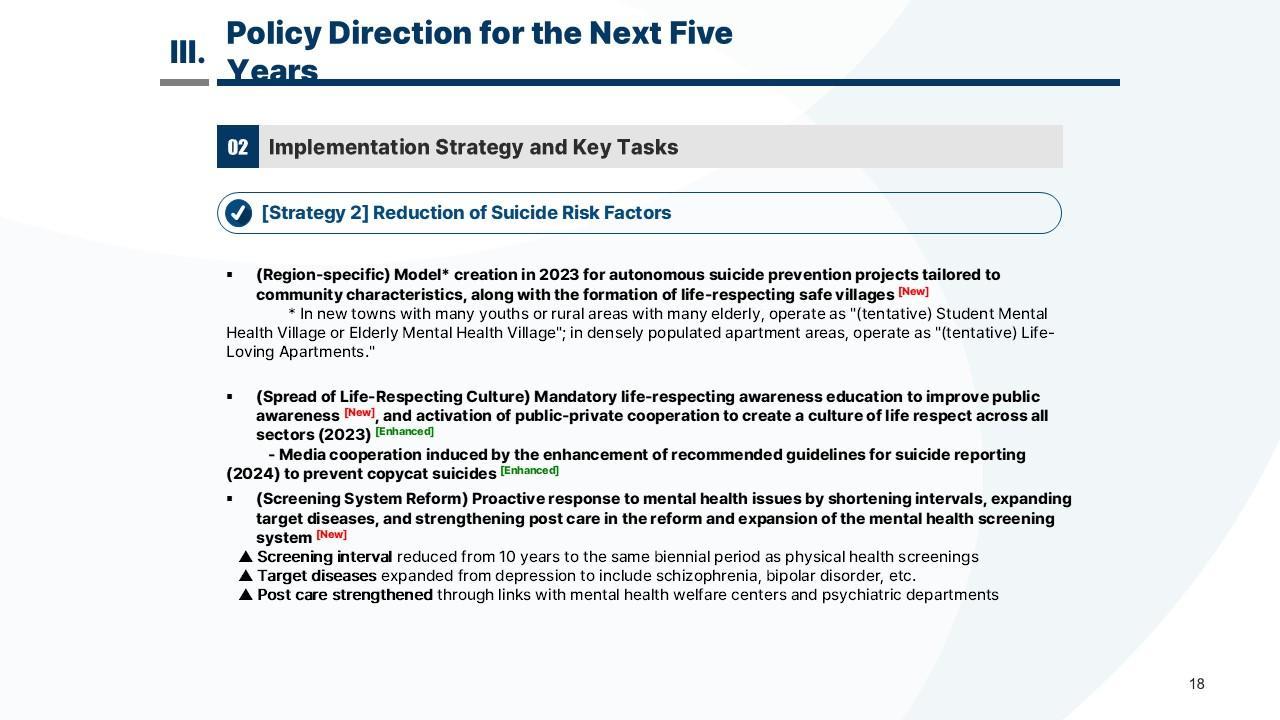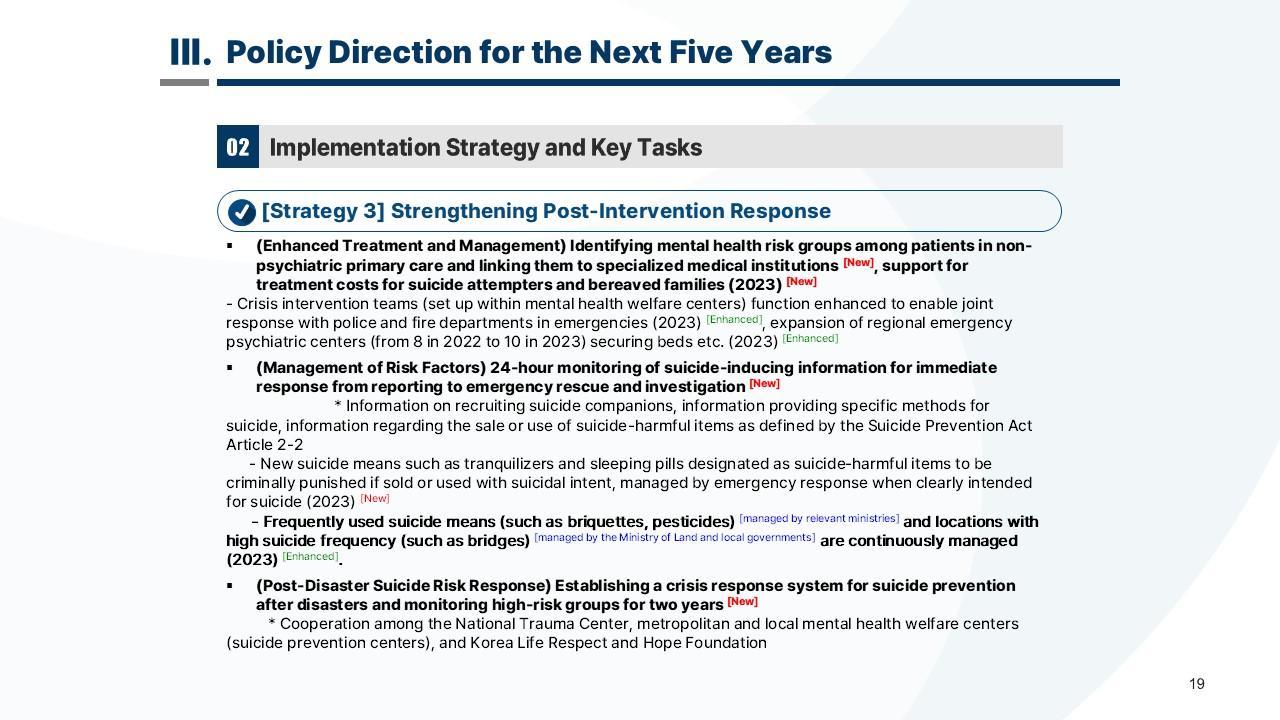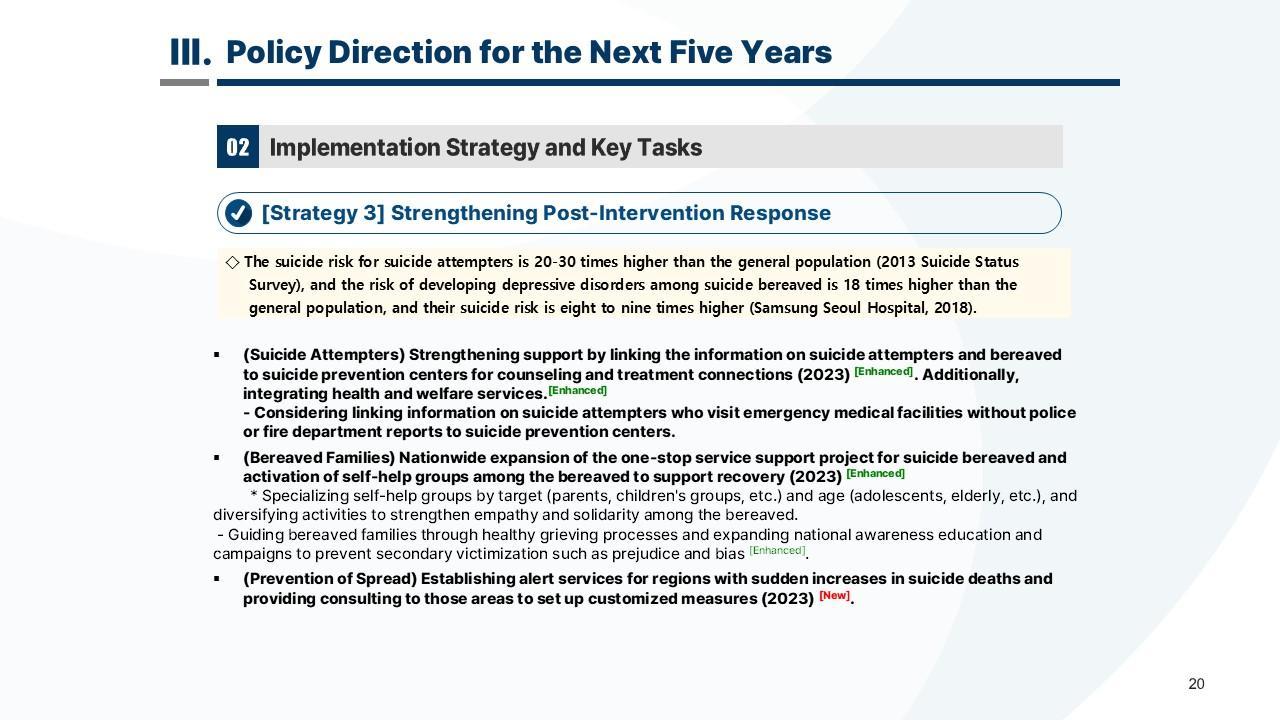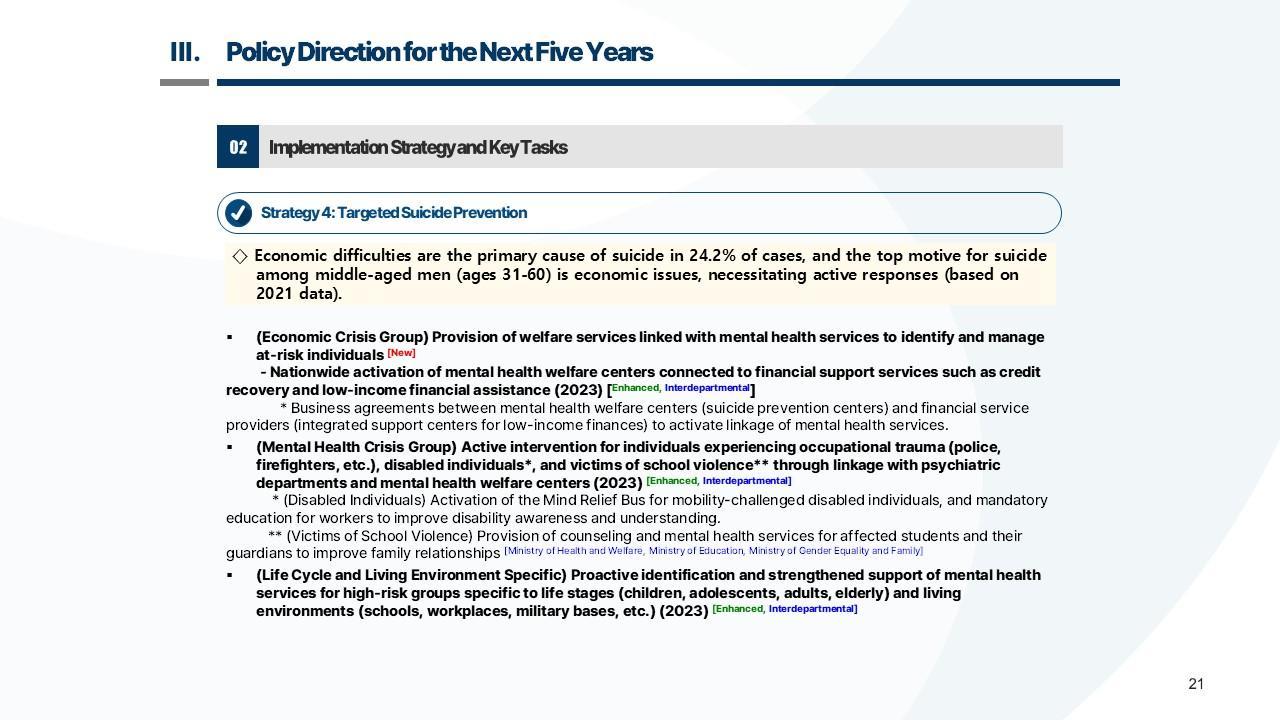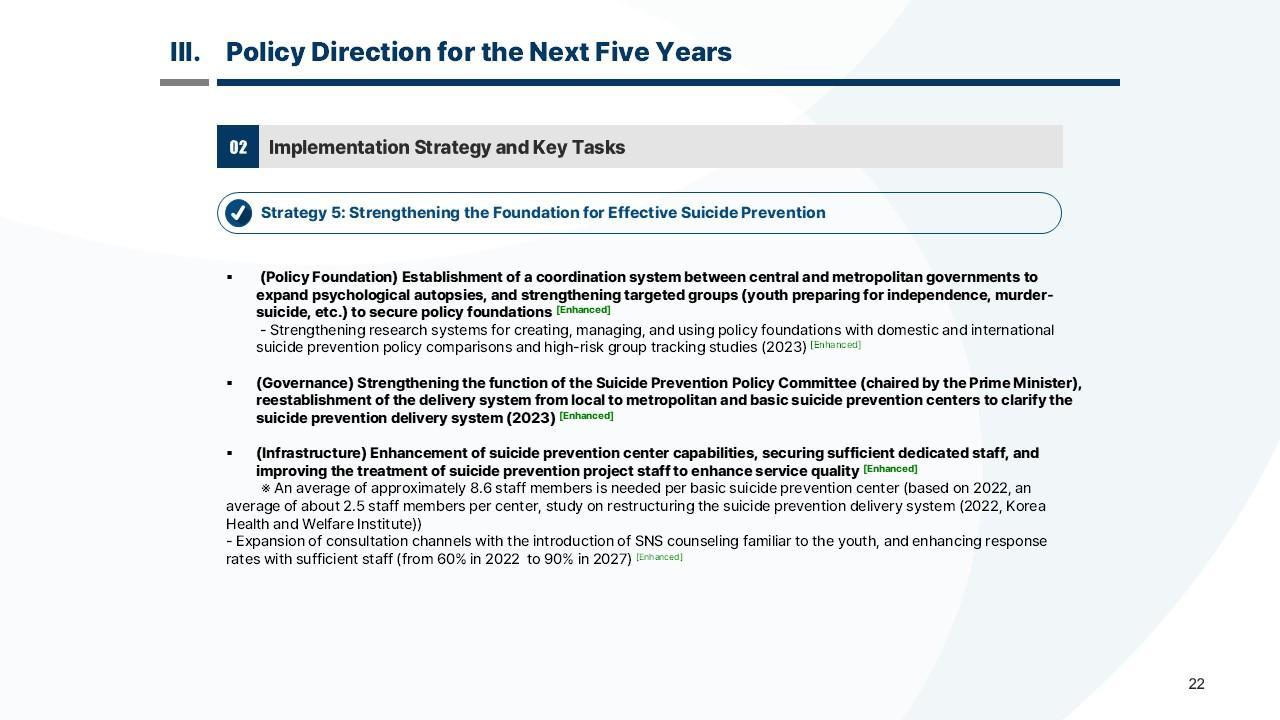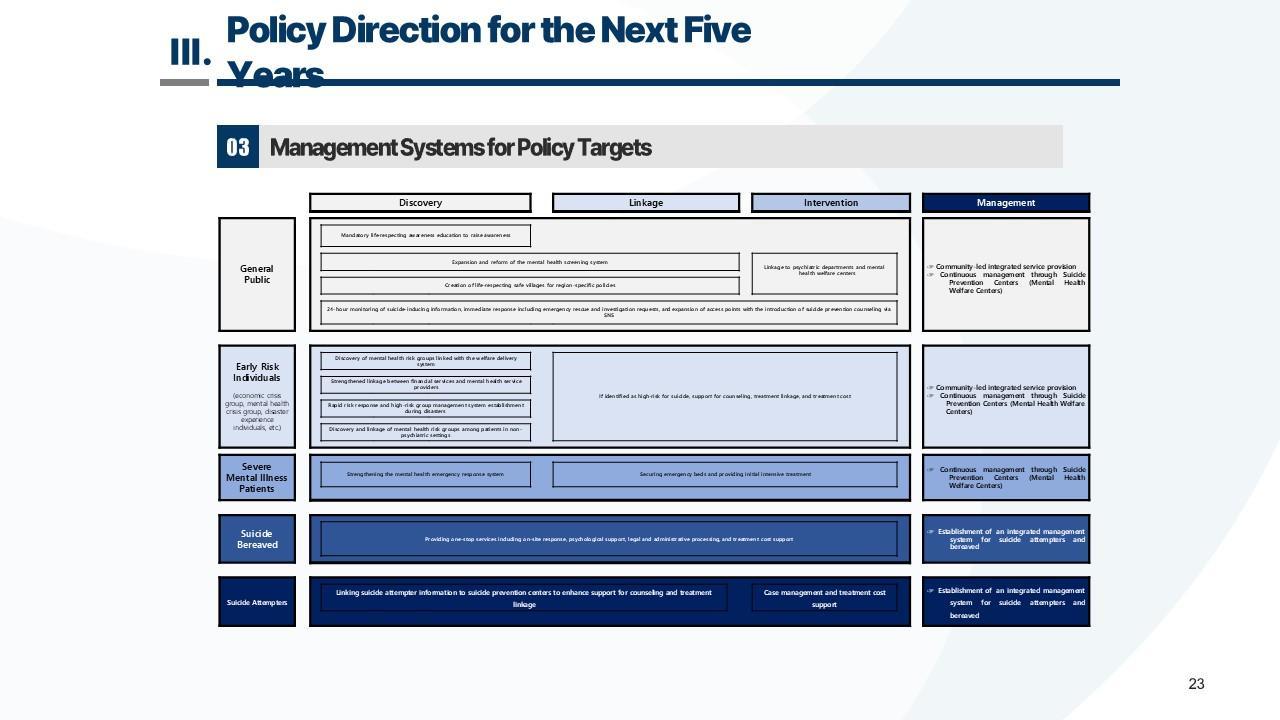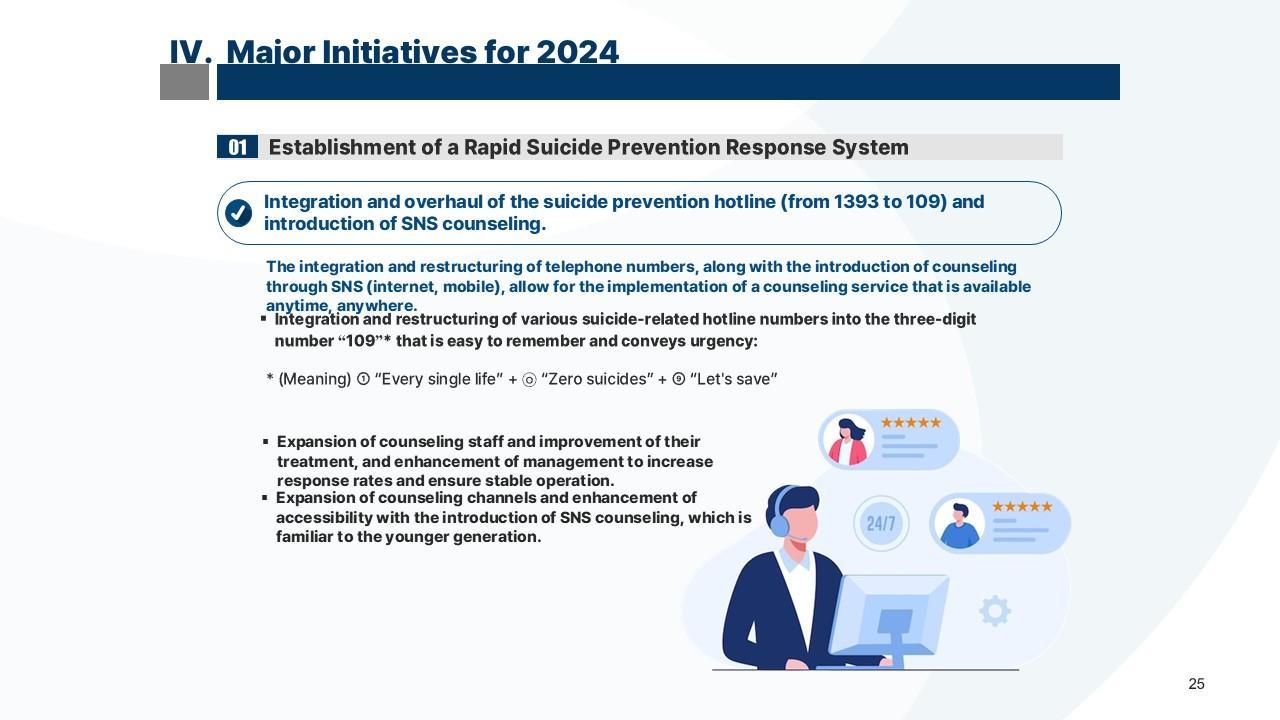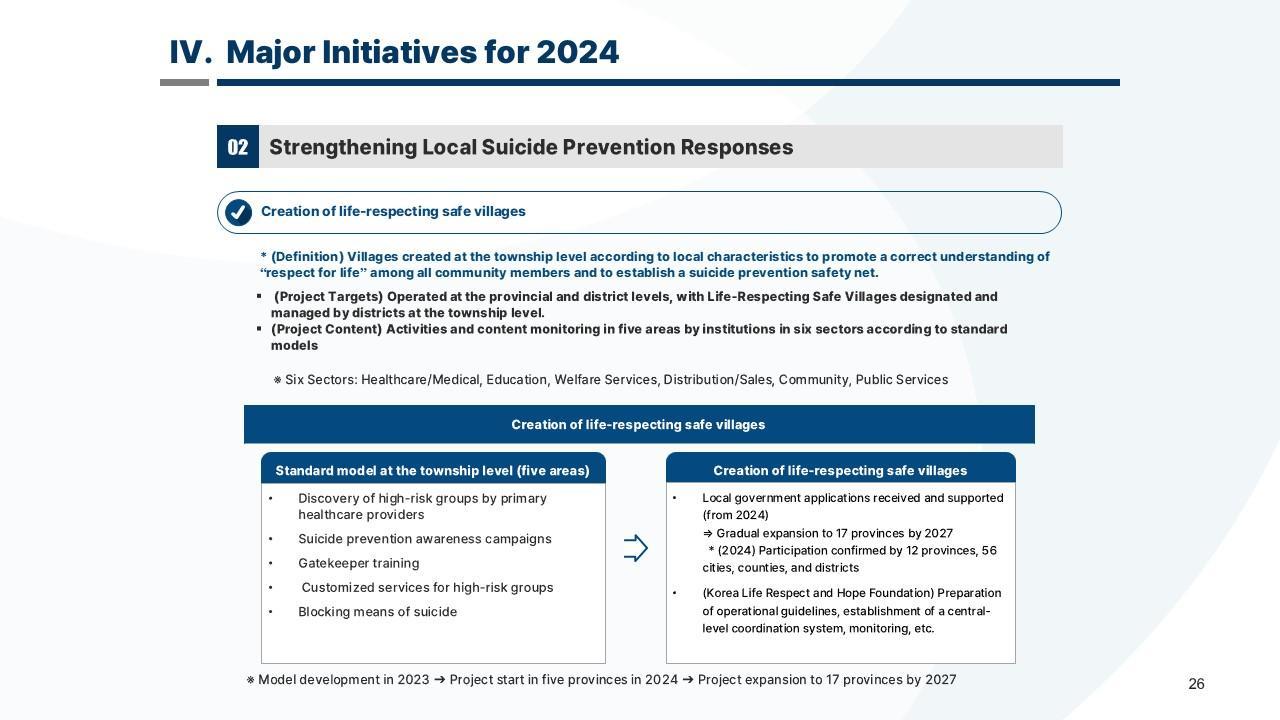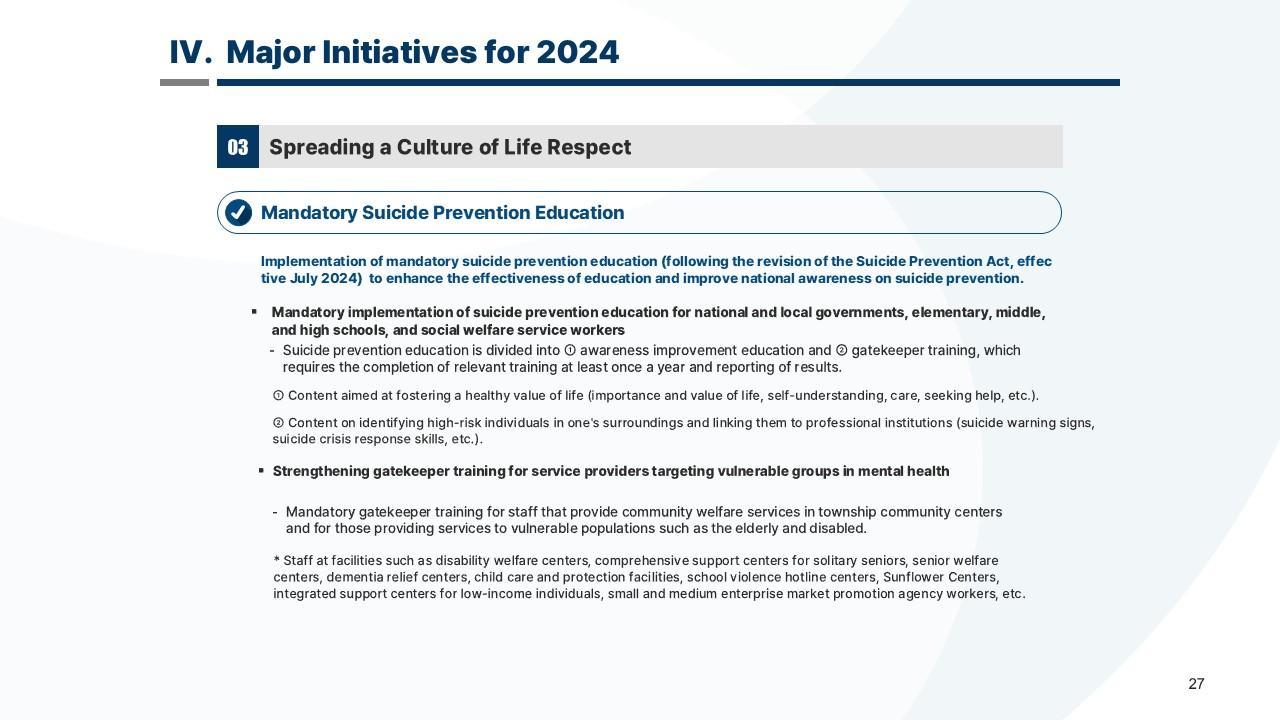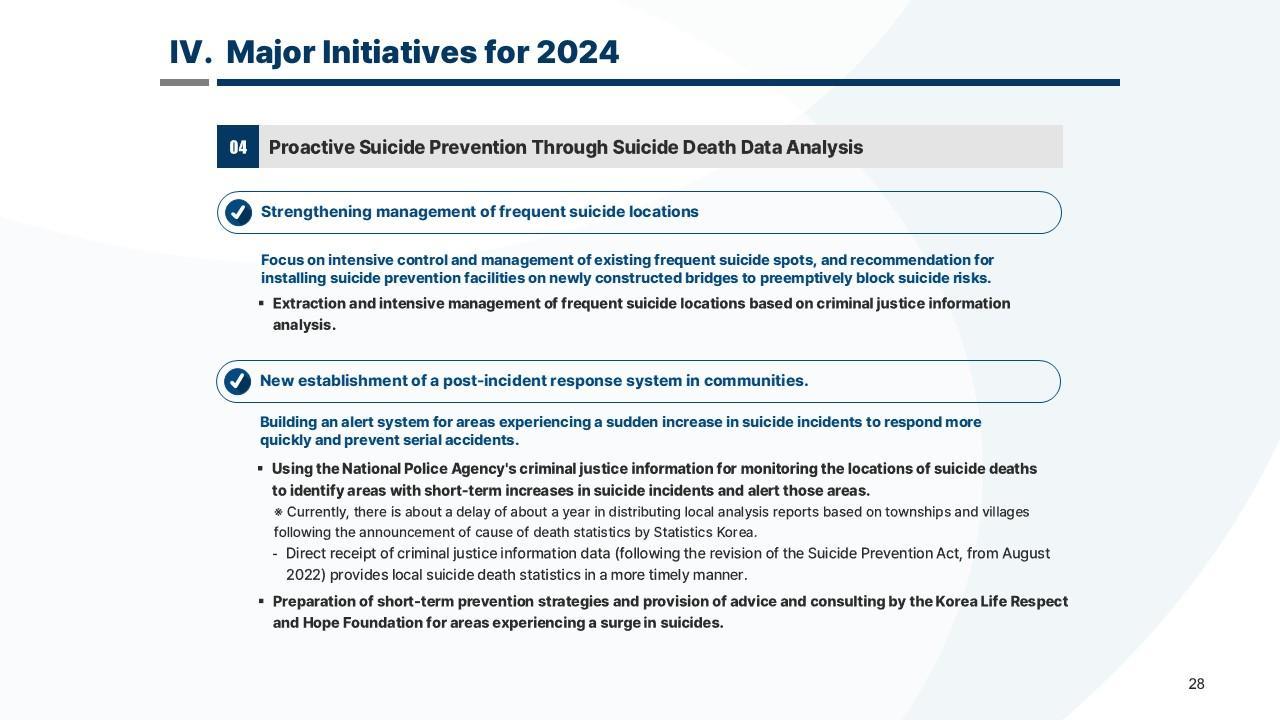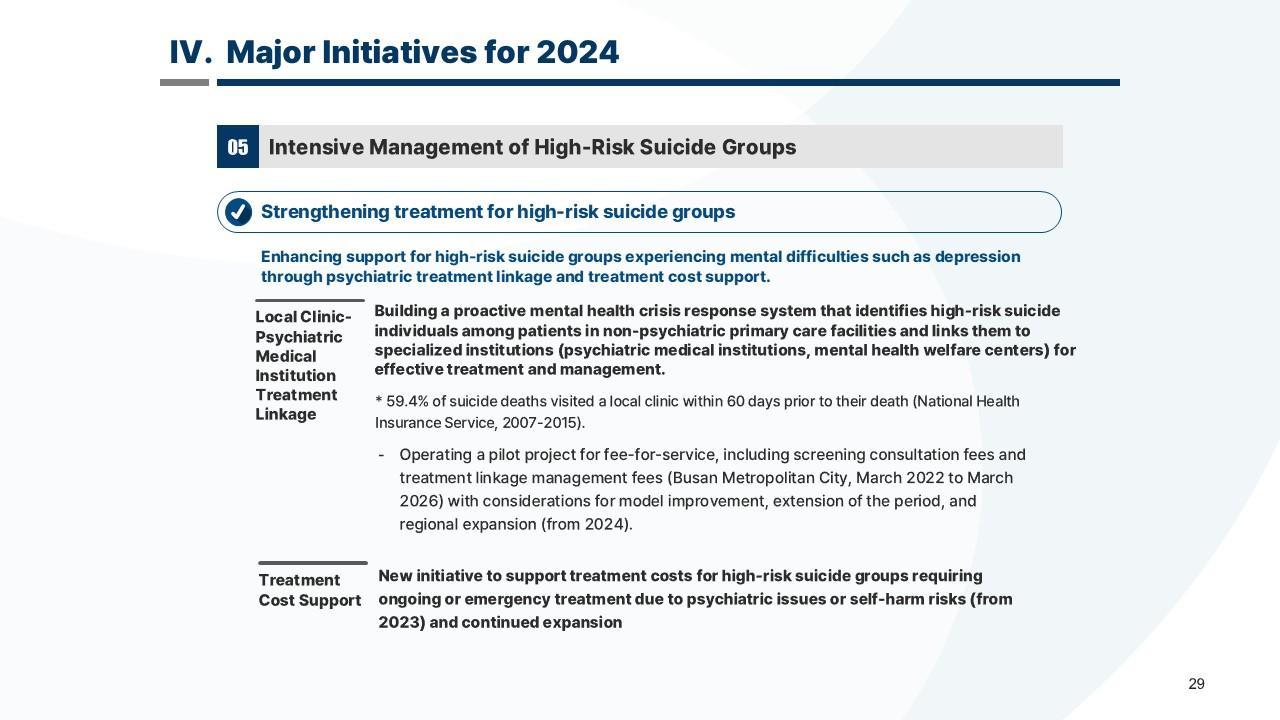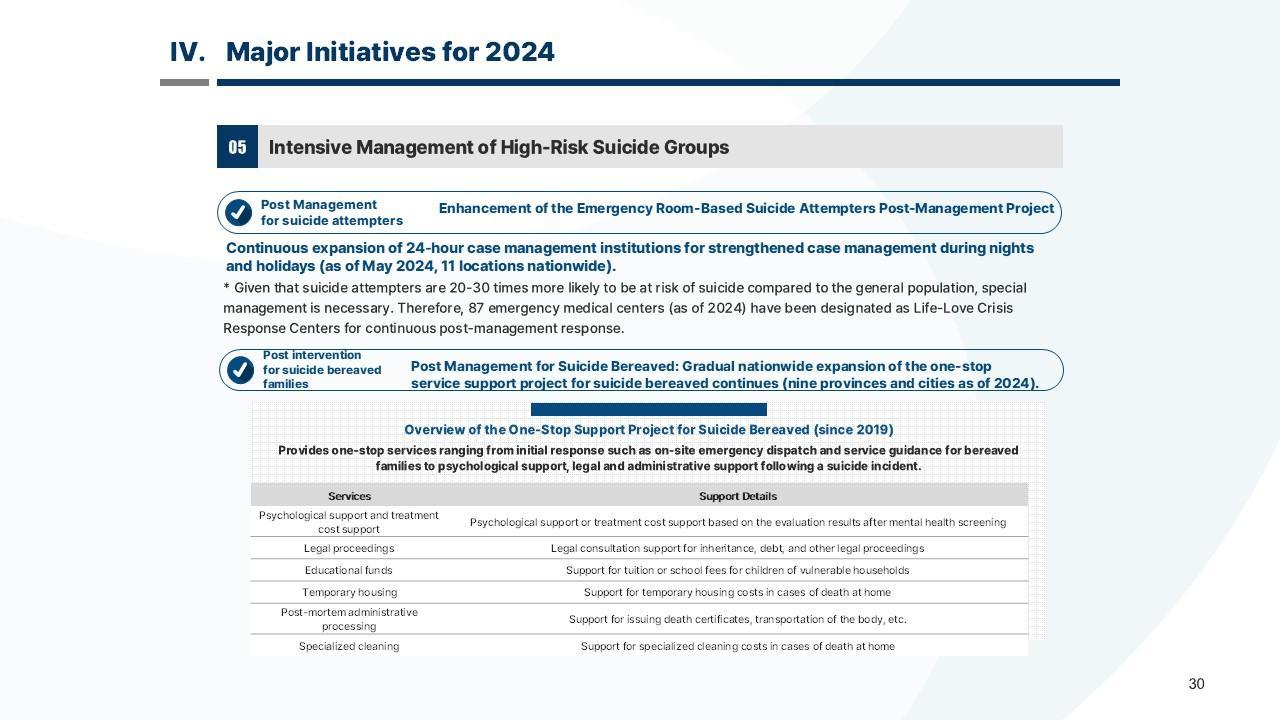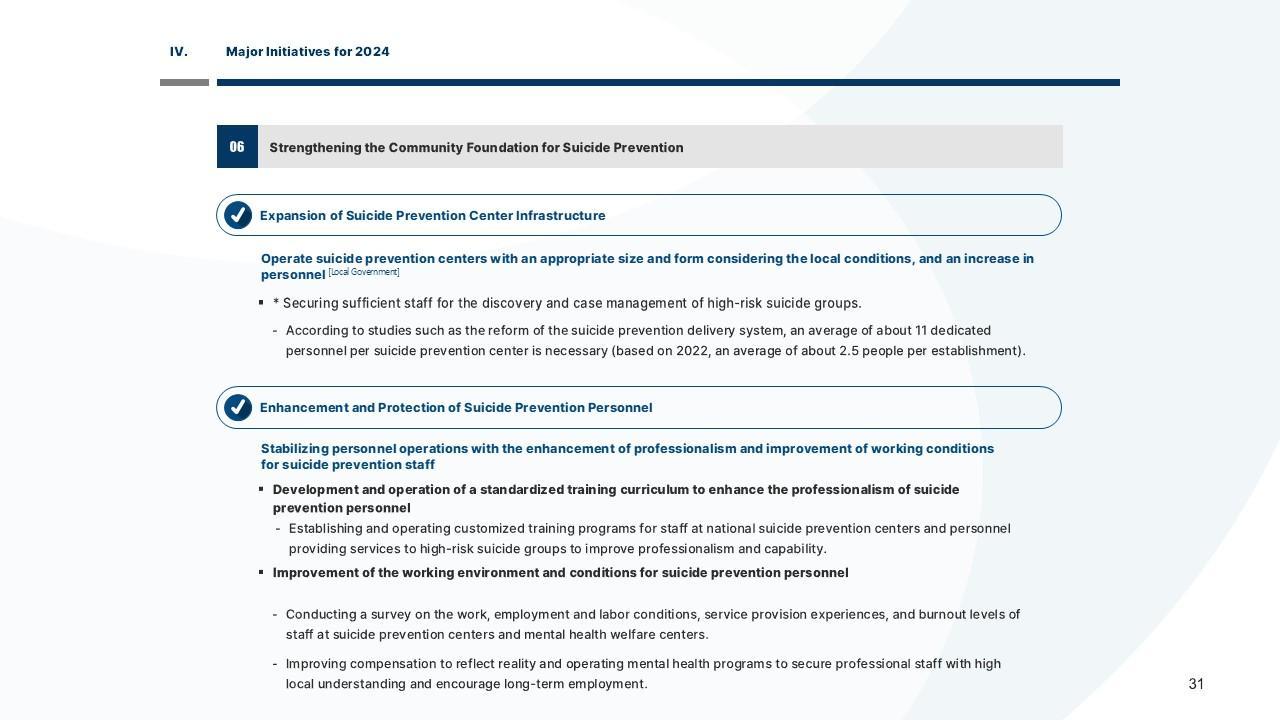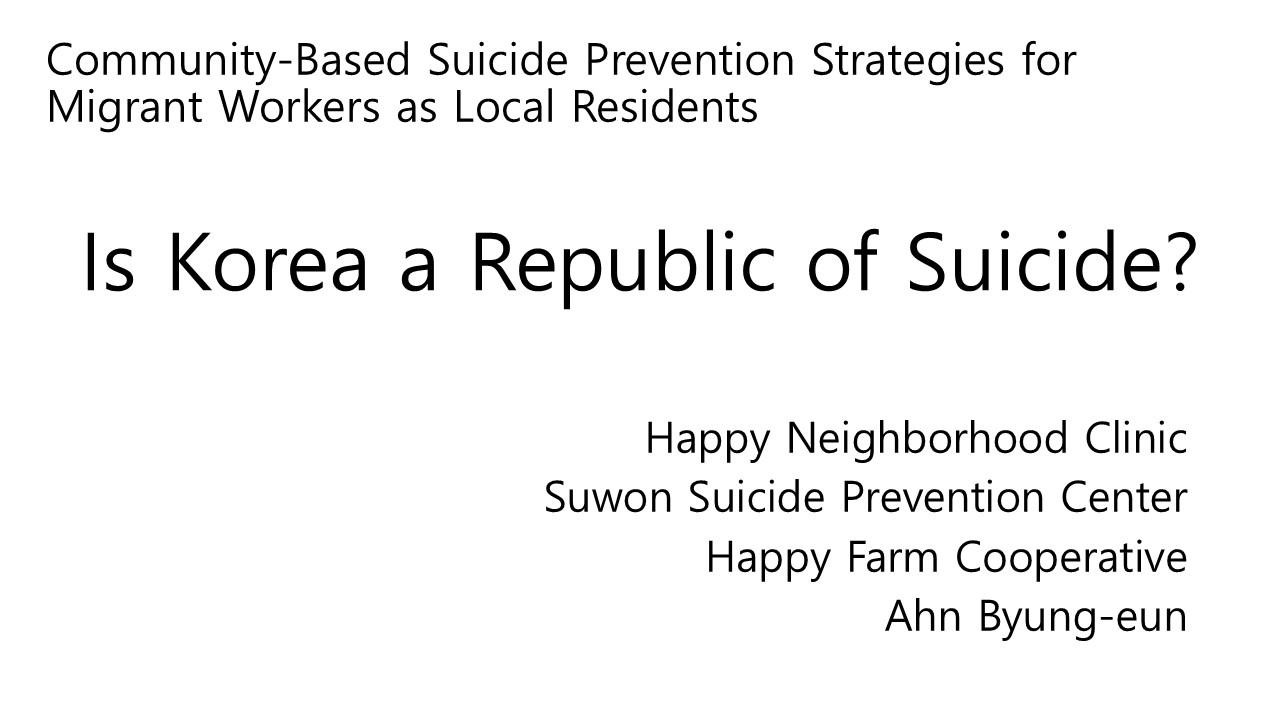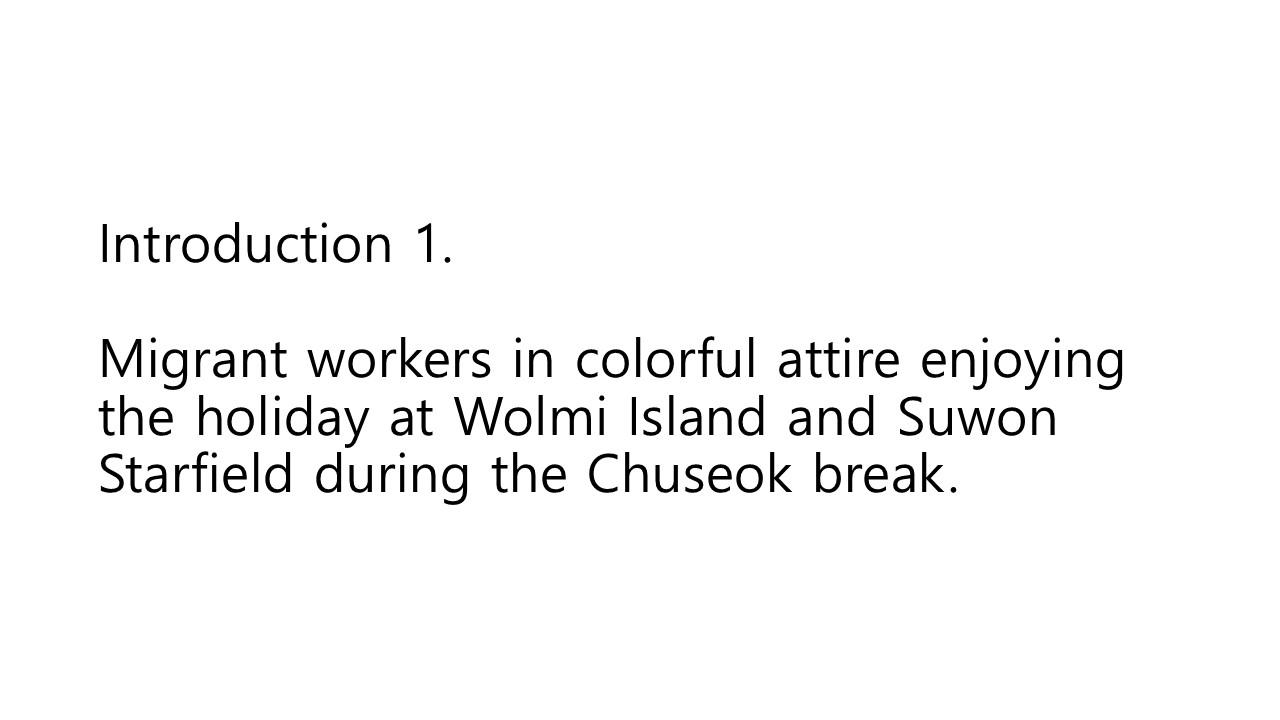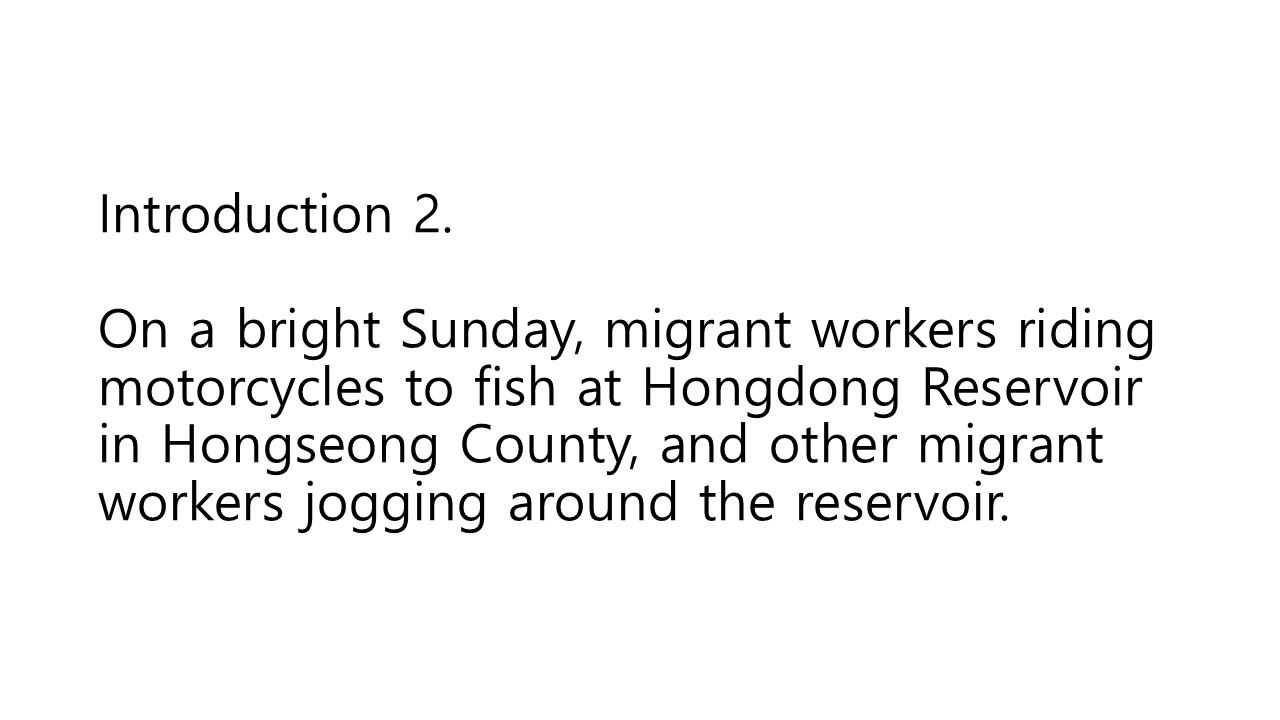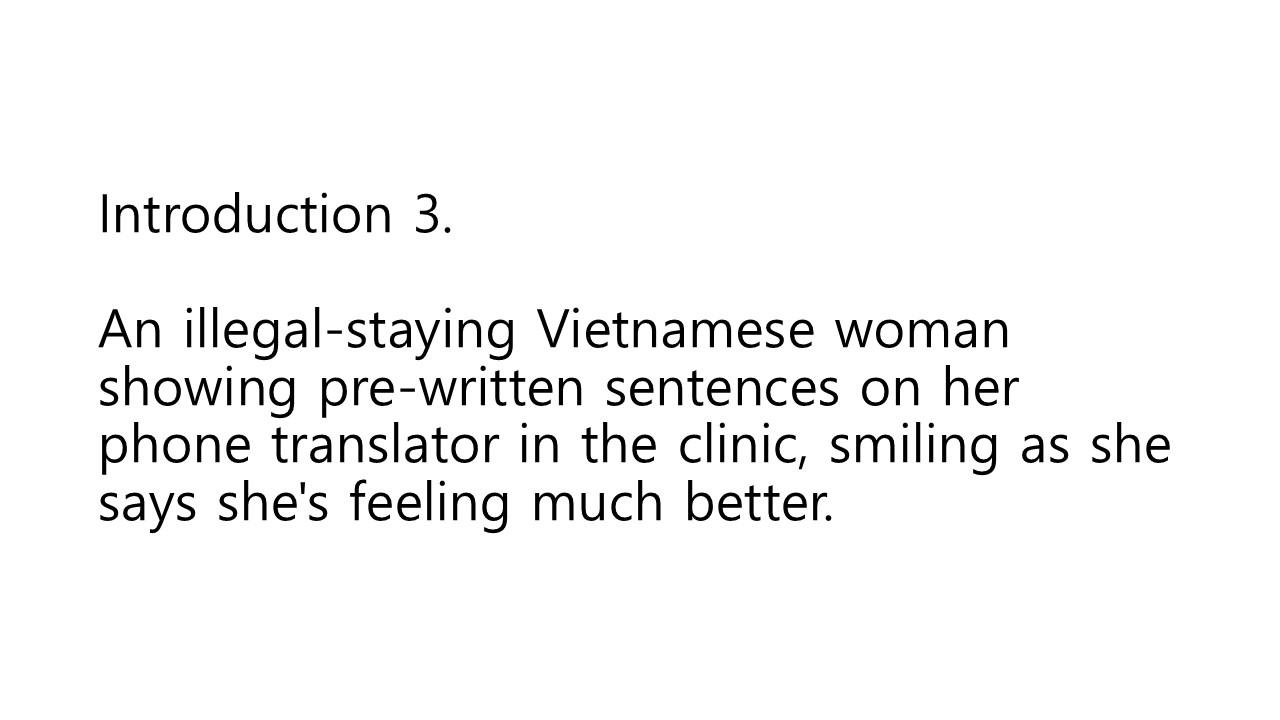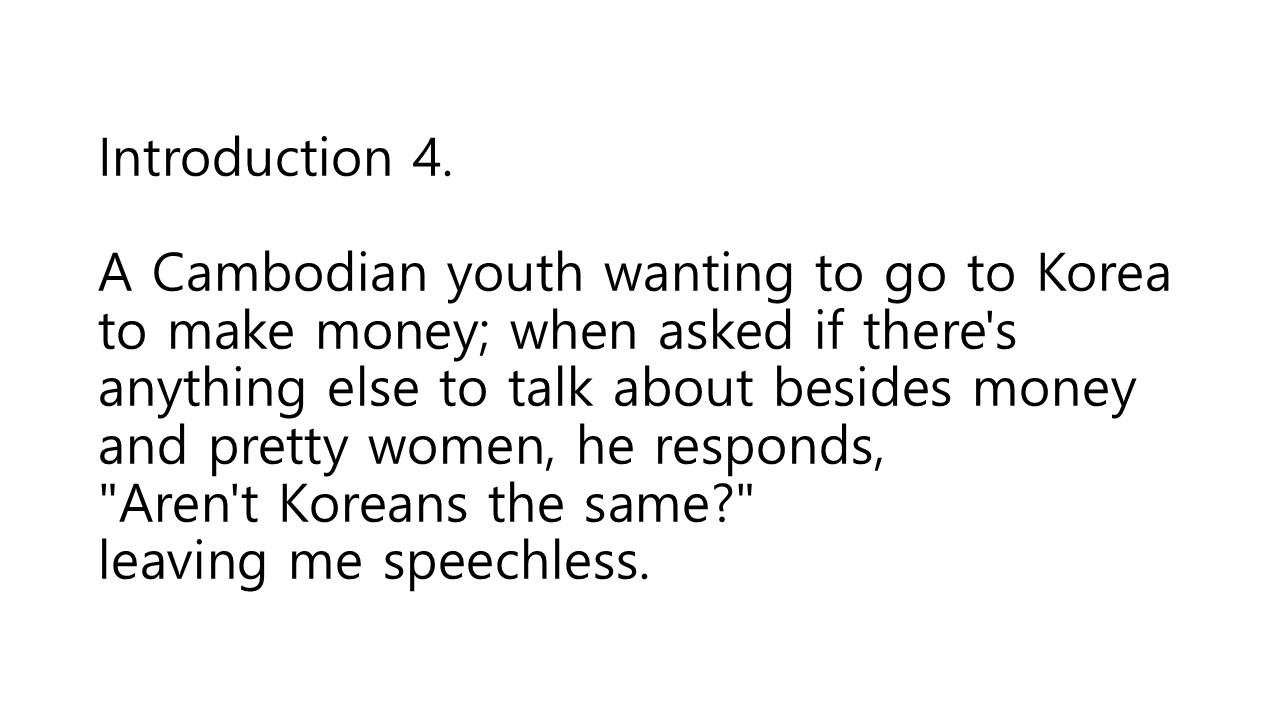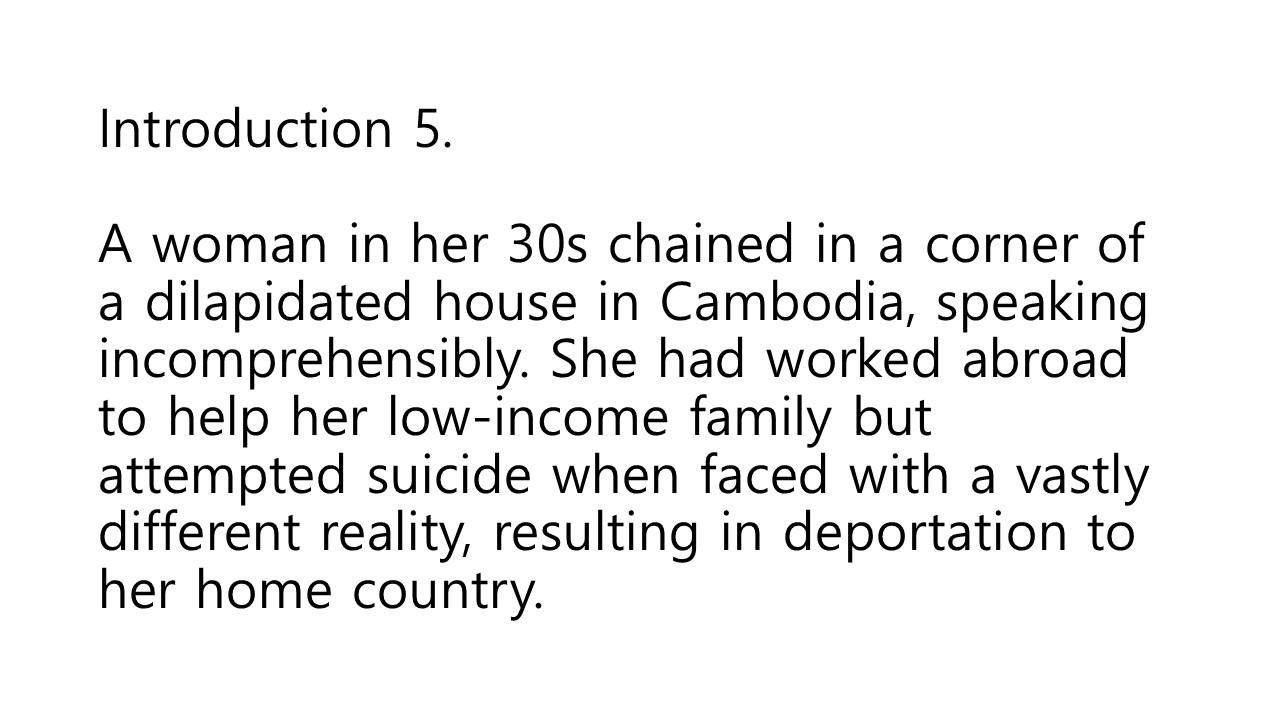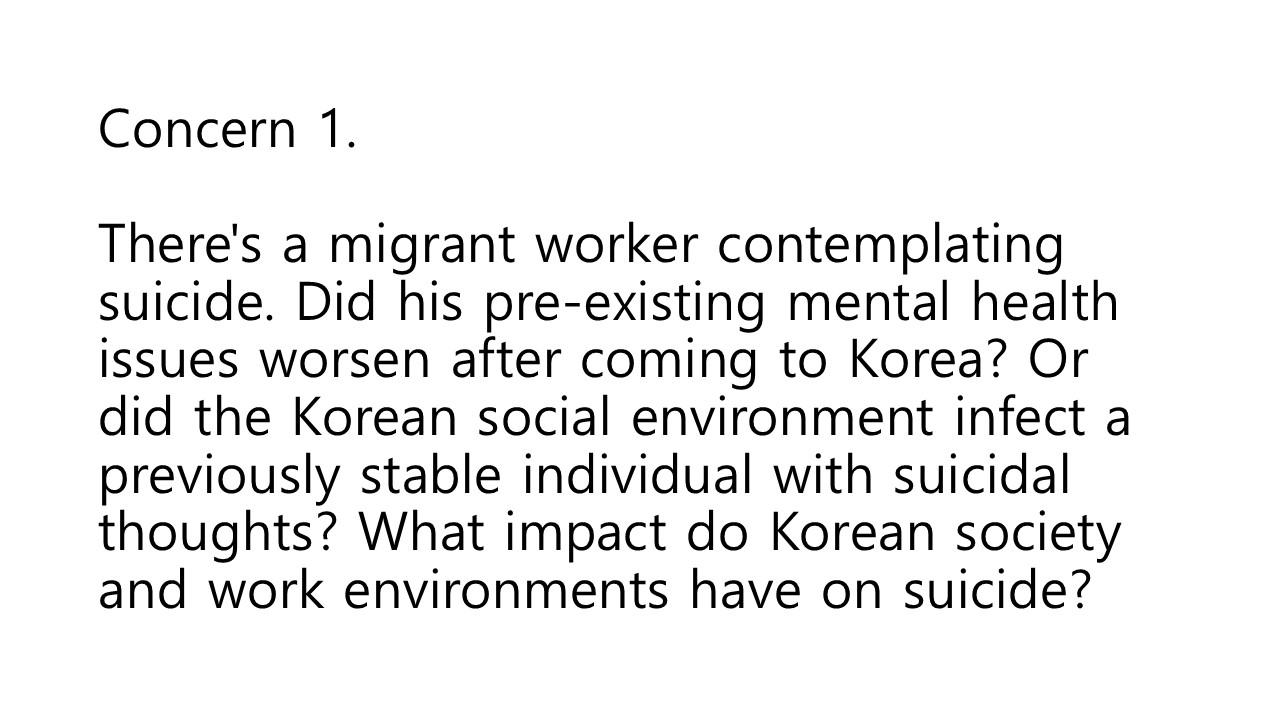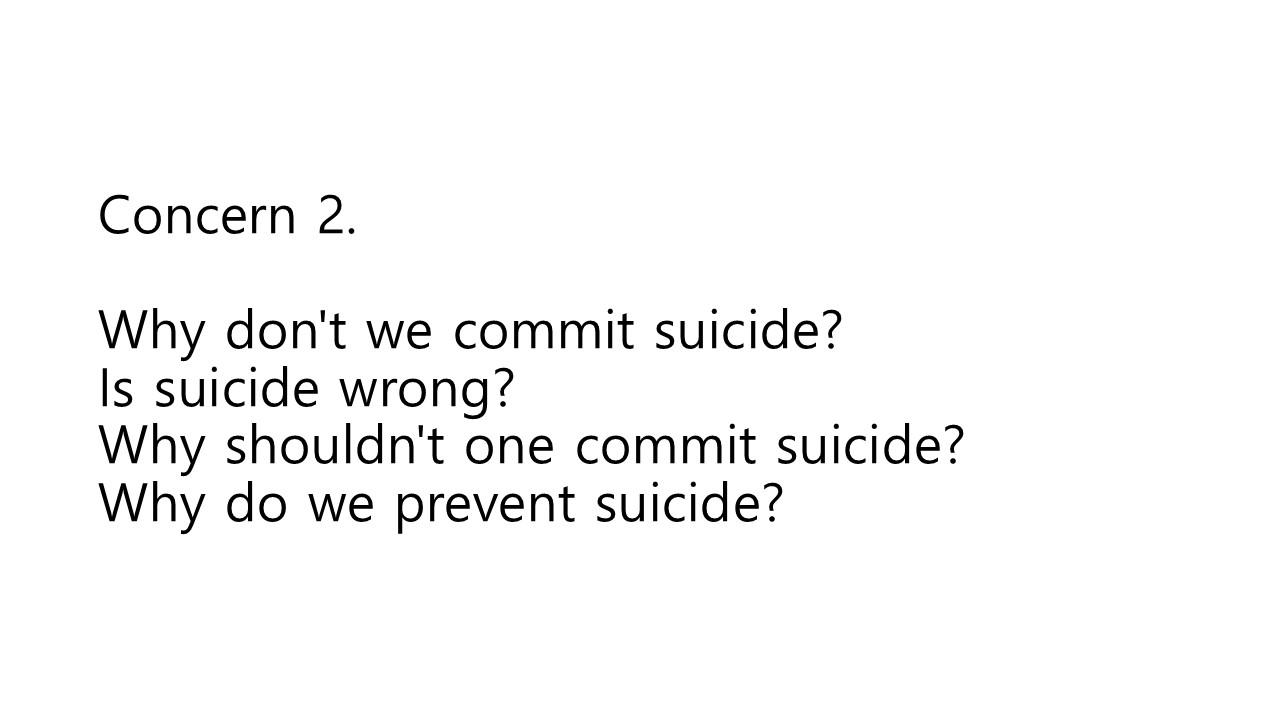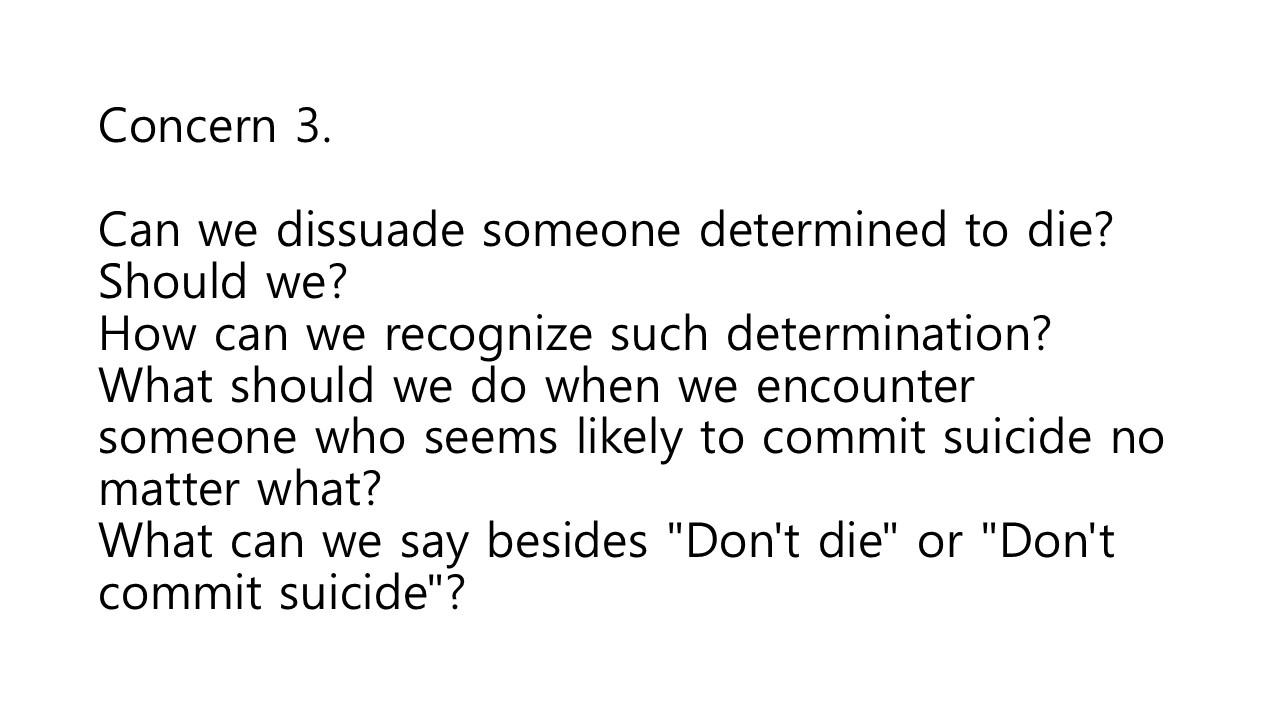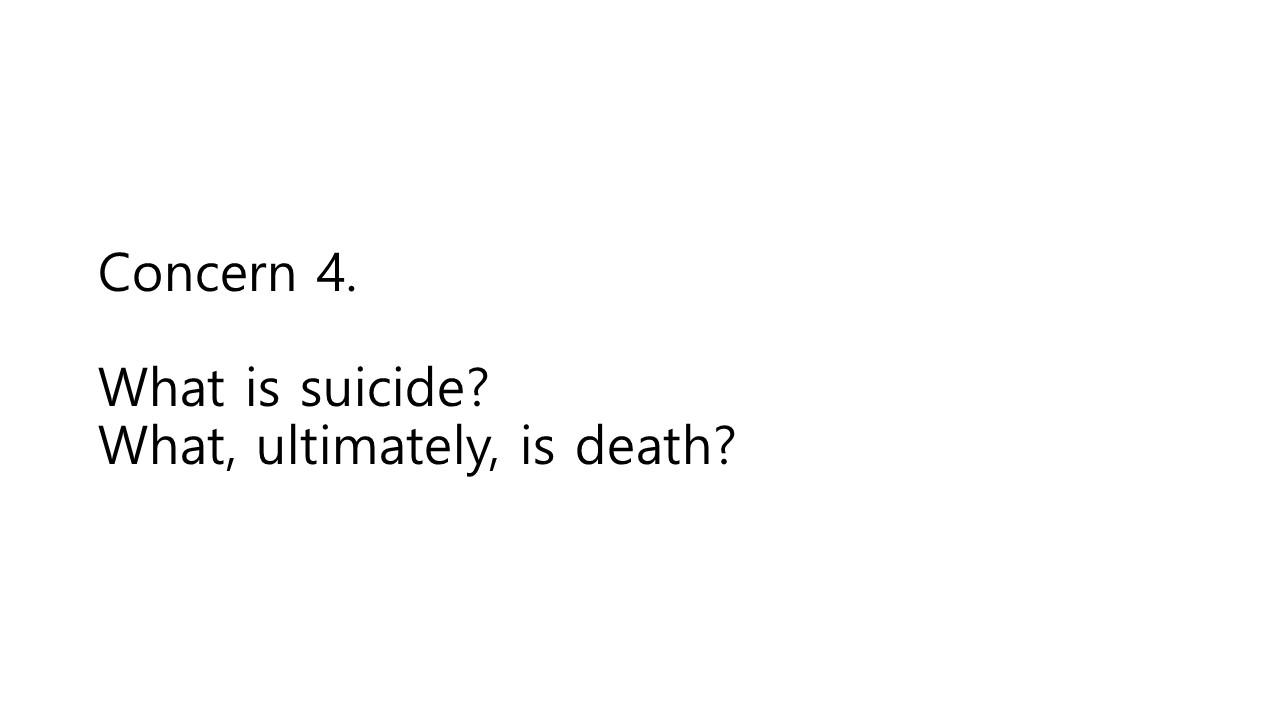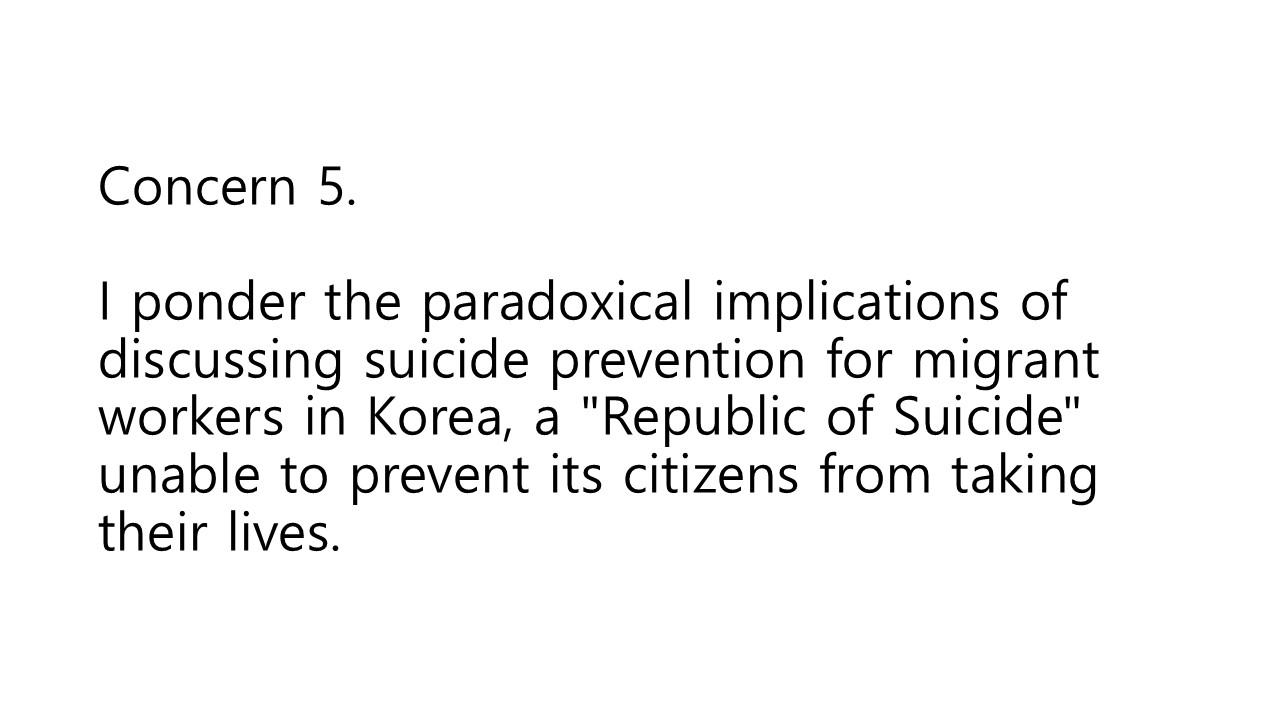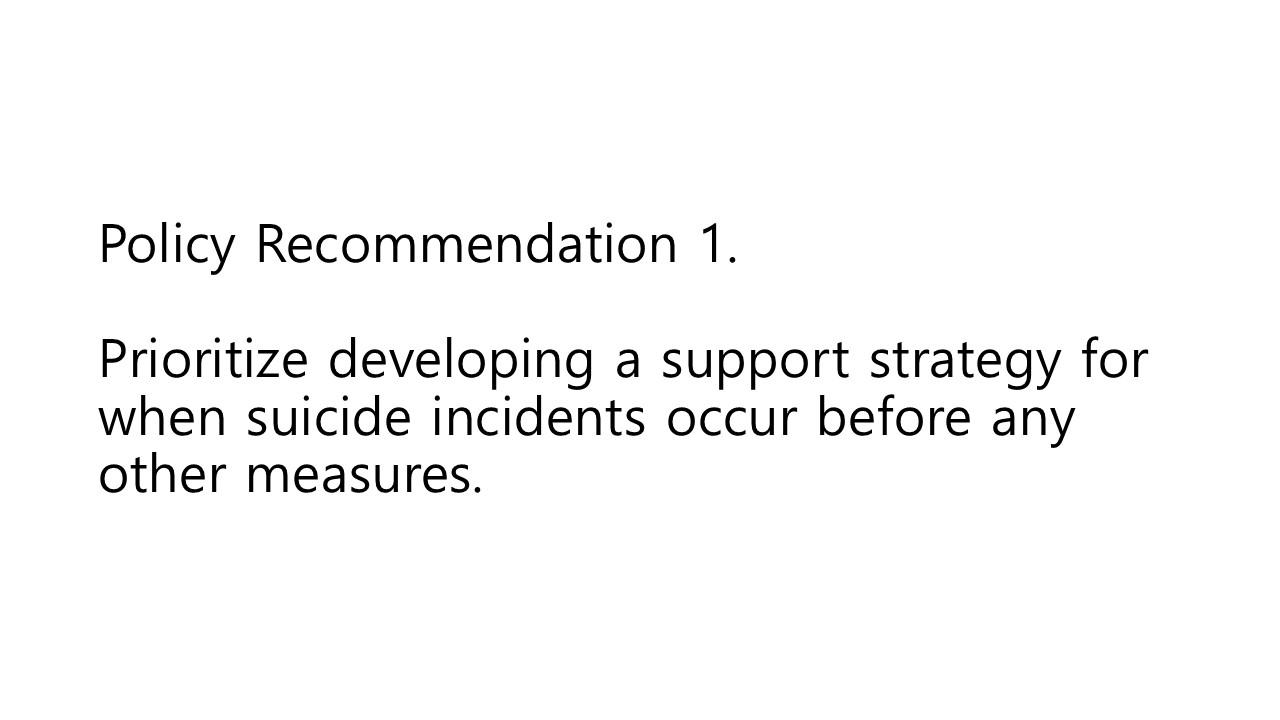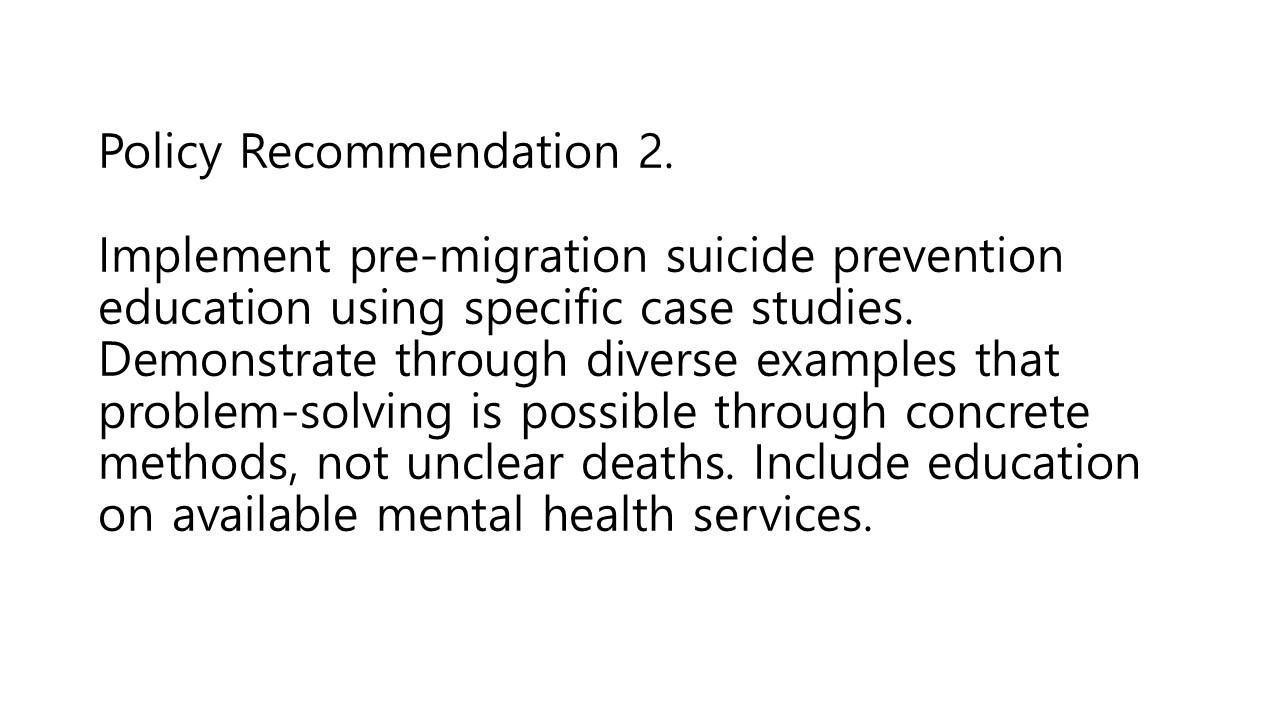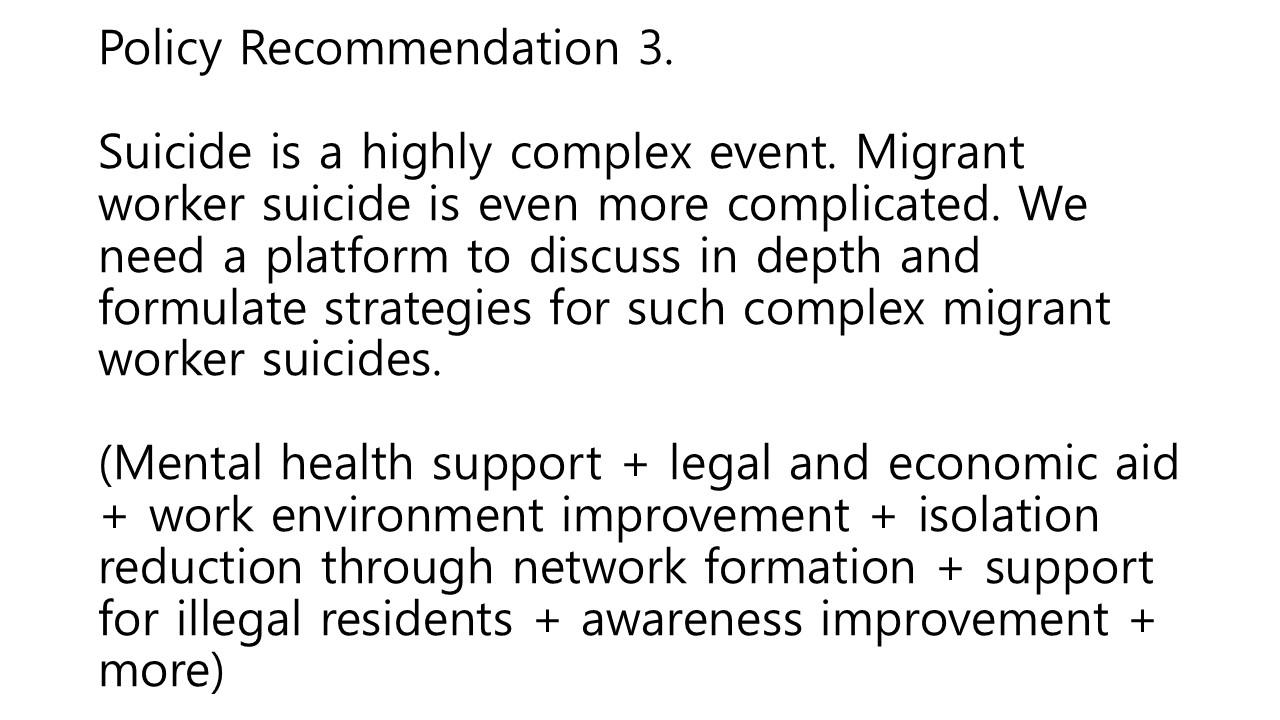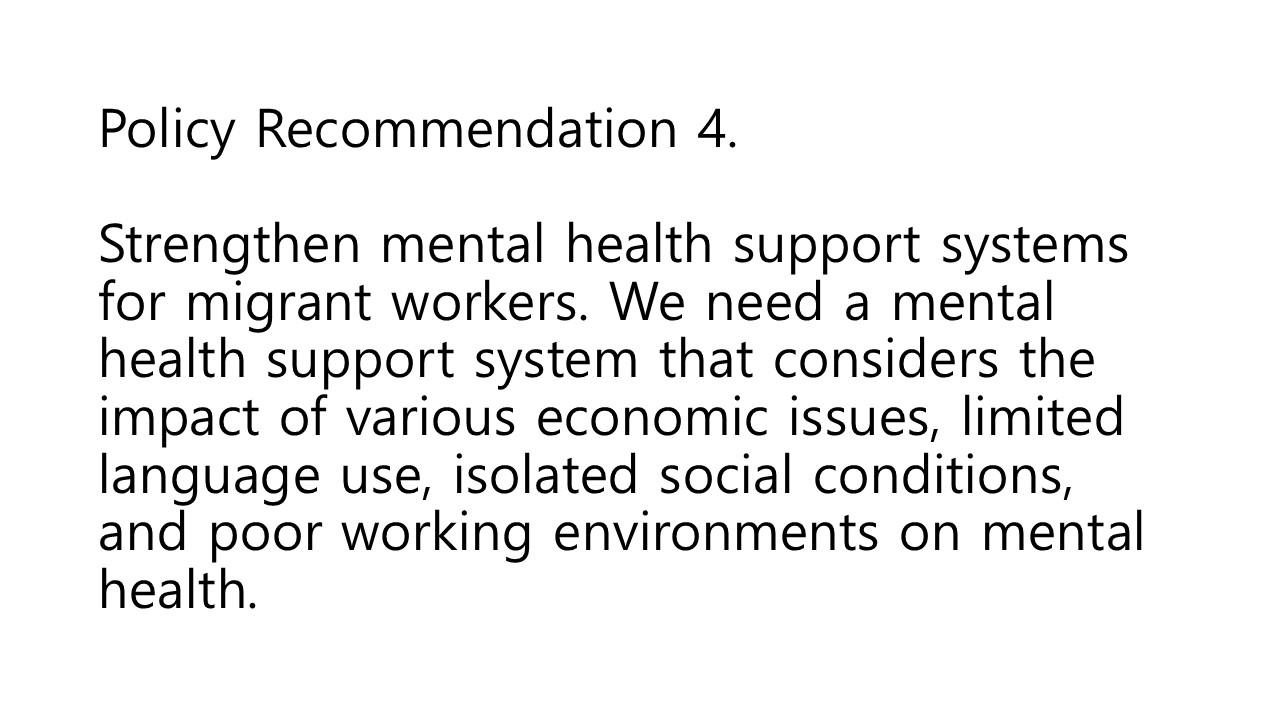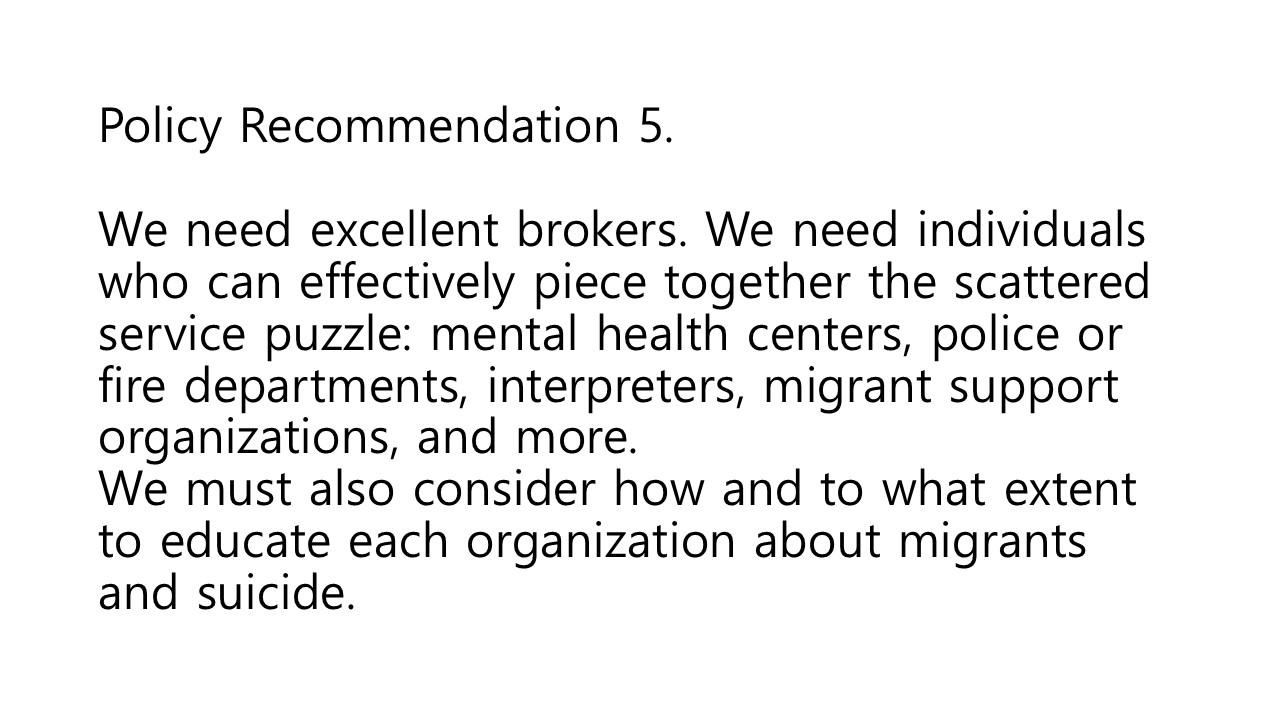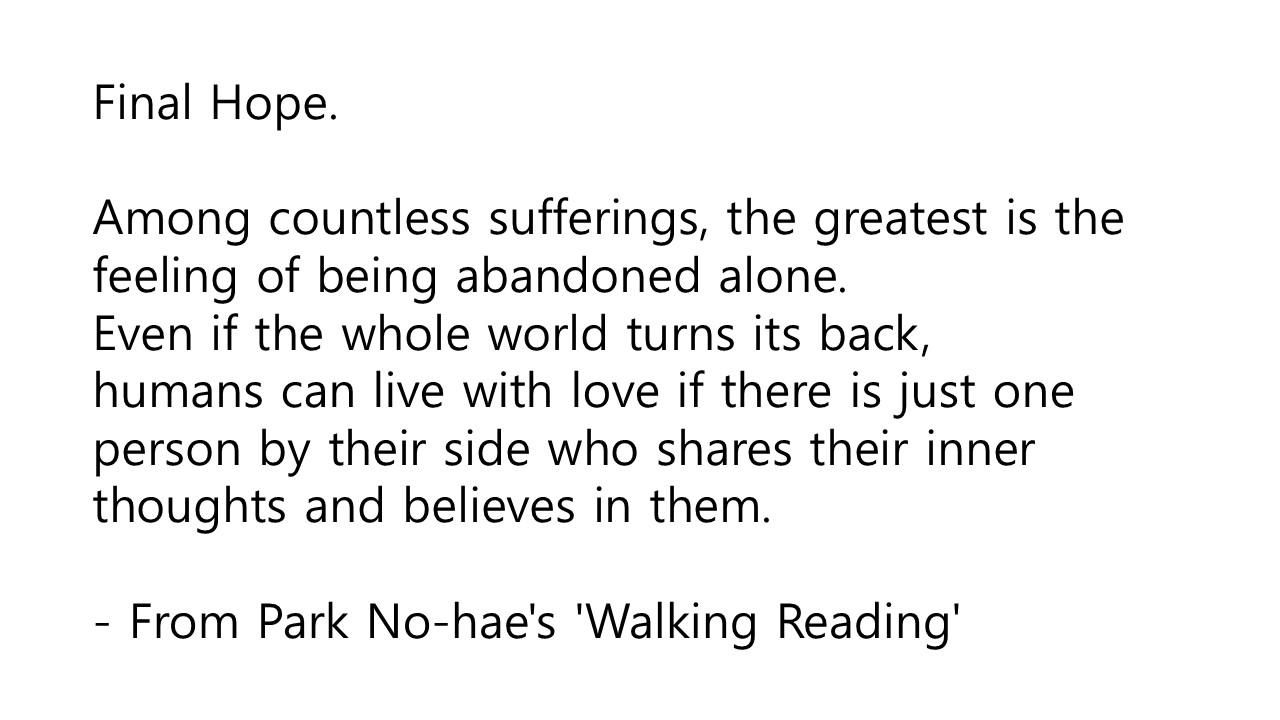







2024 이주노동자 생명 살리는 자살예방 국제포럼 프로그램
◈ 참석자 소개 및 인사말
14:00 ~ 14:10 인사말
김미선 상임이사 (한국이주민건강협회 위프렌즈)
서미화 의원 (더불어민주당, 국회 보건복지위원회)
14:10 ~ 14:25 축사 주한스리랑카대사관, 주한네팔대사관,
14:25 ~ 14:30 단체사진 촬영
◈ 발제 순서
1부 좌장 김현수 센터장 (서울시자살예방센터)
14:30 ~ 15:00 발제1
15:00 ~ 15:40 발제2
국내 이주노동자의 한국 사회 적응 과정 어려움과 자살 위기 썸낭 (캄보디아 노동자)
Ven Koslande Uditha Thero, 우연 스님 (마하보디사 이주민쉼터)
케이피 시토울라 대표 (재한네팔인공동체)
캄보디아인의 정신건강 특성
Plaktin OM MA, Director (EMDR Association Cambodia)
이주노동자 정신건강 실태 조사 결과 및 민간의 자살 예방 사업
15:40 ~ 16:05 발제3
이애란 사무처장 (한국이주민건강협회 위프렌즈)
16:05 16:15 질의응답
16:15 ~ 16:30 Break time
2부 좌장 김미선 상임이사 (한국이주민건강협회 위프렌즈)
16:30 ~ 16:55 발제4 한국 자살 예방 정책 현황 신은정 본부장 (한국생명존중희망재단)
지역사회 기반 주민으로서의 이주노동자 자살 예방 전략
16:55 ~ 17:20 발제5
안병은 센터장 (수원시자살예방센터)
17:20 ~ 18:00 종합토론 좌장 김미선 상임이사 (한국이주민건강협회 위프렌즈)
목 차
1부 발제1 국내 이주노동자의 한국
썸낭 (캄보디아 노동자)
Ven Koslande Uditha Thero, 우연 스님 (마하보디사 이주민쉼터) 케이피 시토울라 대표 (재한네팔인공동체) 발제2
Plaktin OM MA, Director (EMDR Association Cambodia)
[인사말]
안녕하세요 ‘2024 이주노동자 생명 살리는 자살 예방 국제포럼’에 참석하신 모든 분들
께 진심으로 감사드립니다
먼저 바쁜 국정감사 일정에도 이주노동자의 생명을 살리기 위한 포럼을 함께 주최하신 서
미화 의원님께 감사드립니다. 쁘스뻐 라즈 버떠라이 네팔 대리대사님을 비롯한 이주노동자
본국 대사관 관계자 여러분, 그리고 캄보디아에서 오신 플락틴 옴 소장님을 비롯한 발제자
분들, 또 이주노동자 자살문제를 직접 이야기해 줄 각국 공동체와 이주노동자를 대표한 세
분의 발표자, 그리고 각 기관과 단체에서 오신 모든 분들의 참여로 오늘의 포럼이 더욱 의
미 있게 진행되리라 확신합니다
우리 사회의 지속과 경제 발전에 이주노동자들의 역할은 점점 중요해지고 있습니다 그러 나 이주노동자들은 외로움과 고립, 언어와 문화의 차이, 제도적 차별로 인한 정신적 고통
속에 때로 절망적인 선택을 하는 상황에 이르고 있습니다 특별히 코로나 팬데믹을 거치며 의료 접근성 문제와 건강 불평등, 정신건강 악화 및 자살 등의 도전과제에 직면하여 위프 렌즈는 2020년부터 이주노동자들의 정신건강 증진과 자살 예방 사업을 적극 진행하고 있습 니다. 고용허가제 입국 이주노동자들의 자살 문제가 더 이상 개인의 문제가 아닌 제도적
문제와 사회적 차별로 인한 사회적 타살이라는 접근이 시급한 상황입니다.
이미 인구절벽, 지방소멸에 돌입한 한국사회에서 미래의 지속가능성은 이주민과의 조화로 운 공생에 달려있습니다. 따라서 오늘의 포럼이 이주노동자들의 생명을 지키기 위한 중요 한 다짐의 자리이자 출발점이 되기를 바랍니다 서로의 경험과 지식을 공유하며 실질적인 대책을 마련하고, 나아가 모든 이주노동자들이 희망을 가지고 살아갈 수 있는 사회를 함께
만들어야겠습니다
오늘 이 자리에 계신 모든 분들의 노력과 협력이 이주노동자들의 생명을 지키는 소중한 힘 이 될 것이라 확신하며, 여러분 모두의 적극적인 참여와 협력을 부탁드립니다. 다시 한번 참석하신 모든 분들께 감사드리며, 오늘의 논의가 풍성하고 의미 있는 결실을 맺기를 기원 합니다.
감사합니다
한국이주민건강협회 위프렌즈 상임이사 김미선
[인사말]
안녕하십니까 소리로 보는 시각장애인 더불어민주당 비례대표 국회의원 서미화입니다
‘2024 이주노동자 생명 살리는 자살 예방 국제포럼’의 뜻깊은 개회를 진심으로 축하합니 다. 그리고 함께 주최하시는 사단법인 한국이주민건강협회 위프렌즈와 지원으로 힘 보태어 주신 사회복지공동모금회와 현대자동차그룹에도 감사의 인사를 전합니다.
우리의 곁에 자리 잡은 체류 외국인이 250만 명을 넘어섰습니다. 이처럼 이주노동자는 우 리 지역사회와 국내 여러 산업현장에 필수인력으로 자리 잡았지만, 우리는 그간 빠르게 성 장하는 경제와 산업현장에서 가까이에 있는 그들을 놓쳐왔습니다 그 사이 이주노동자가
소리 없이 자살하는 사례들은 반복되었고, 이들을 지원하기 위한 인프라는 여전히 부족합 니다
이주노동자들이 이 사회에 자리 잡고자 분투할 때에 많은 차별과 어려움을 겪었을 것입니
다 더 이상 그들에게 발생하는 심리적 위기를 사각지대로 방치해선 안됩니다 이제는 실효 성 있는 이주노동자 자살 예방 전략을 찾아야 할 때입니다. 저는 오늘 포럼을 통해 이주노
동자 여러분들의 경험과 지원하시는 전문가들의 고견을 듣고, 구체적인 실태와 현 제도에 서 이주노동자가 배제되는 문제점을 함께 점검해 대안을 마련할 수 있도록 노력하겠습니 다. 오늘 이 자리에서 나오는 논의와 제언들이 우리 사회의 변화를 이끄는 강력한 원동력 이 되길 바랍니다
마지막으로 먼 타지에서 노동하시며 차별과 인권침해로 인해 돌아가신 모든 이주노동자분 들의 명복을 빕니다 이러한 비극이 다시는 반복되지 않도록, 오늘 이 자리에 계신 여러분
과 함께 국회에서 최선을 다할 것을 약속드립니다
감사합니다.
국회의원 서미화
[축사]


2024년 이주 노동자 생명 살리는 자살예방 국제포럼에 참가한
스리랑카 대사 사비트리 파나보케가 한국에 전하는 인사
2024년 10월 16일
우선 한국의 서미화 국회의원과 이애란 위프렌즈(WeFriends) 사무처장을 비롯해 ‘2024 이주노동자 생명 살리는 자살예방 국제포럼’주최팀에게 심심한 감사를 드립 니다. 이번 포럼은 매우 중요하고 시기적절한 행사라고 생각합니다.
현재 전 세계적으로 수혜국들의 경제에 중요한 기여를 하고 있는 이주 노동자 수는 수백만 명에 달할 것으로 추정됩니다. 그중 대다수는 매우 힘든 근로조건의 노동집약 적인 직장에서 일을 하고 있습니다 또한 가족과의 분리, 문화적 충격, 언어 장벽과 같 은 요인들로 인해 불안, 우울, 알코올 남용, 심지어 자살과 같은 정신적인 문제를 겪기 도 합니다
따라서 이주 노동자들이 필수 의료 서비스를 비롯해 자신의 행복과 정신건강을 증진
시킬 수 있는 상담과 같은 수단을 이용할 수 있도록 보장하는 것이 필요합니다
이러한 점에서 위프렌즈와 같은 기관들은 자살예방이라는 목표를 달성하는 데에 매우 의미 있는 역할을 합니다. 오늘 행사를 통해 많은 이주 노동자들이 서로의 경험을 공 유할 수 있는 기회를 제공하게 되어 기쁘며, 이와 같이 중요한 문제를 다루는 데에 있 어 매우 유용한 자리라는 점에 의심의 여지가 없습니다.
마지막으로, 이번 포럼을 준비해 주신 분들과, 이주 노동자들의 건강과 행복을 보장하
는 데에 지칠 줄 모르고 노력해 주시는 분들께 깊은 감사의 말씀을 전해 드립니다
[축사]
주한네팔대사관
1부
좌장│김현수 센터장 (서울시자살예방센터)
발제1│국내 이주노동자의 한국 사회 적응 과정 어려움과 자살 위기
- 썸낭 (캄보디아 노동자)
- Ven Koslande Uditha Thero, 우연 스님 (마하보디사 이주민쉼터)
- 케이피 시토울라 대표 (재한네팔인공동체)
발제2│캄보디아인의 정신건강 특성
- Plaktin OM MA, Director (EMDR Association Cambodia)
발제3│이주노동자 정신건강 실태 및 민간의 자살 예방 사업
- 이애란 사무처장 (한국이주민건강협회 위프렌즈)
│1부 발제 1
국내 이주노동자의
한국 사회 적응 과정 어려움과 자살 위기
썸낭 (캄보디아 노동자)
Ven Koslande Uditha Thero, 우연 스님 (마하보디사 이주민쉼터)
케이피 시토울라 대표 (재한네팔인공동체)
발제1│국내 이주노동자의 한국 사회 적응 과정 어려움과 자살 위기
썸낭 (캄보디아 노동자)
캄보디아 썸낭씨 이야기
인적사항: 1992년생, 남자, 2017년 6월 E-9 비자로 입국
가족사항: 부인, 자녀 1명, 2022년에 부인 입국하여 출산 후 가족과 동반거주
썸낭씨는 한국에 들어올 때 빚을 진 상태로 입국하여 매달 월급을 받아 본국으로 송금하여
가족 생활비와 빚을 갚고 나머지 돈으로 생활하였습니다 2022년 부인이 고용허가제로 입 국하여 따로 떨어져 지내며 생활하다 임신 후 근로를 중단하고 출산하였습니다 이로 인해 이전보다 더 많은 돈이 필요하였으나 임금체불이 계속되며 생계유지가 어려워지고 극심한
스트레스와 우울감에 불면증까지 생겼습니다
올해 초 임금체불로 안산에 있는 이주민지원단체인 지구인의정류장의 캄보디아 쉼터에 머
물며 사업장 변경을 신청하였고 부인과 아기는 따로 지냈습니다.
임금체불로 인한 경제적 압박과 가족부양의 책임감에 괴로워 자살 생각까지 하게 되었습니
다.
처음 쉼터 왔을 땐 사람들과 어울리지 못했고, 말도 없이 방에서 혼자 있고 걱정으로 잠을 못 잤습니다.
힘든 상황 속에서 그래도 부인과 이야기를 계속 나누며 지지를 받고, 쉼터에서 지내며 지 구인의정류장 활동가에게 임금체불 상담을 받고 체류자격 변경 신청도 하였습니다 쉼터에서 같이 지내는 캄보디아 사람들과 서로의 처지와 어려움을 나누고 공유하며 점차 심리적 안정을 찾았습니다
‘너무 힘들 땐 모든 게 막막하고 앞이 캄캄해서 죽음밖에 해결 방법이 없다는 생각도 자 꾸 들었으나 가족과 같이 문제를 이야기하고 힘든 마음을 이야기하고 나니 위로가 되었습 니다 . 한국에 와서 일하는 이주노동자들이 나와 같은 어려움을 겪고 있는 사람들이 있다면 혼자라고 생각하지 말고 같이 이야기 나누고 혼자 있지 마세요.’
발제1│국내 이주노동자의 한국 사회 적응 과정 어려움과 자살 위기
Ven Koslande Uditha Thero, 우연 스님 (마하보디사 이주민쉼터)
스리랑카 노동자 상황
안녕하십니까 저는 현재 동국대학교 박사과정에 있으며 양주시에 있는 스리랑카 등 동남 아 이주민 쉼터 '마하보디사'를 관리하고 있습니다 한국에서 2010년부터 종교인으로 살면 서 느낀 이주민의 상황은 매우 안타까웠습니다. 저는 2023년에 동국대학교 석사 과정을 마 치고 현재까지 약 2년 정도 ‘마하보디사’에서 활동을 본격적으로 해왔습니다 그전에는 오며 가며 이주민을 만났지만 직접 이주민 곁에서 활동하다 보니 이주민의 어려운 삶에 놀 랐습니다.
2042년이 되면 한국 인구 중 외국인 비중이 5%를 넘어설 것이라는 통계청의 전망이 나왔 습니다 국제사회 상 다문화사회로 들어가는 것입니다 그렇기에 다문화 정책에 더 힘을 쓰 고 자원을 투입해야 합니다. 물론 이주민에 대한 시선과 평가가 안 좋을 수 있습니다. 하지
만 이런 차별적인 상황을 뛰어넘어야 한국이 발전할 수 있다고 생각합니다
현재 스리랑카에서 온 이주노동자 자살 사례만 두 달에 1~2명씩 발생하고 있습니다 제 생 각에 스리랑카 이주노동자가 자살하는 이유는 의지할 곳이 없기 때문입니다 지난해 9월 고용노동부가 외국인노동자지원센터에 대한 예산을 전면 삭감하여 얼마 전 제가 아는 센터 들이 폐쇄했습니다. 전국적으로 있던 외국인노동자지원센터의 예산을 없애면서 이주노동자 들이 물어보거나 의지할 곳이 없어졌습니다. 그래서 제가 소속된 이주민 쉼터에 더 많은 이주노동자들이 찾아와 여러 가지를 물어봅니다. 한국어도 잘 못하는 이주노동자들이 와서 물어보면 모른다고 할 수 없으니 자녀 초등학교 입학 등 이런저런 내용을 다 상담받고 있 습니다 외국인노동자지원센터가 없어지니 난감했습니다
이주노동자들의 일상은 오전에 출근하고 오후 10시경 퇴근하고 취침하고 다시 다음날 일하 고의 반복입니다 스리랑카 같은 경우는 시차가 있다 보니 본국의 가족과 연락이 잘 안되 기도 합니다. 이러한 생활 속에서 이주노동자들은 스트레스를 받기 쉽습니다. 그나마 의지 할 수 있는 곳은 종교기관이지만 이마저도 다닐 수 있는 시간적 여유가 없는 이들도 많습 니다.
작년에만 해도 폐소공포증 등 정신질환으로 이주노동자 10~15명과 함께 병원에 가서 치료 받았습니다. 스리랑카 사람들은 아직 정신질환에 대한 인식이 좋지 않습니다. 그래서 자신 의 질병을 인정하지 않거나, 병원에 가지 않기도 합니다 그런 상태가 방치되면 자해, 자살 로 이어지는 것입니다.
발제1│국내 이주노동자의 한국 사회 적응 과정 어려움과 자살 위기
우리 쉼터에서 연 2~3회 의료봉사를 하고 있고, 양주시에서도 무료 진료소를 지원해 주고 있습니다. 이러한 이주노동자들을 위해 정신건강 지원 정책을 더 확장해 주었으면 합니다.
그리고 이주민과 선주민이 어울릴 수 있는 행사를 만들어주길 바랍니다. 노동하려면 육체 만 아니라 정신, 심리도 건강해야 합니다
이번 포럼에 참여해 주신 분들이 이주민 관련 다양한 활동을 이어주고 있고, 이런 좋은 자
리를 만들어주셔서 감사합니다 앞으로도 이런 포럼이 지속되어 한국이 건강한 다문화사회
가 될 수 있도록 우리 모두 노력합시다
발제1│국내 이주노동자의 한국 사회 적응 과정 어려움과 자살 위기
케이피 시토울라 대표 (재한네팔인공동체)
『네팔 이주노동자의 한국사회 적응 과정의 심리적 어려움과 자살 위기』
한국 내 네팔 이주민 수는 2024년 8월 말 현재 약 7만 5천 명으로 집계되고 있습니다 (주 한 네팔대사관 제공) 이들은 유학생, 전문 인력 파견, 이주노동자들로 구성돼 있으며 대부
분의 이주민들이 공장이나 산업체에서 일하는 노동자로 확인되고 있습니다. 이들은 직장 내 고용 관계에 있어 사람들과의 관계의 어려움, 언어 부적응, 언어 및 신체적 폭력에 노출
되어 있고, 네팔과 다른 환경적 어려움뿐만 아니라 한국으로 들어오면서 사용한 금전적인 어려움을 겪으며, 가족과 떨어져 오랜 기간의 외로움을 견디며 생활하고 있어 우울증과 자 포자기하는 심정으로 극한 상황에 내몰리고 있는 것이 현실입니다. 이런 스트레스는 결국 자살이라는 극한 상황으로 내몰고 있으며 2008년부터 현재까지 주한 네팔대사관의 집계에 의하면 전체 사망자 259명 중에 자살로 인한 사망자는 70명으로 전체 사망자 중 사망원인 1위를 차지하고 있습니다.
이에 네팔 이주민들의 자살 위기에 대한 고찰을 통해 자국민들을 보호하고 보다 나은 양국 간의 관계 형성에 도움을 주고자 합니다
- 노동환경과 문제점
❏ 한국 내 네팔 노동자들의 사망자 현황을 살펴보면 2008년부터 현재까지 259명이 사망하 였고 이중 자살로 인한 사망자는 70명으로 전체 사망원인 중 1위를 차지하고 있습니다. 그 외 원인불명의 사망이 65명, 산업재해로 인한 사망 30명, 교통사고로 인한 사망 29명, 질병 으로 인한 사망이 23명, 갑작스러운 심장마비로 인한 사망 17명, 익사 4명, 기타 사망이 21 명으로 집계됩니다 이것은 한국으로 들어온 네팔 노동자의 자살이 얼마나 심각한 상황인
지를 알 수 있습니다
자료1 한국 내 네팔 노동자들의 사망 현황 (2008년~2024년)
사망 원인 자살 원인 불명 산업 재해 교통
(자료제공: 주한 네팔대사관)
발제1│국내 이주노동자의 한국 사회 적응 과정 어려움과 자살 위기
❏ 고용허가제로 입국한 네팔노동자들이 주로 호소하는 어려움은 문화적 차이에 따른 네팔 현실과 너무 다른 이질감과 네팔은 고용허가제의 시험 합격률이 매우 높은데 보통 합격자 들이 대학 졸업자나 석사 또는 박사학위의 소지자들이 주로 뽑혀 현지에서 노동의 경험이 없는 사람들이 대부분으로 한국에 들어오자마자 3D업종에서 긴 시간의 강도 높은 노동(농 업, 어업 등)을 견디지 못하는 상황이 제일 큰 원인입니다.
❏ 직장 내 문제로 회사 동료 간의 언어 소통의 문제로 인한 언어적, 신체적 폭력에 노출, 문화와 음식의 차이, 네팔과 다른 자연환경으로 인해 적응이 어려운 문제들(폭염, 추위)이 있습니다
❏ 가족과 떨어져 홀로 지내야 하는 외로움, 주변 동료나 사업주의 무관심 등 많은 원인으 로 인해 우울증과 자살 위험이 증가하는 원인으로 작용하고 있습니다.
❏ 한국으로 이주를 결정하고 입국한 노동자들 대부분이 결혼 유무에 상관없이 홀로 생활 하고 있으며, 본국 가족들도 이주한 노동자를 떠나보내고 경제적인 어려움을 겪거나 질병 에 노출되어도 적절하게 대처해 줄 가족의 부재와 돈을 벌기 위해 결혼 후 바로 헤어져야
하는 상황으로 인한 심리적 어려움 등으로 우울감을 갖고 있습니다
❏ 고용허가제로 들어오기 위해 짧게는 1년 길게는 4-5년간의 긴 시간 동안 준비하며 들어 간 비용이 막대한 빚이 되어 빨리 갚아야 하는 경제적인 부담으로 불안한 나날을 보내고 있습니다.
❏ 고용허가제로 들어왔다고 해도 근무지(제조업, 농업, 어업 등)에 따른 추가 수입의 여부 에 따라 수입의 많은 차이로 현지 가족이나 친척들에게 비교 대상이 되기도 합니다.
❏ 네팔 노동자들은 심리적 스트레스를 받았을 경우 대처방안에 대해서는 위와 같은 많은 어려움을 겪으며 발생하는 우울감이나 심각한 스트레스 상황에서 말수가 적어지고 대인 관 계를 더 기피 하게 되고, 현 상황을 이겨내기 위한 마땅한 해결 방안이 없이 방치되는 경
우가 대부분입니다 가장 흔하게는 마음을 나눌 수 있는 가까운 친구와 술자리를 갖거나 가벼운 오락 등을 즐기는 것이 다이며, 언어 소통의 어려움으로 지역사회의 도움을 받기
어려워 이웃과도 단절된 상태가 지속되는 것으로 파악되었습니다.
❏ 다른 나라 이주노동자보다 네팔 노동자들의 자살 사례가 많은 이유는 한국에 오기 전
상상 속에서 느낀 한국(K-POP, 한국 드라마 등)과 노동환경의 현실 속에서 체감한 너무나
도 다른 근무 현장에 큰 충격을 받게 됩니다.
발제1│국내 이주노동자의 한국 사회 적응 과정 어려움과 자살 위기
❏ 최근 자살 위기 또는 사망 사례에 대해 말씀드리겠습니다.
첫 번째 사례는 4년 10개월 간 한 근무지에서 근무를 마치고 성실 근로자로 다시 입국하여 재고용 될 수 있는 상황에서 회사 사정으로 재고용이 어려워지자 자살하였습니다.
두 번째 사례는 가벼운 성병으로 진료를 받던 중 본인은 심각한 성병으로 오해하여 자살하
였습니다
마지막으로 다니던 직장을 잃게 되면서 3개월 내 다른 곳으로 재고용이 되어야 함에도 재 고용이 안 되는 상황에 가족의 경제적인 압박으로 자살한 사례가 있습니다
이어서 사망 후 지원 과정에 어려움은 무엇인지 말씀드리겠습니다.
자살의 경우 보험처리가 안 되며 본국으로의 시신 이송 비용과 장례 절차의 경제적 비용 부담, 사망 원인에 따른 법적 다툼의 어려움 및 해결 하기까지의 긴 시간 소요 등으로 어 려움을 겪고 있습니다.
❏ 네팔 노동자를 포함하여 이주노동자 정신건강 및 자살 예방을 위해 무엇이 필요한지 정 책적 접근과 민간 지원에 대해 몇 가지 제언하겠습니다
1 처음 한국으로 입국 후 초기 1년 이내에 자살자가 급증한 점에 비추어 입국 직후 초기 적응을 위한 사업주 또는 관리자들의 교육프로그램이 절실합니다.
2. 사업장 단계별(월단위 또는 필요에 따라) 정기 점검, 상담 또는 모니터링이 필요합니다.
3. 정신적, 심리적 문제 발생 후 긴급하게 케어 할 수 있는 공간 및 담당 기관이 없어 정신 과적 위기 개입 방안이 마련되어야 하며, 이주민 우울증, 자살 관련하여 다국어 심리상담과 쉼터가 필요합니다
지금까지 네팔 노동자의 노동환경과 그로 인해 발생하는 많은 문제로 자살이 증가하고 있 는 현시점에서 우리는 양국 간 전문가들이 서로 머리를 맞대고 문제 해결의 실마리를 찾아 이 상황을 극복해야 합니다
한국은 이미 출산율 감소와 고령화로 인해 인구 소멸에 직면해 있는바, 네팔뿐만 아니라 외국인 이주노동자들의 개선 정책을 하루빨리 확립해 주시길 바랍니다.
이것으로 제 발제를 마무리하며 이주노동자의 생명을 살리기 위한 자살 예방에 대해 이 포 럼에서 많은 논의가 이루어지길 바라며, 앞으로 타국에 있는 이주노동자들의 자살률이 감 소하길 바랍니다.
Plaktin OM MA, Director (EMDR Association Cambodia)





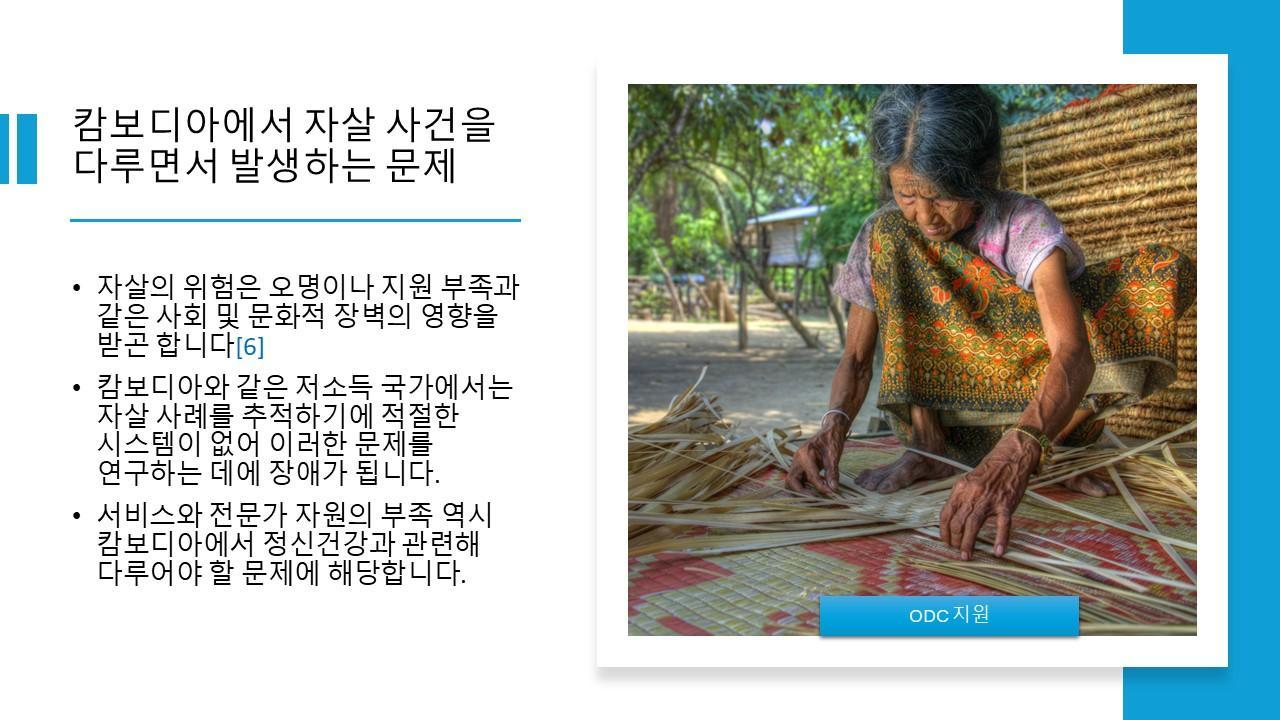
















│1부 발제 3
이주노동자 정신건강 실태 및
민간 자살 예방 사업
이애란 사무처장 (한국이주민건강협회 위프렌즈)








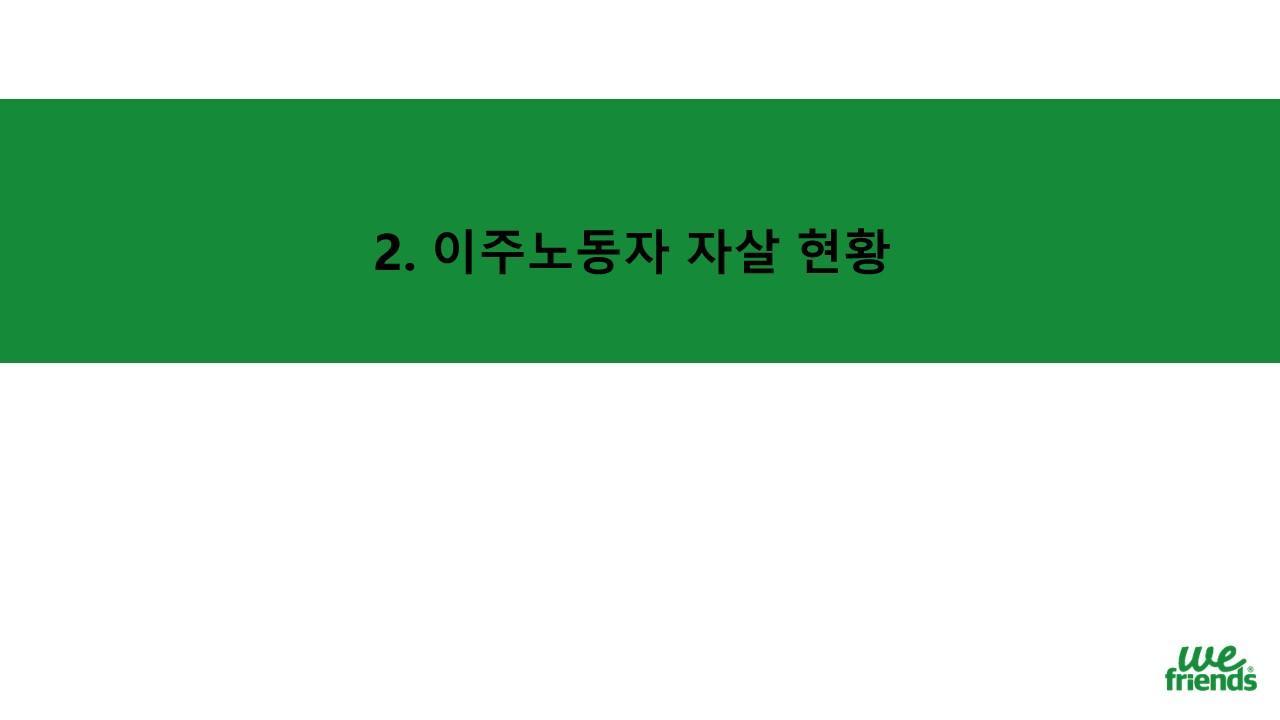
































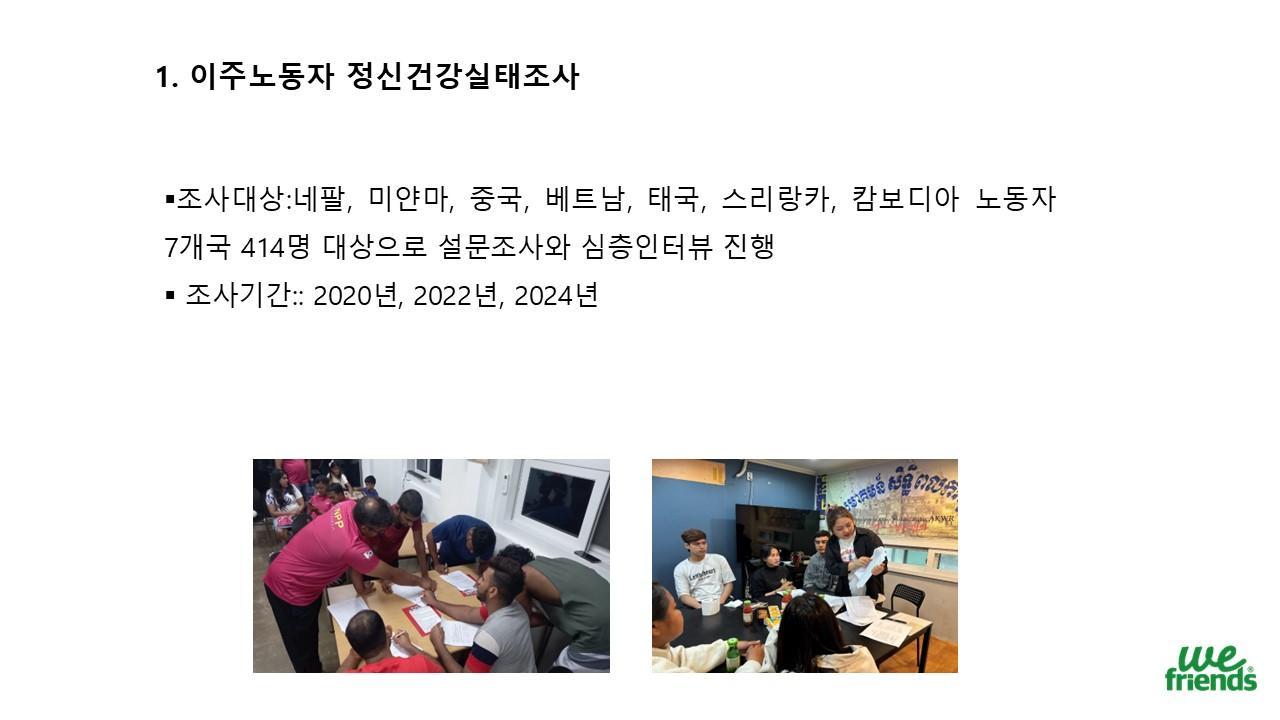



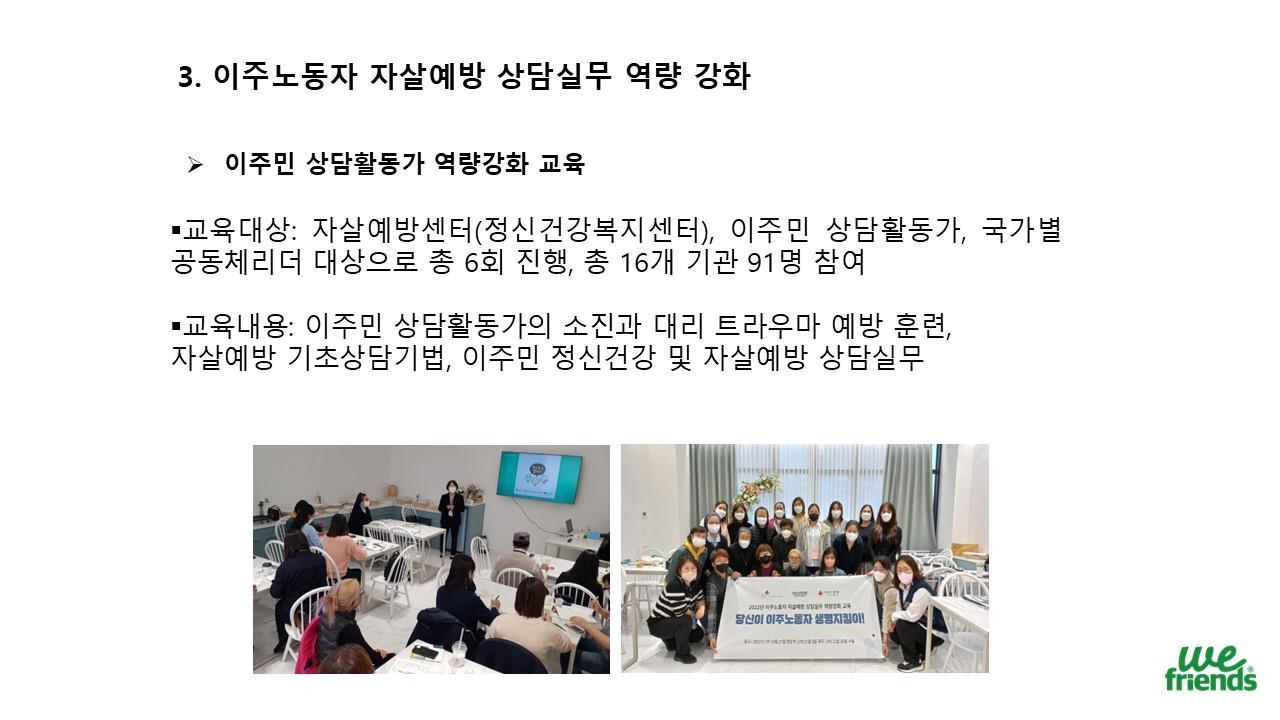








좌장│김미선 상임이사 (한국이주민건강협회 위프렌즈)
발제4│한국 자살 예방 정책 현황 - 신은정 본부장 (한국생명존중희망재단)
발제5│지역사회 기반 주민으로서의 이주노동자 자살 예방 전략 - 안병은 센터장 (수원시자살예방센터)
신은정 본부장 (한국생명존중희망재단)















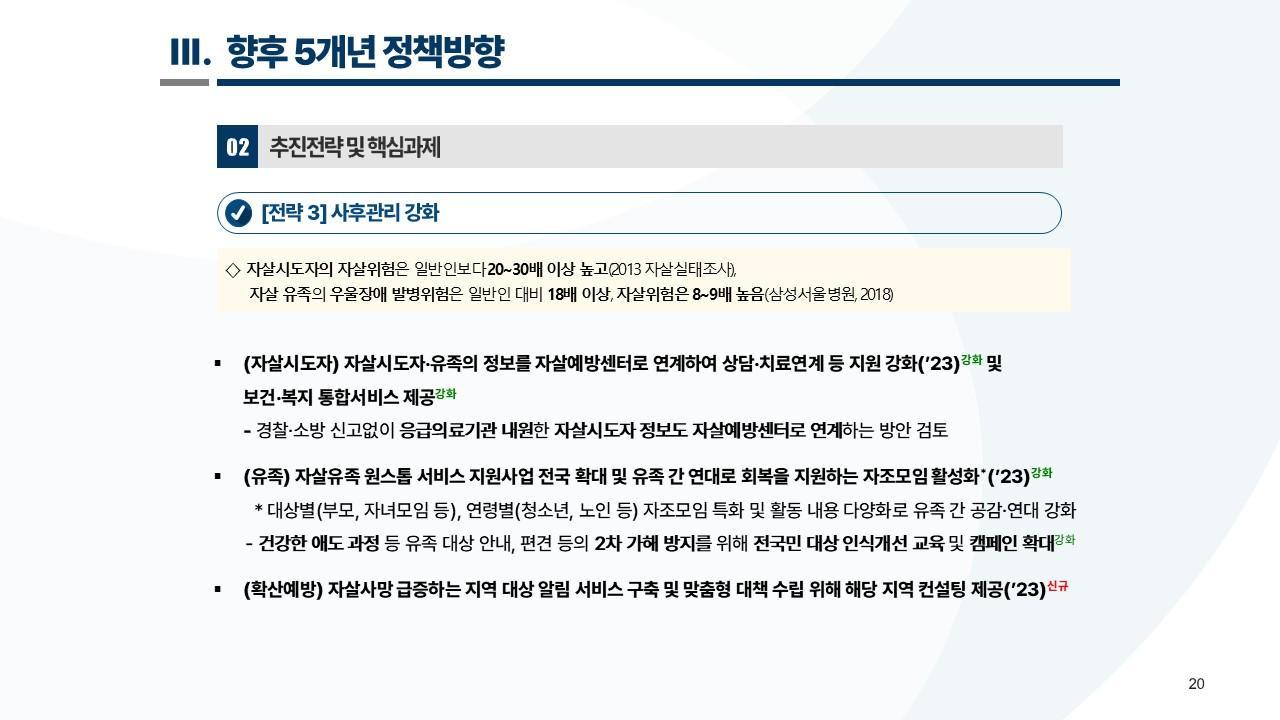











│2부 발제 5
지역사회 기반 주민으로서의
이주노동자 자살 예방 전략
안병은 센터장 (수원시자살예방센터)












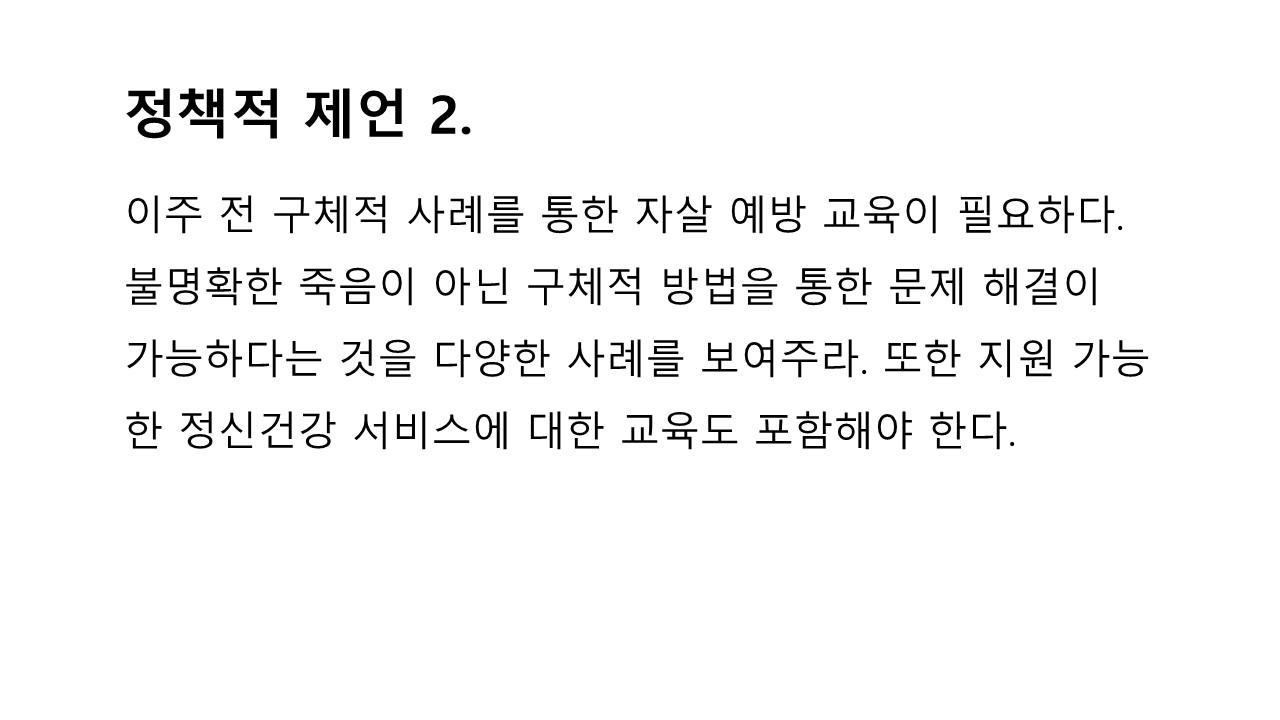




│종합토론








Program for 2024 Forum on Suicide Prevention for Saving Migrant Workers’ Lives
◈ Introductions and greetings
14:00 ~ 14:10 Welcome remarks
Misun Kim, Executive Director (Migrant Health Association in Korea WeFriends)
Mihwa Seo, National Assembly Member (Democratic Party of Korea, Health and Welfare Committee of the National Assembly)
14:10 14:25 Congratulatory remarks Embassies of Sri Lanka and Nepal
14:25 ~ 14:30 Group Photo Session
◈ Program
Session 1.
14:30 ~ 15:00 Presentation 1
15:00 ~ 15:40 Presentation 2
15:40 ~ 16:05 Presentation 3
Moderator Hyun-Soo Kim, M D Psychiatrist, Director (Seoul Suicide Prevention Center)
Difficulties in adjusting to Korean society and suicide risk among migrant workers in Korea
Somnang (Cambodian Worker)
Ven Koslande Uditha Thero (Mahabodhi Temple)
KP Sithoula (Korean Nepali Community)
Mental Health Characteristics of Cambodians (Sequential Interpretation)
Plaktin OM MA, Director (EMDR Association Cambodia)
Migrant Worker’s Mental Health Survey Outcome and Migrant Support Organization’s Suicide Prevention Projects
Aeran Lee, Secretary General (Migrant Health Association in Korea WeFriends)
16:05 ~ 16:15 Q&A
16:15 ~ 16:30 Break time
Session 2
16:30 16:55 Presentation 4
16:55 ~ 17:20 Presentation 5
17:20 ~ 18:00 General Discussion
Moderator Misun Kim, Executive Director (Migrant Health Association in Korea WeFriends)
Current Status of Suicide Prevention Policy in Korea
Eun-jung Shin, Director (Korea Foundation for Suicide Prevention)
Strategies to Prevent Migrant Worker’s Suicide as a Community-Based Resident
Byeong-eun Ahn, Director (Suwon Suicide Prevention Center)
Moderator Misun Kim, Executive Director (Migrant Health Association in Korea WeFriends)
1.
1│
Difficulties in adjusting to Korean society and suicide risk among migrant workers in Korea
- Somnang (Cambodian Worker)
- Ven Koslande Uditha Thero (Mahabodhi Temple)
- K.P Sithoula (Korean Nepali Community) Presentation 2│Mental Health Characteristics of Cambodians
- Plaktin OM MA, Director (EMDR Association Cambodia)
Presentation 3│Migrant Worker’s Mental Health Survey Outcome and Migrant Support
- Aeran Lee,Secretary General (Migrant Health Association in Korea WeFriends)
Session 2. Presentation 4│Current Status of Suicide Prevention Policy in Korea
- Eun-jung Shin, Director (Korea Foundation for Suicide Prevention)
Presentation 5│
- Byeong-eun Ahn, Director (Suwon Suicide Prevention Center)
[Welcome remarks]
Greetings. I sincerely thank everyone attending the "2024 International Forum on Suicide Prevention for Saving Migrant Workers’Lives "
First, I extend my gratitude to Congresswoman Seo Mi-hwa for co-hosting this forum to save migrant workers' lives despite her busy schedule with the parliamentary audit. I am confident that today's forum will be even more meaningful with the participation of embassy officials from migrant workers' home countries, including Mr Pushpa Raj Bhattarai, Deputy Ambassador of Nepal, presenters including Mr. Plaktin Om from Cambodia, three representatives from each national communities and migrant workers who will directly address the issues of migrant worker suicide, and all attendees from various institutions and organizations
Migrant workers' role in our society's sustainability and economic development is increasingly important However, migrant workers sometimes reach a point of making desperate choices due to loneliness, isolation, language and cultural differences, and mental suffering caused by institutional discrimination Mainly, as we faced challenges such as healthcare accessibility issues, health inequalities, mental health deterioration, and suicide during the COVID-19 pandemic, wefriends has been actively conducting projects to promote mental health and prevent suicide among migrant workers since 2020. It is urgent to approach the suicide issue of migrant workers entering through the Employment Permit System not as an individual problem but as a social homicide caused by institutional issues and social discrimination.
In Korean society, which has already entered a population cliff and rural extinction, future sustainability depends on harmonious coexistence with migrants Therefore, I hope today's forum will be an important place of commitment and a starting point for protecting migrant workers' lives. We must share our experiences and knowledge, develop practical measures, and create a society where all migrant workers can live with hope.
I am confident that everyone ' s efforts and cooperation today will become a valuable force in protecting migrant workers' lives, and I ask for your active participation and cooperation Once again, I thank all attendees and hope that today's discussions will yield fruitful and meaningful results.
Thank you.
Misun Kim, Executive Director (Migrant Health Association in Korea WeFriends)
[Welcome remarks]
Greetings I am Mihwa Seo, a proportional representative National Assembly member of the Democratic Party of Korea who sees through sound as a visually impaired person.
I sincerely congratulate you on the meaningful opening of the ‘2024 International Forum on Suicide Prevention for Saving Migrant Workers' Lives’. I also extend my gratitude to the co-host, wefriends, the Migrant Health Association in Korea, the Community Chest of Korea, and Hyundai Motor Group for their support.
The number of foreign residents in our midst has surpassed 2 5 million While migrant workers have become essential personnel in our local communities and various domestic industries, we have overlooked those close to us in our rapidly growing economy and industrial sites. Meanwhile, cases of migrant workers silently taking their own lives have recurred, and the infrastructure to support them remains insufficient
Migrant workers must have faced much discrimination and hardship as they struggled to establish themselves in this society. We can no longer leave the psychological crises they experience in blind spots. It is time to find effective suicide prevention strategies for migrant workers Through today's forum, I will listen to the experiences of migrant workers and the expert opinions of those who support them I will strive to examine the specific realities and issues of migrant worker exclusion in the current system to develop alternatives I hope the discussions and suggestions from this forum will become a powerful driving force for change in our society
Lastly, I pray for the repose of all migrant workers who have passed away due to discrimination and human rights violations while working in foreign lands. I promise to do my best in the National Assembly, along with all of you here today, to ensure such tragedies never recur
Thank you
[Congratulatory remarks]


Greetings of H.E. Mrs. Savitri Panabokke Ambassador of Sri Lanka to the Republic of Korea at the 2024 International Forum on Suicide Prevention for Saving Migrant Workers’ Lives, 16th October 2024
I wish to express my warm congratulations to Ms Seo Mihwa, member of the National Assembly, Ms Aeran Lee, Secretary General of the WeFriends and their teams for organizing the 2024 International Forum on Migrant Workers Suicide Prevention for Saving Migrant Workers’ Lives. This is indeed a very timely and important event.
It is estimated that globally, there are millions of migrant workers who make an important contribution to the economy of receiving countries. Many of them work in labour intensive jobs, amidst strenuous working conditions In addition, factors such as separation from their families, culture shock and linguistic difficulties can lead to them experiencing mental issues such as anxiety, depression, alcohol abuse and even suicide
It is therefore vital to ensure that migrant workers have adequate access to essential medical services and other means of support such as counselling, which can promote their well-being and mental health. In this regard, the work of organizations such as WeFriends play a very significant role towards achieving this goal of suicide prevention. I am happy to note that today’s event provides an opportunity for migrant workers themselves to share their experiences, which will no doubt, be invaluable towards efforts to address this important issue.
In conclusion, I wish to extend my deep appreciation towards the organizers of this Forum and for their tireless efforts to ensure the health and well-being of migrant workers I wish you all a successful event
[Congratulatory remarks]
Embassies of Nepal

